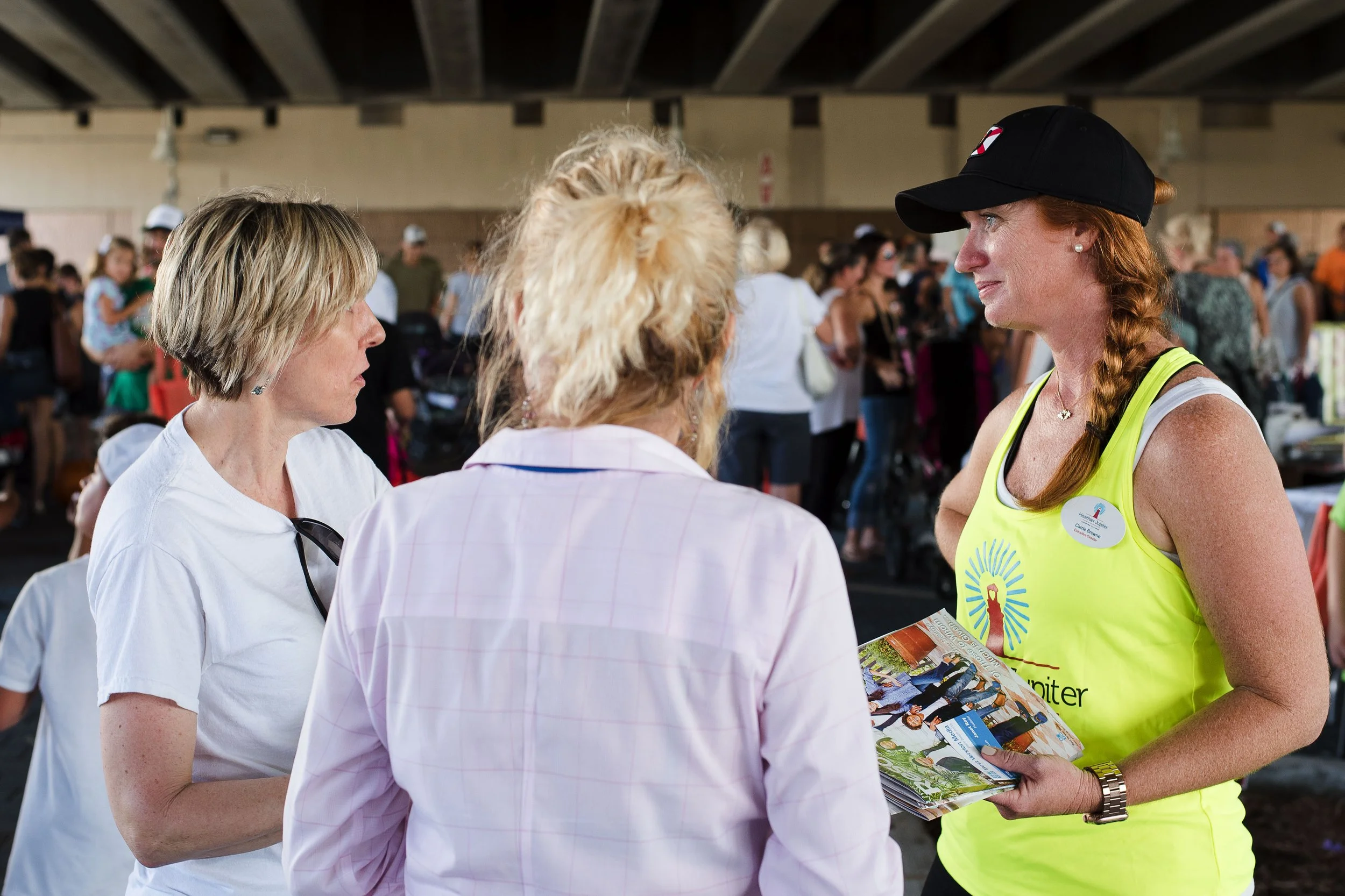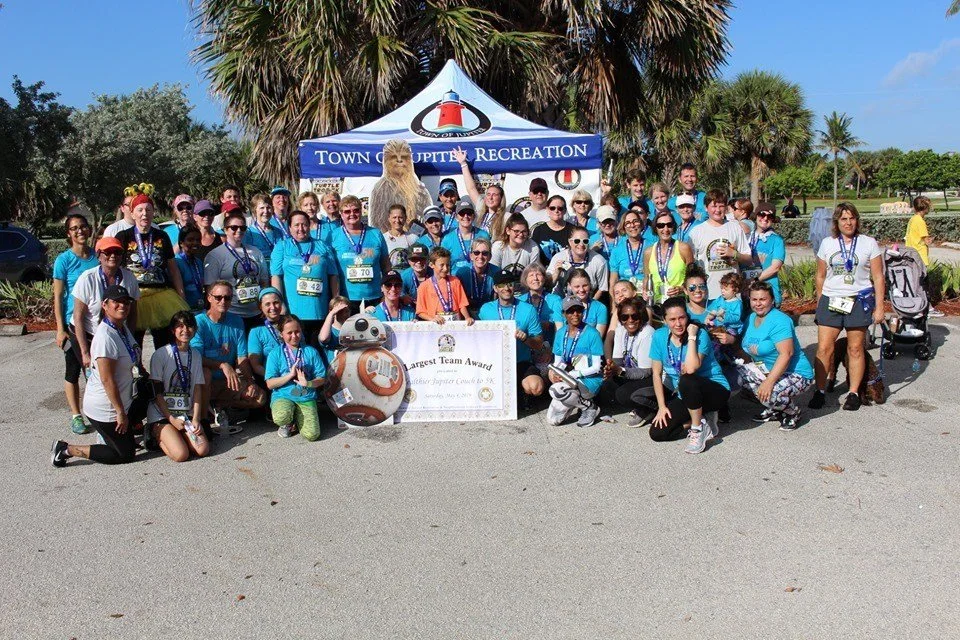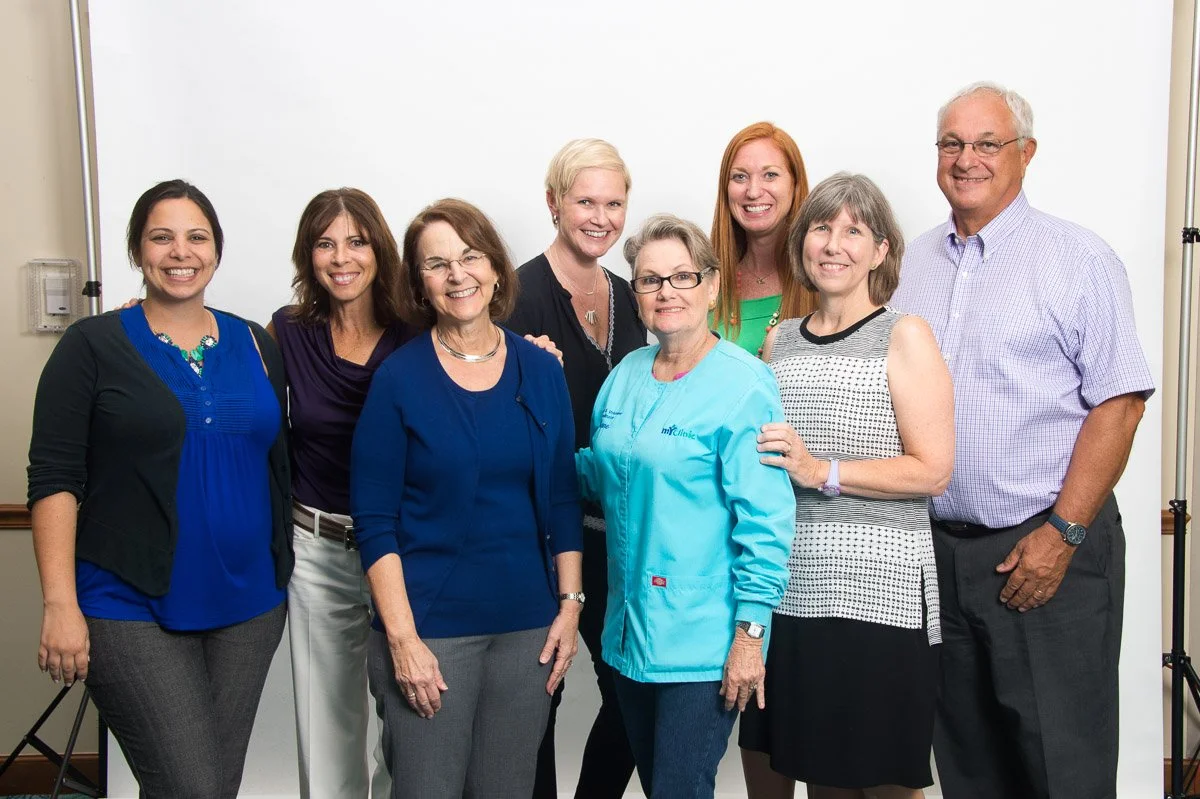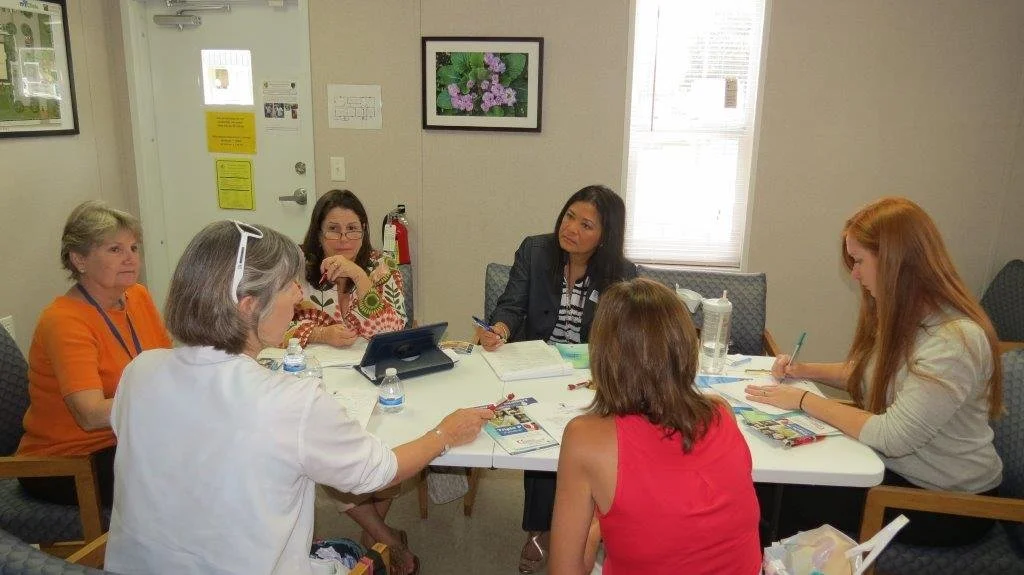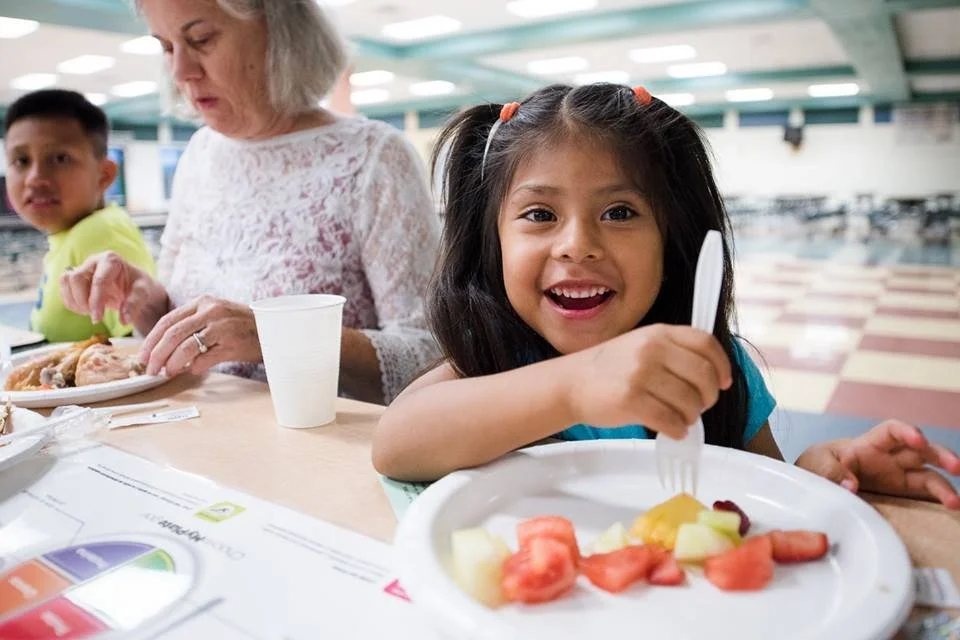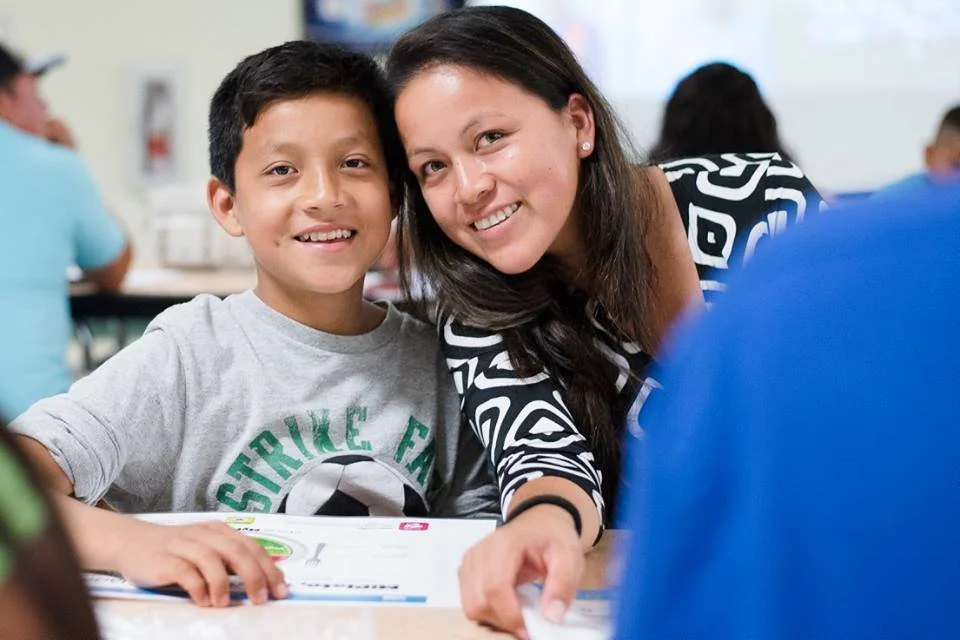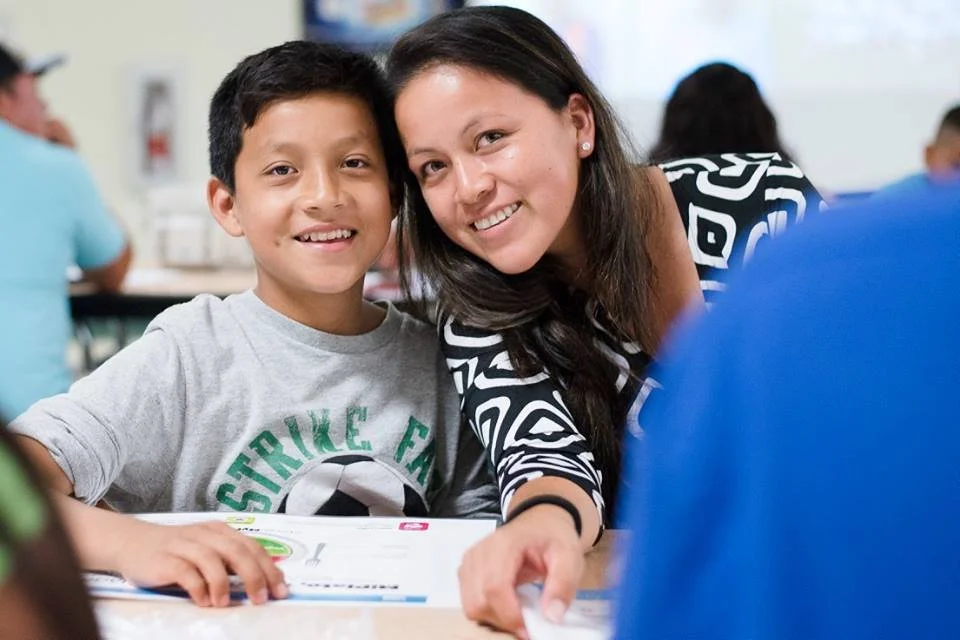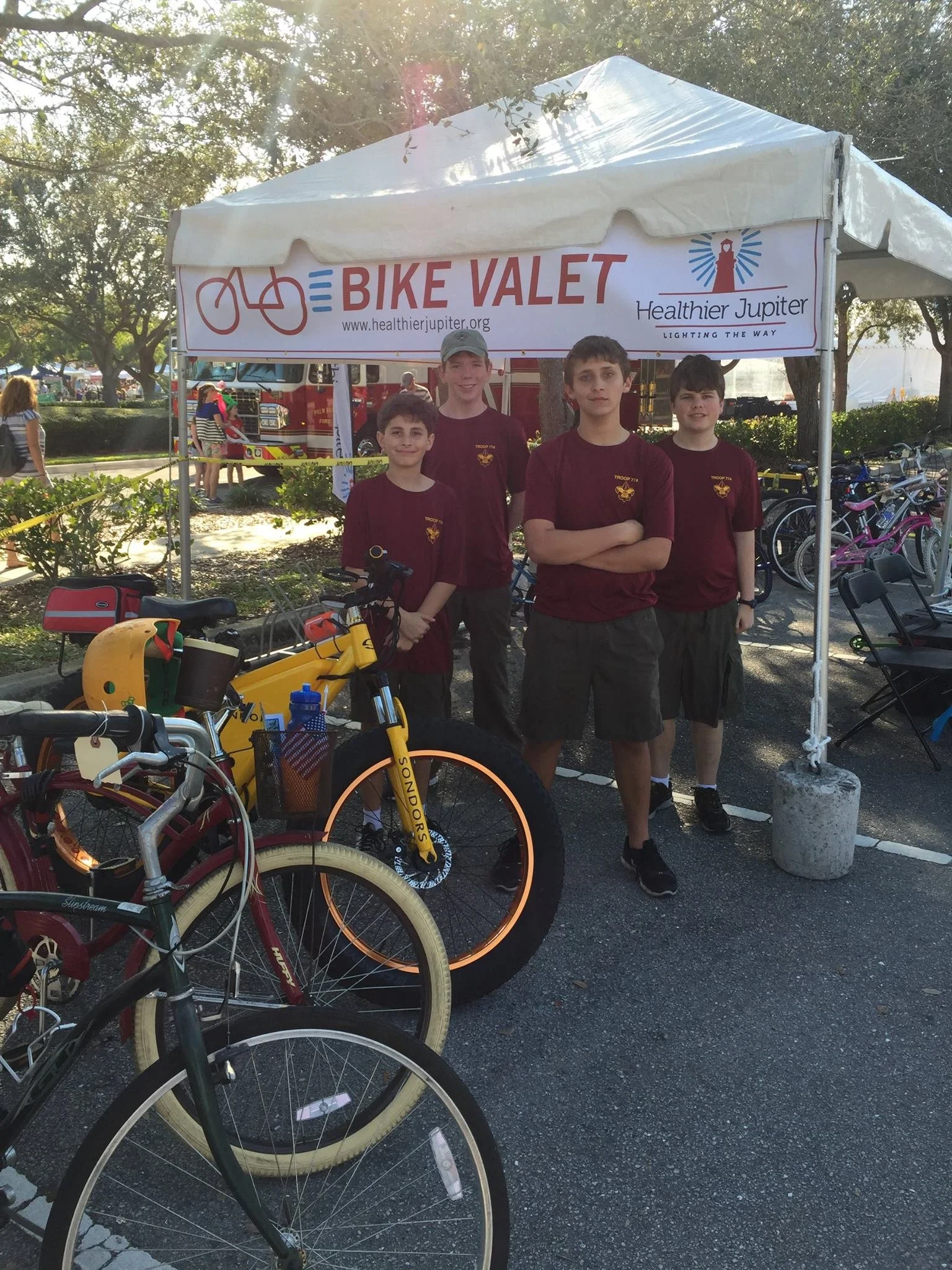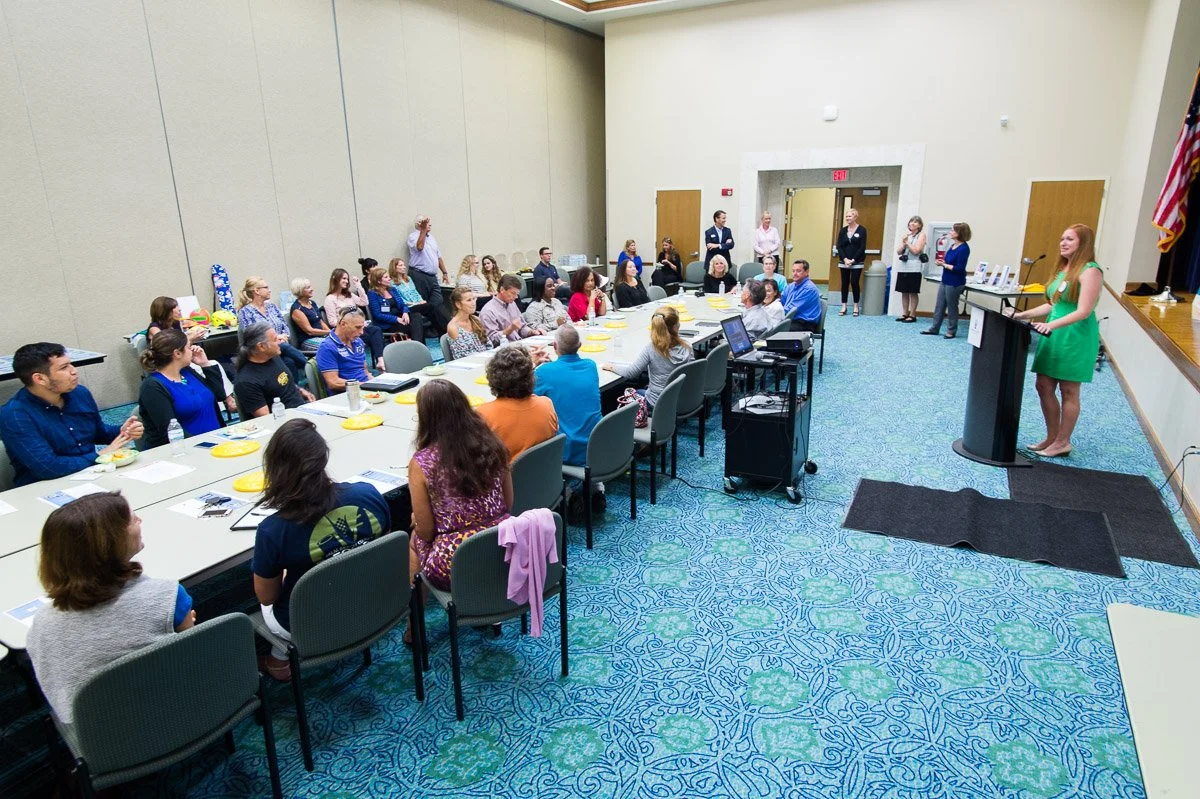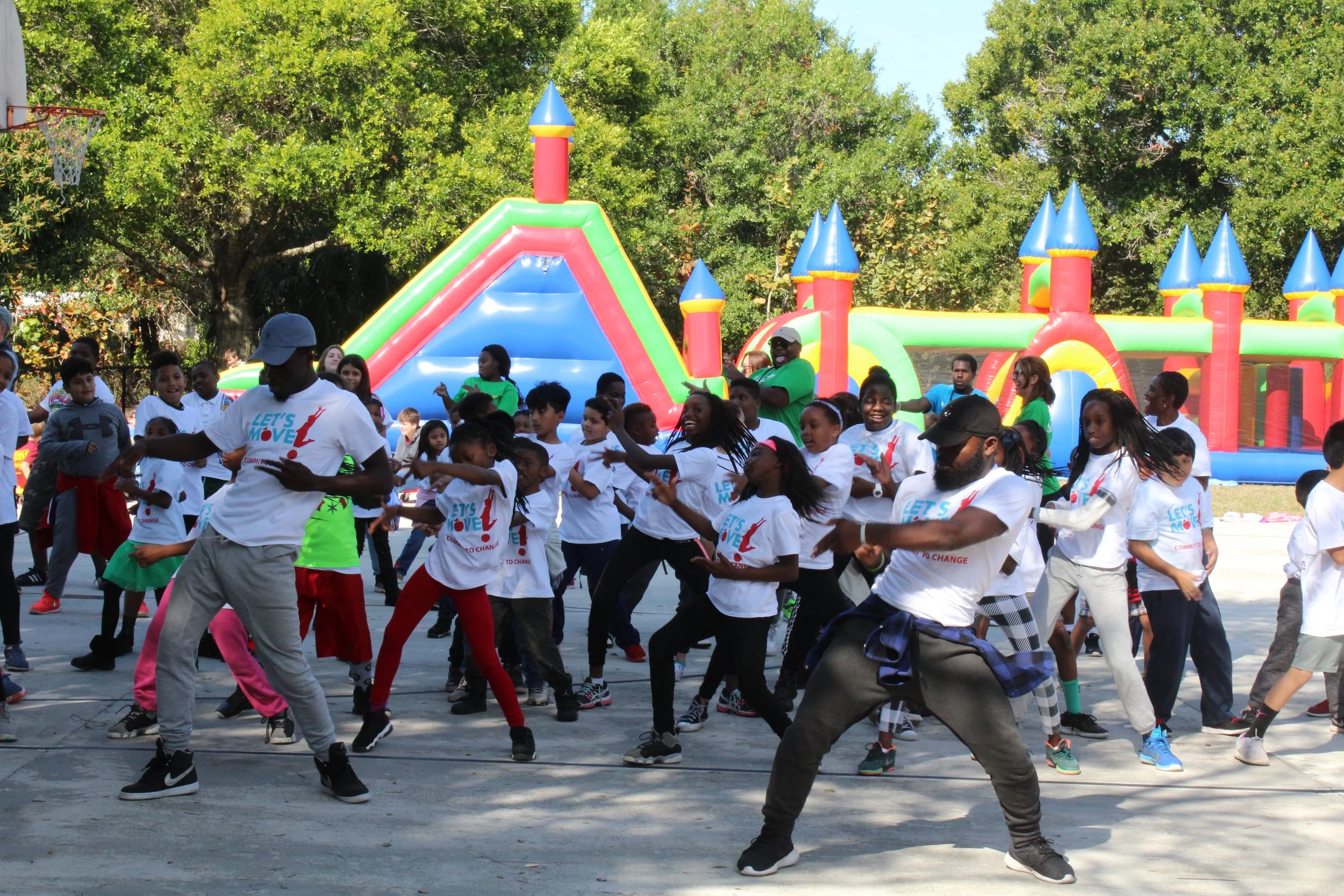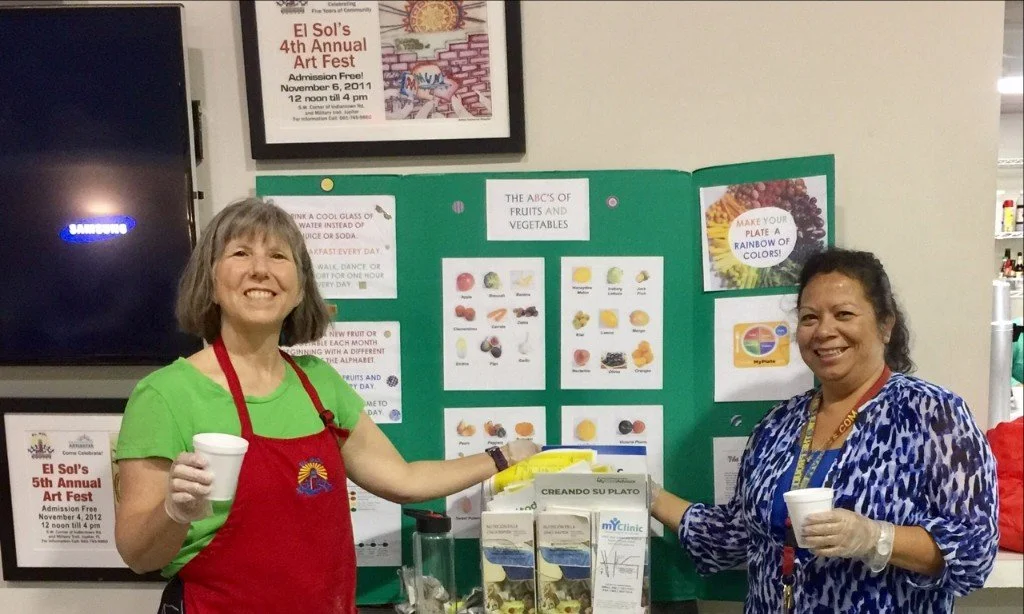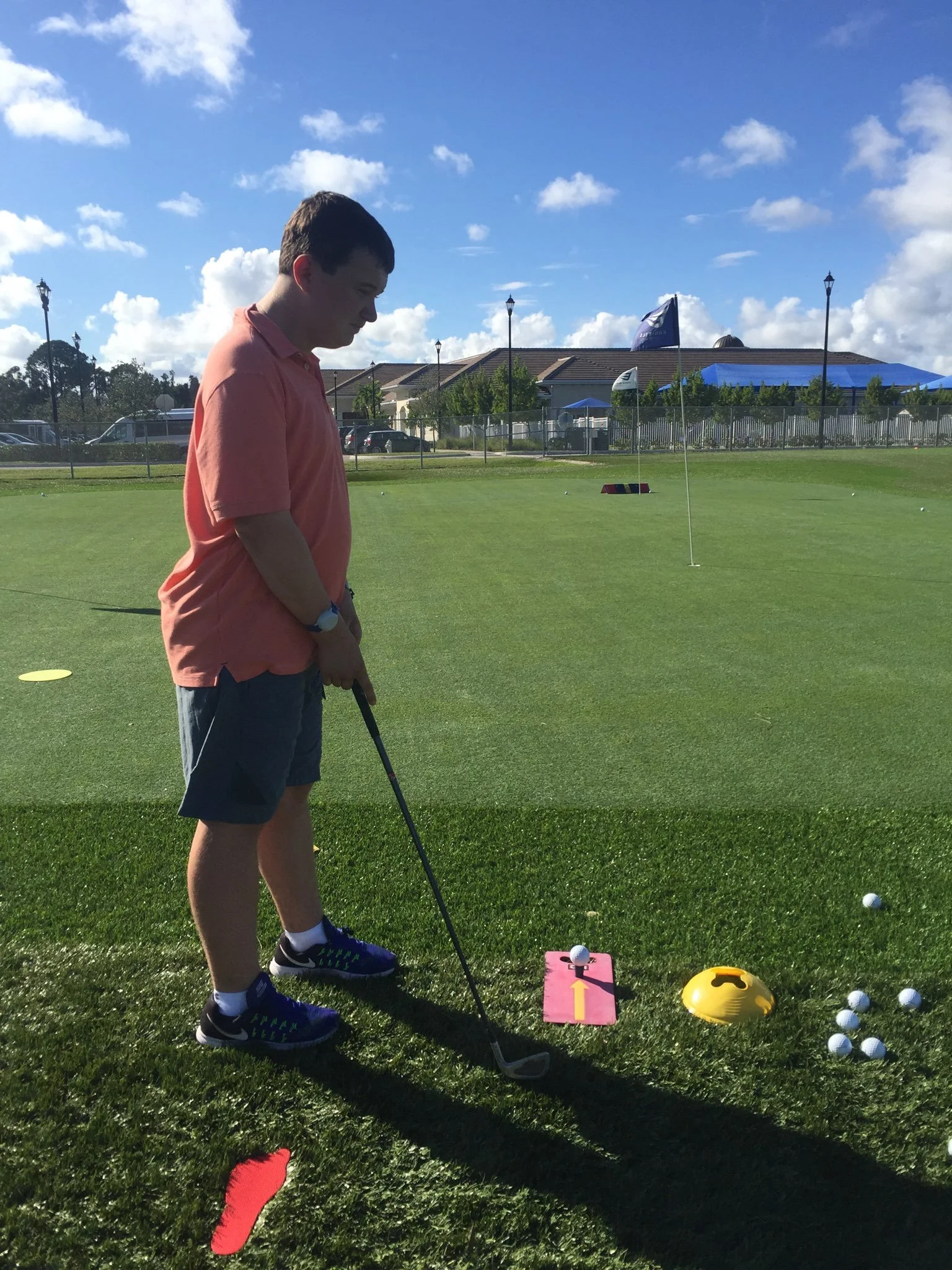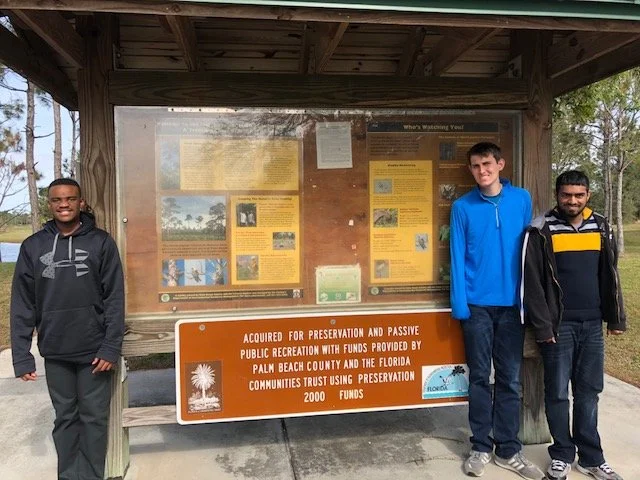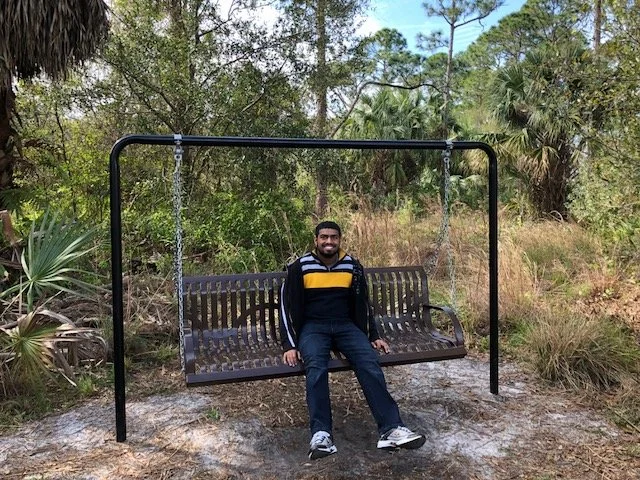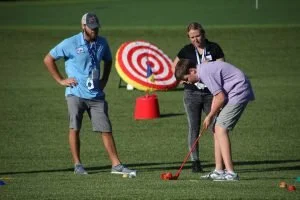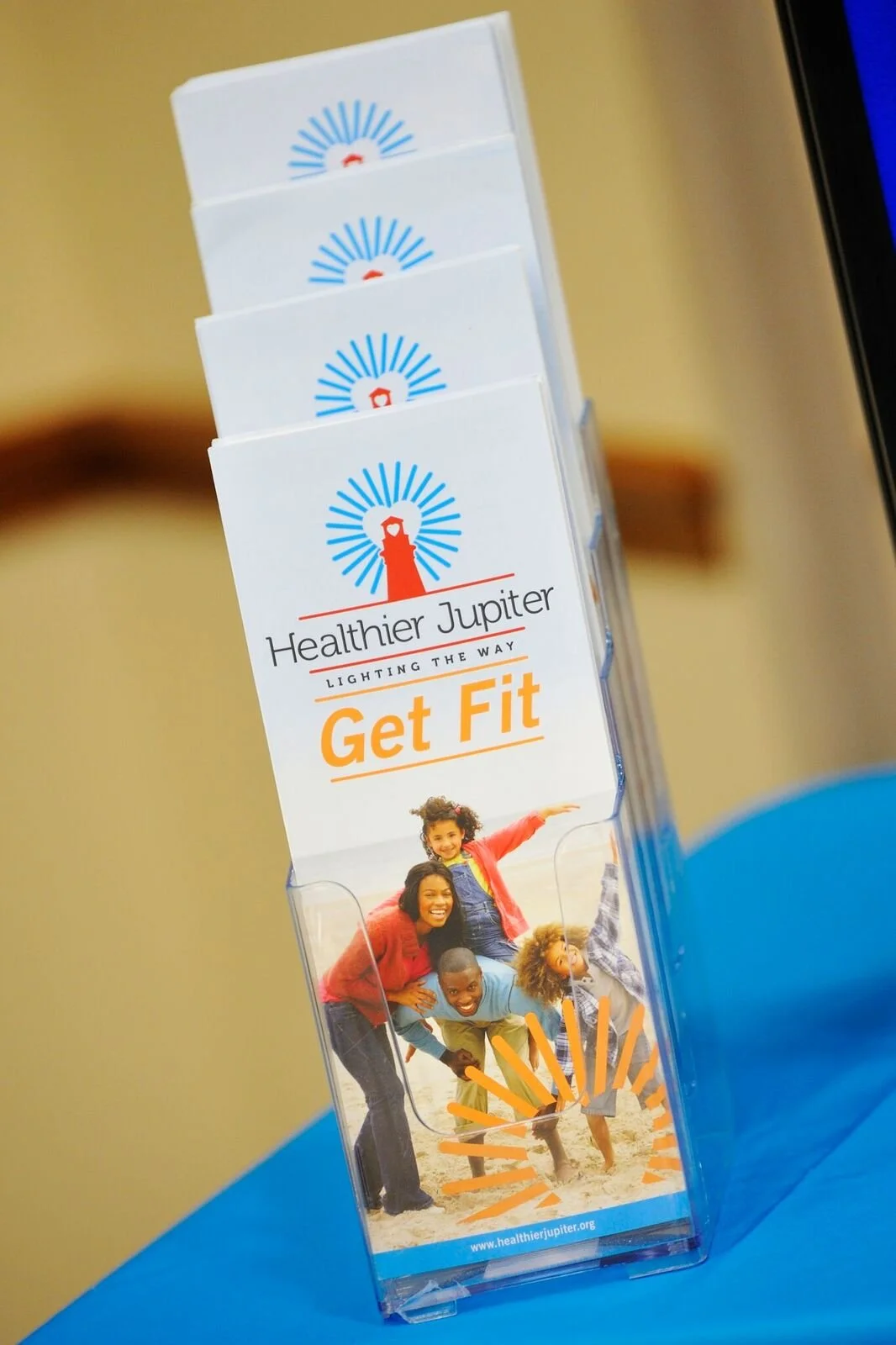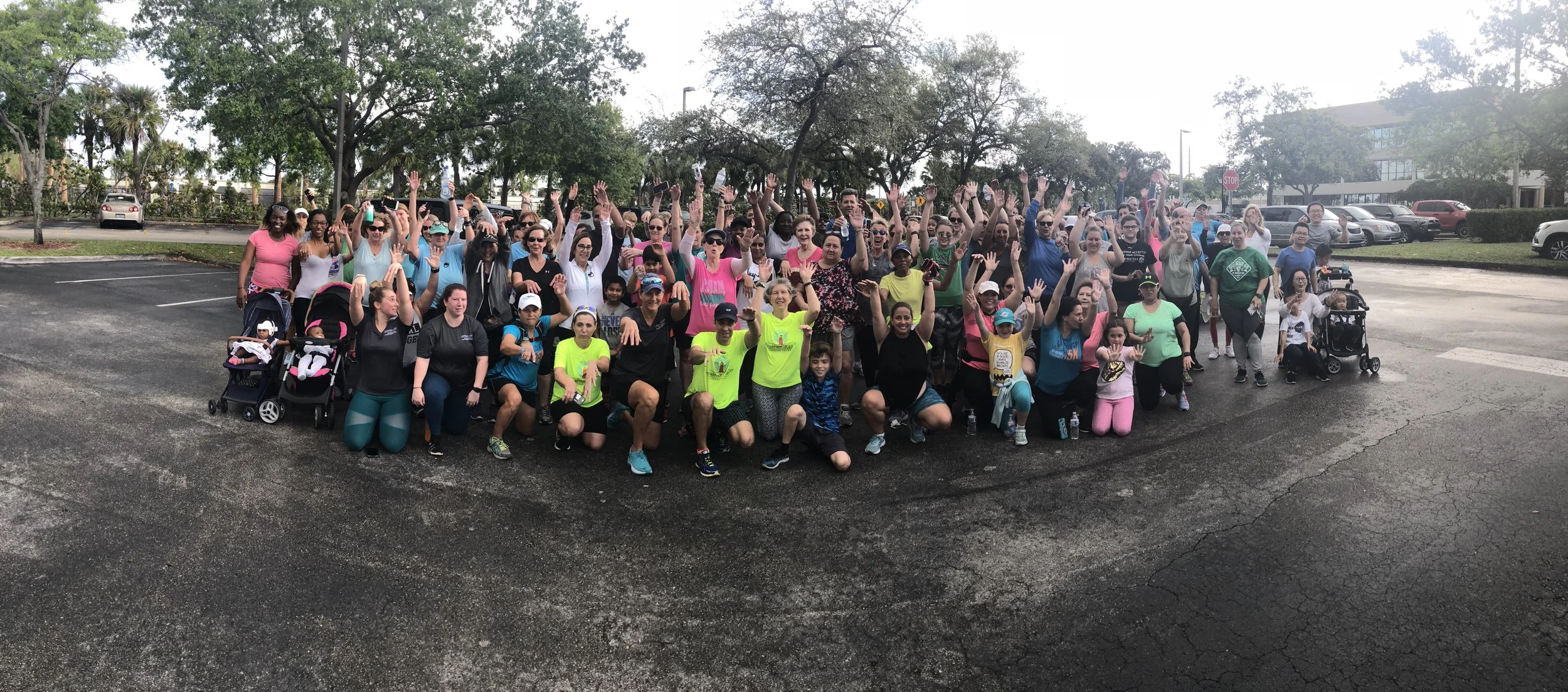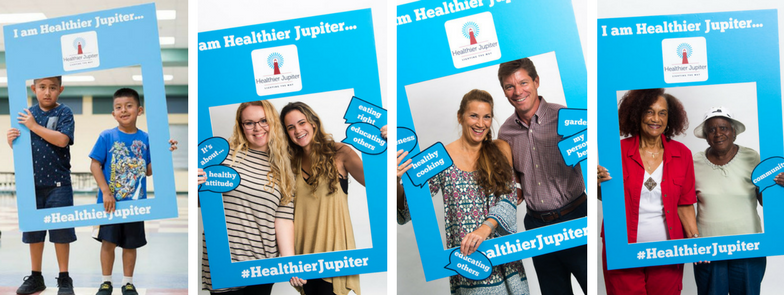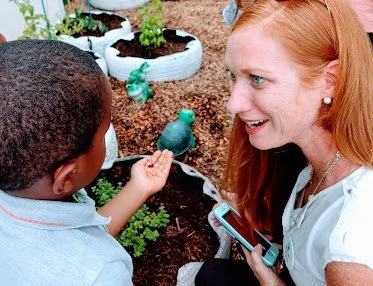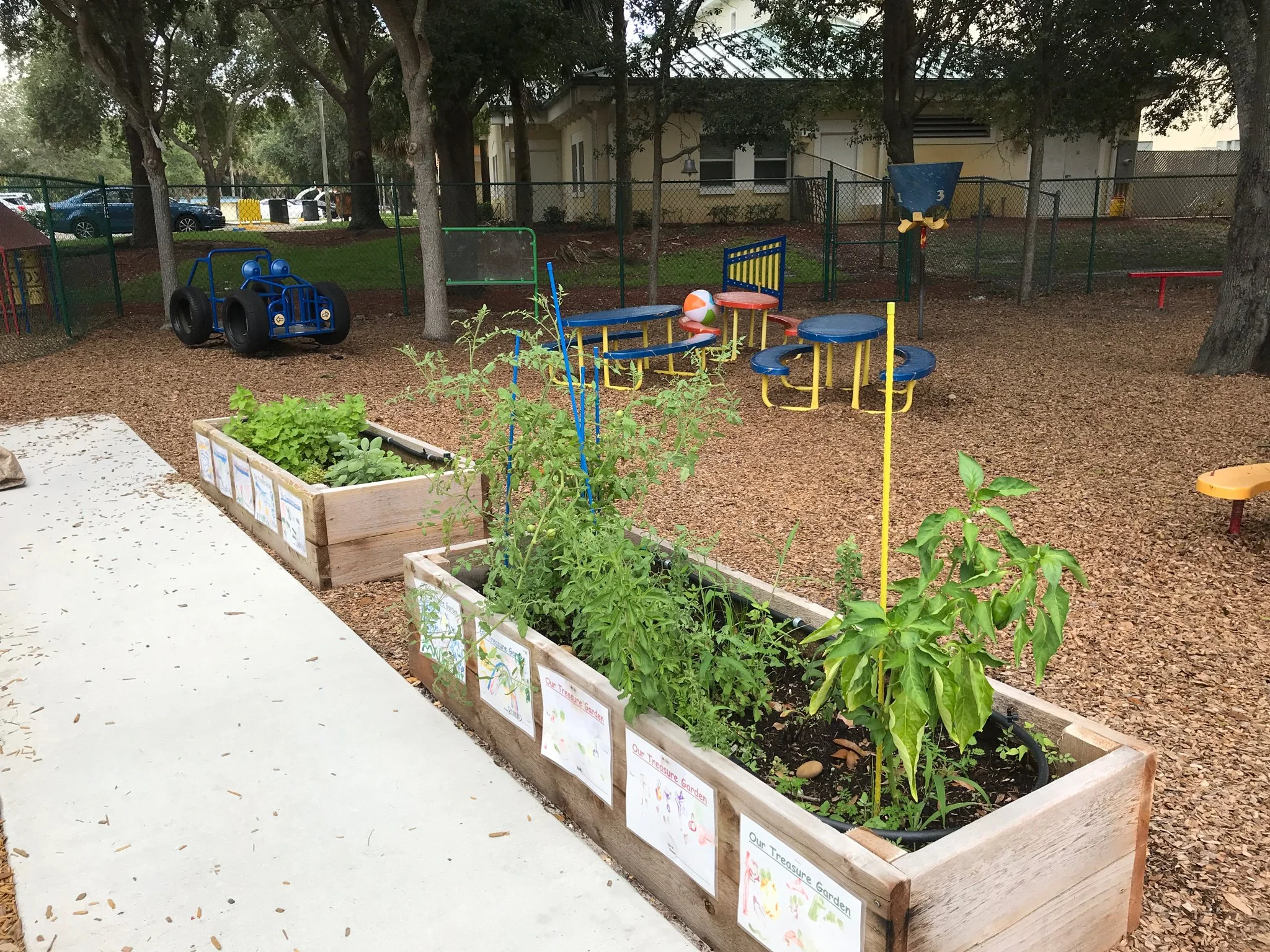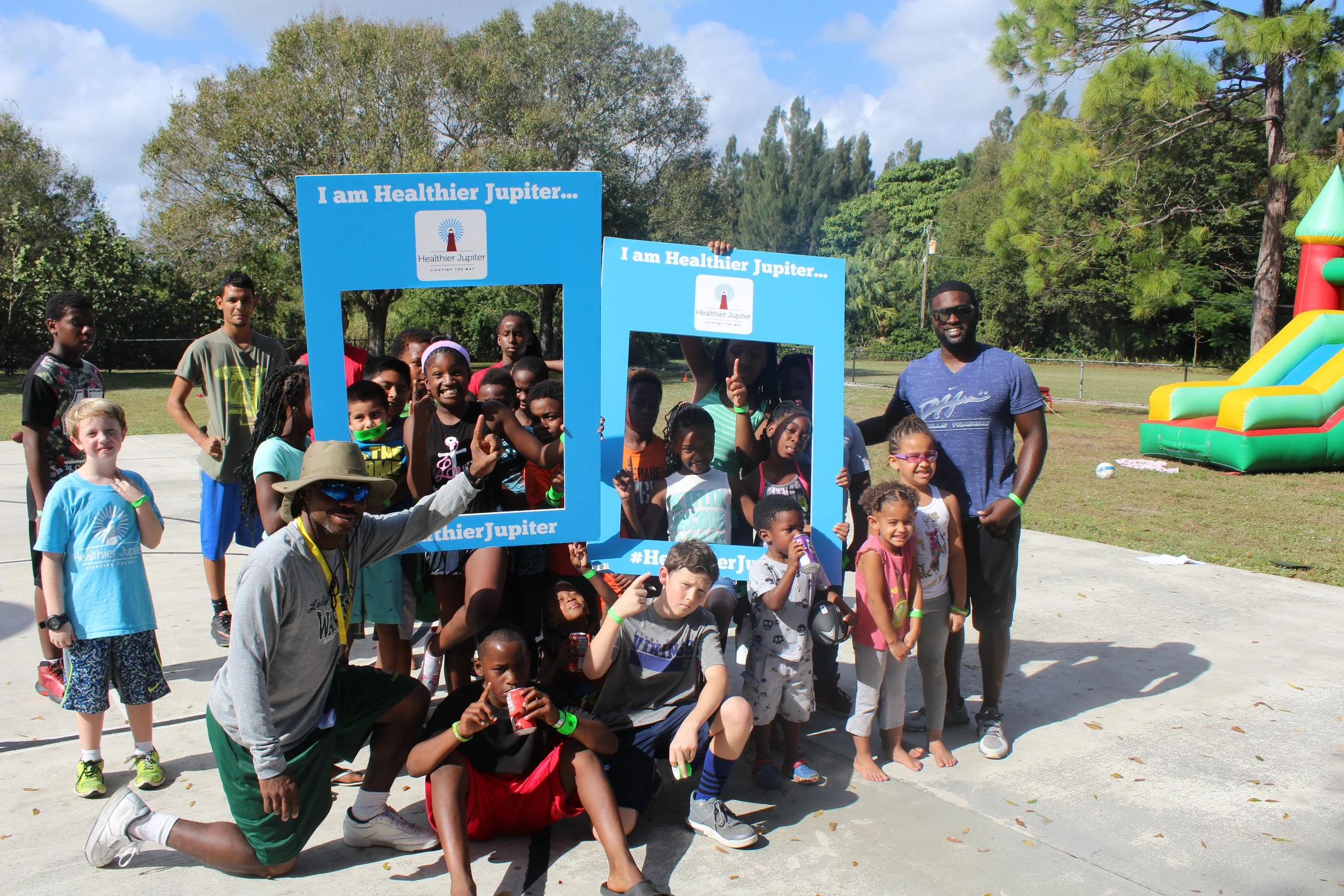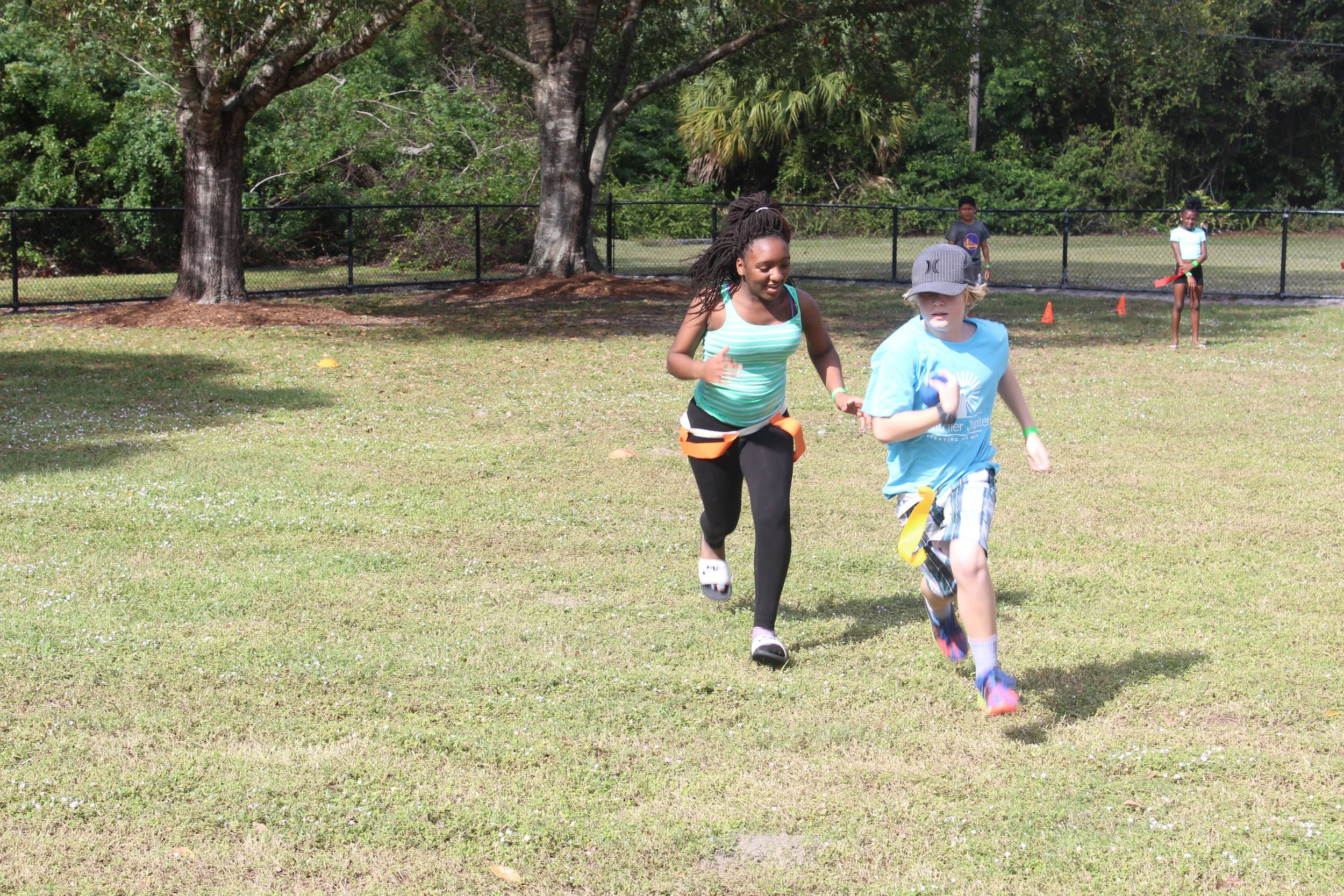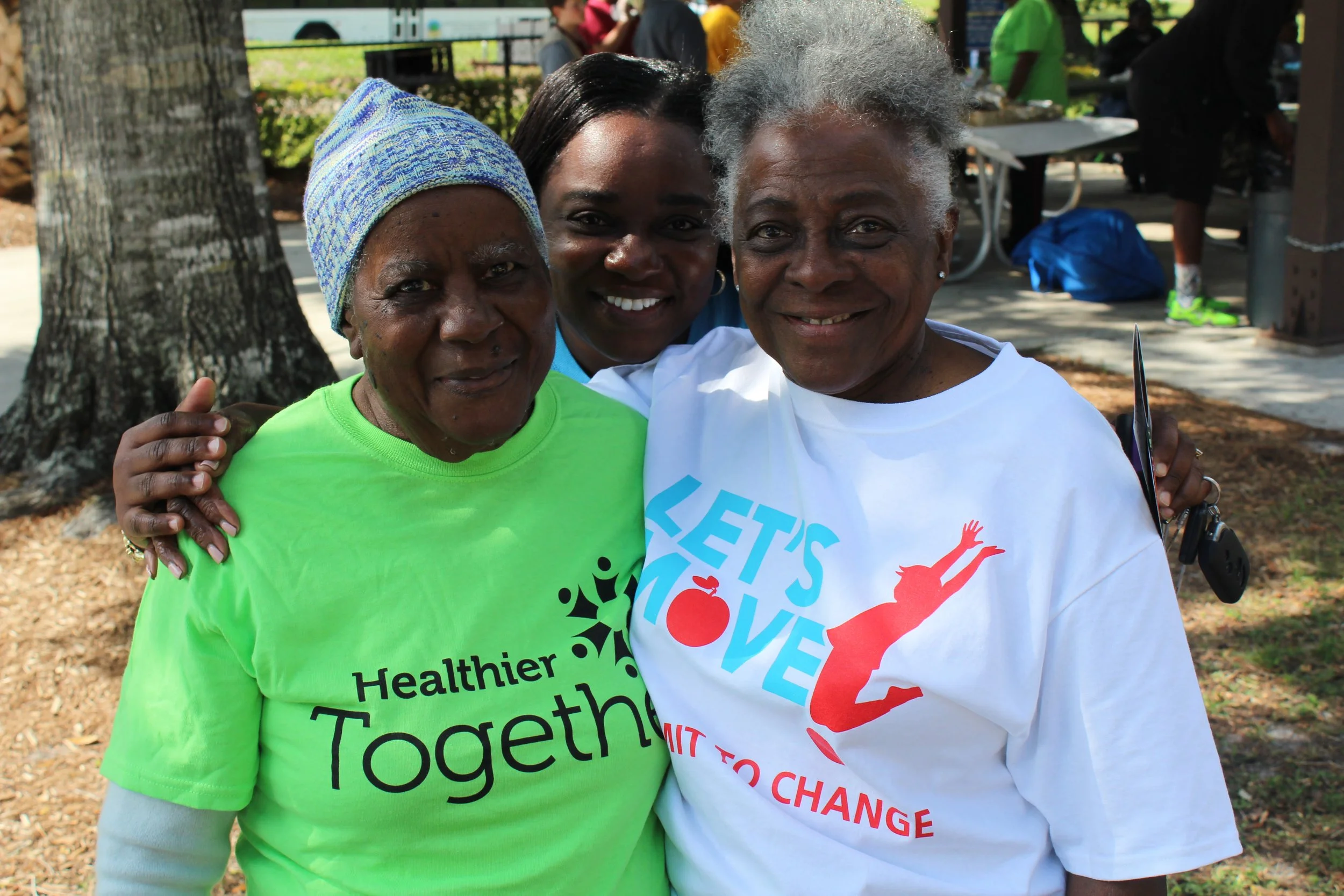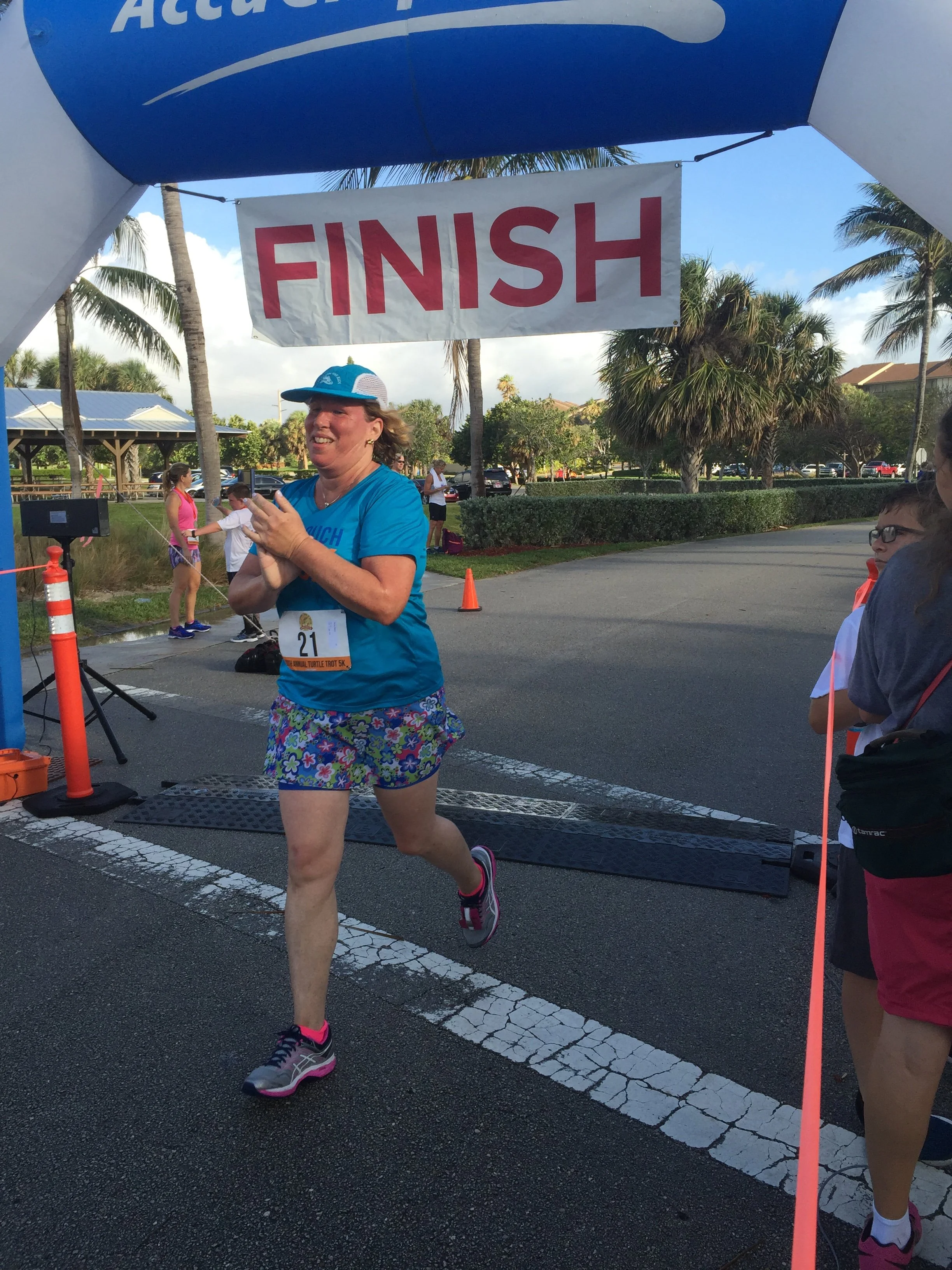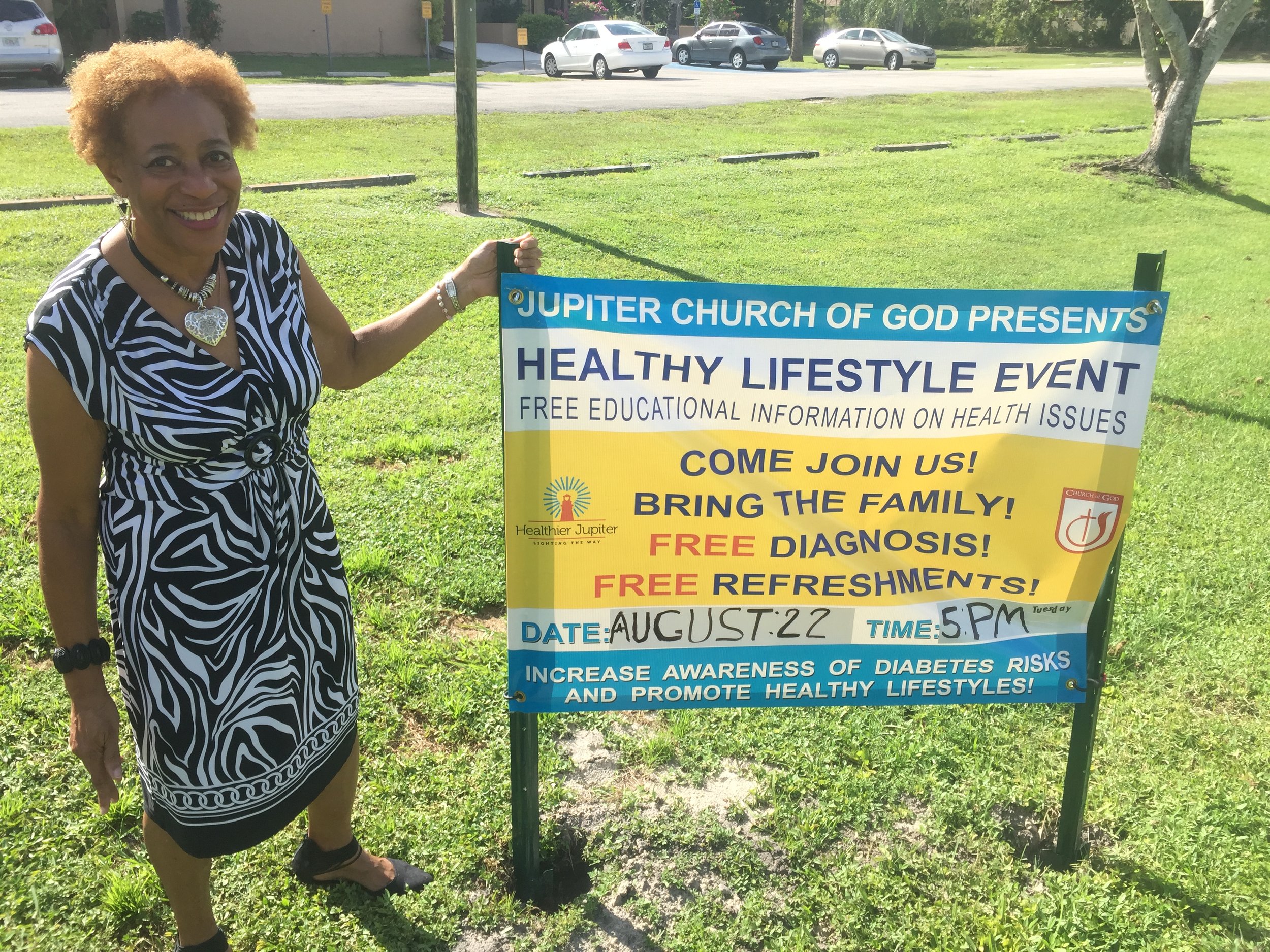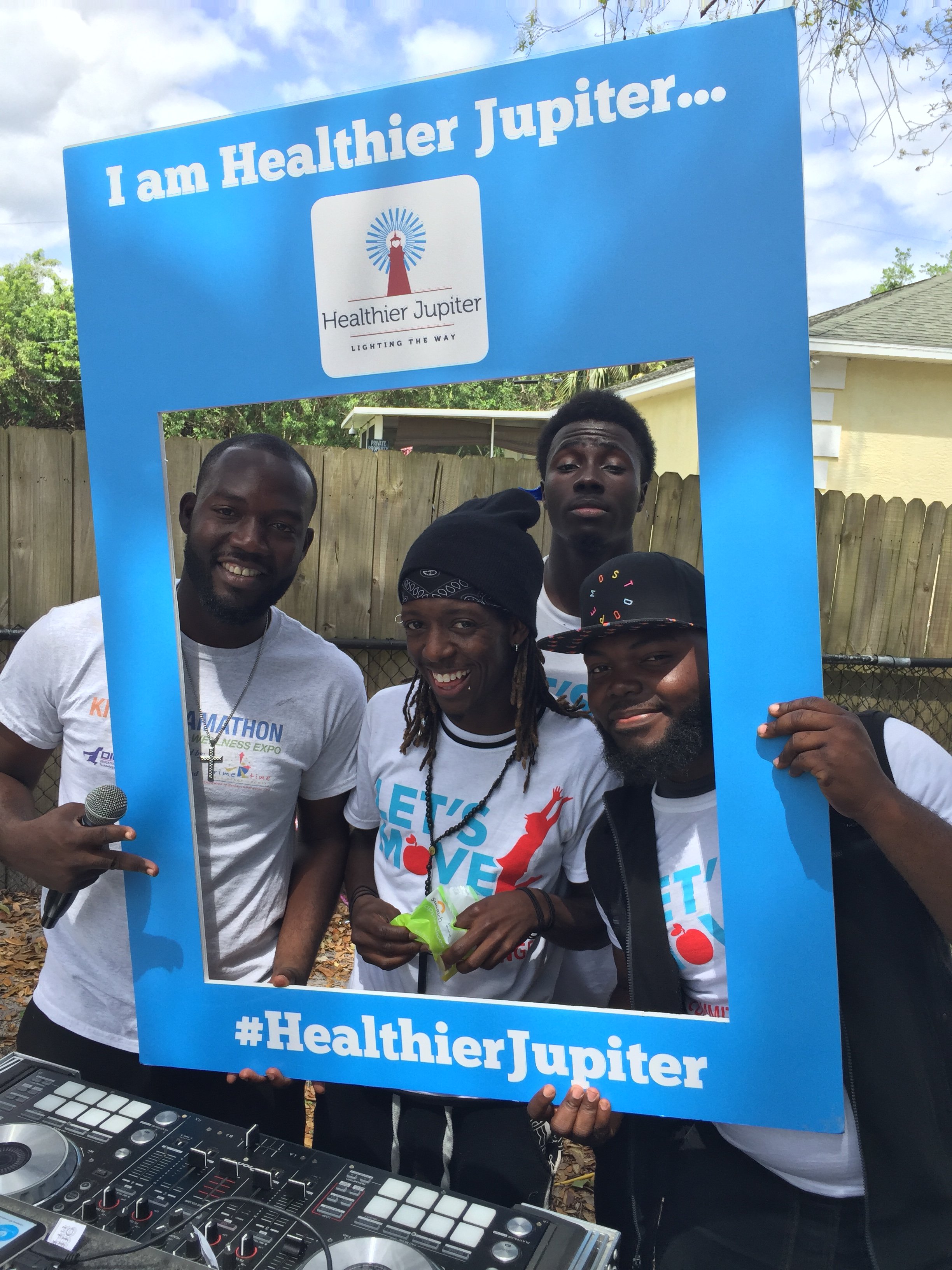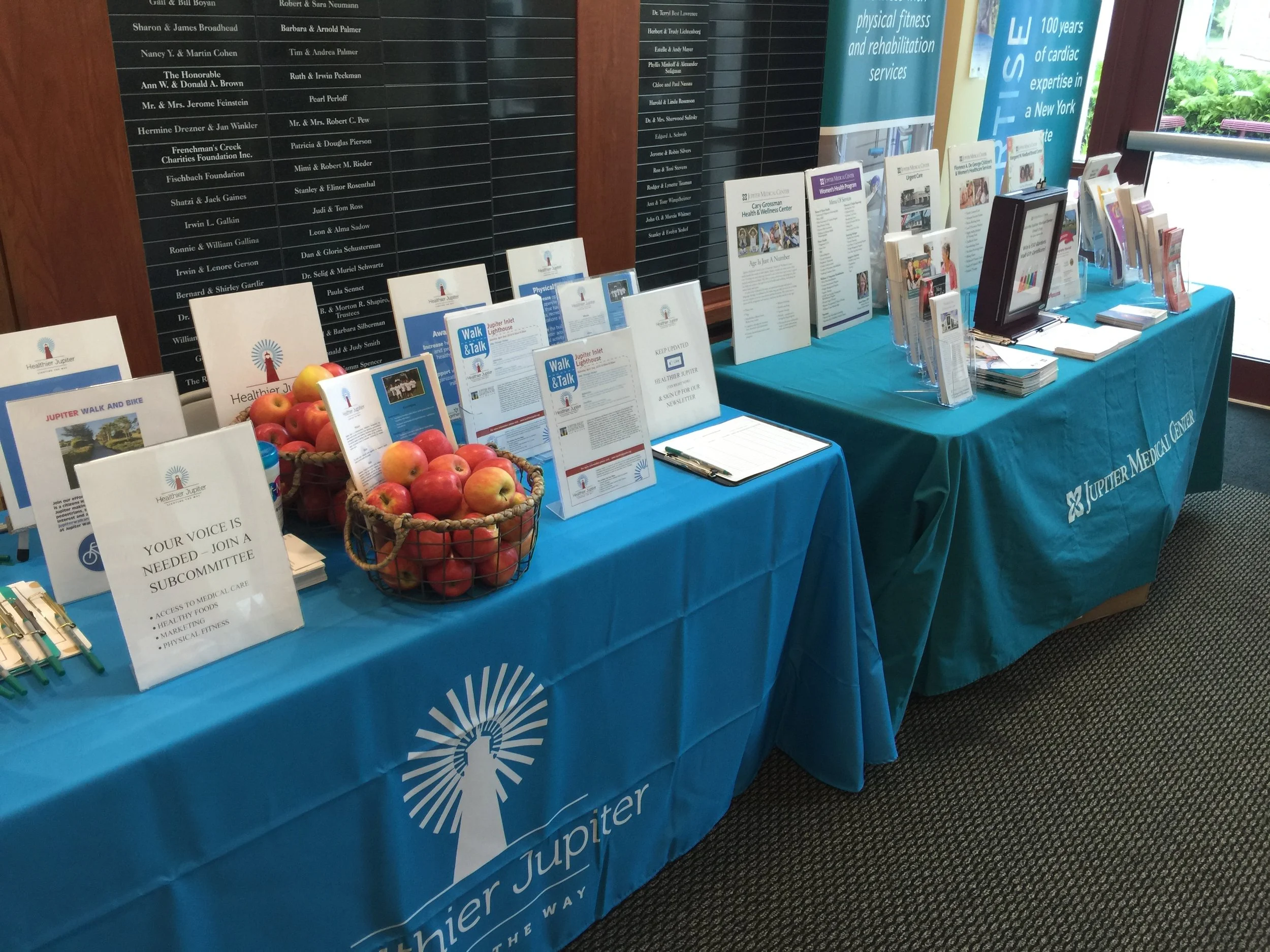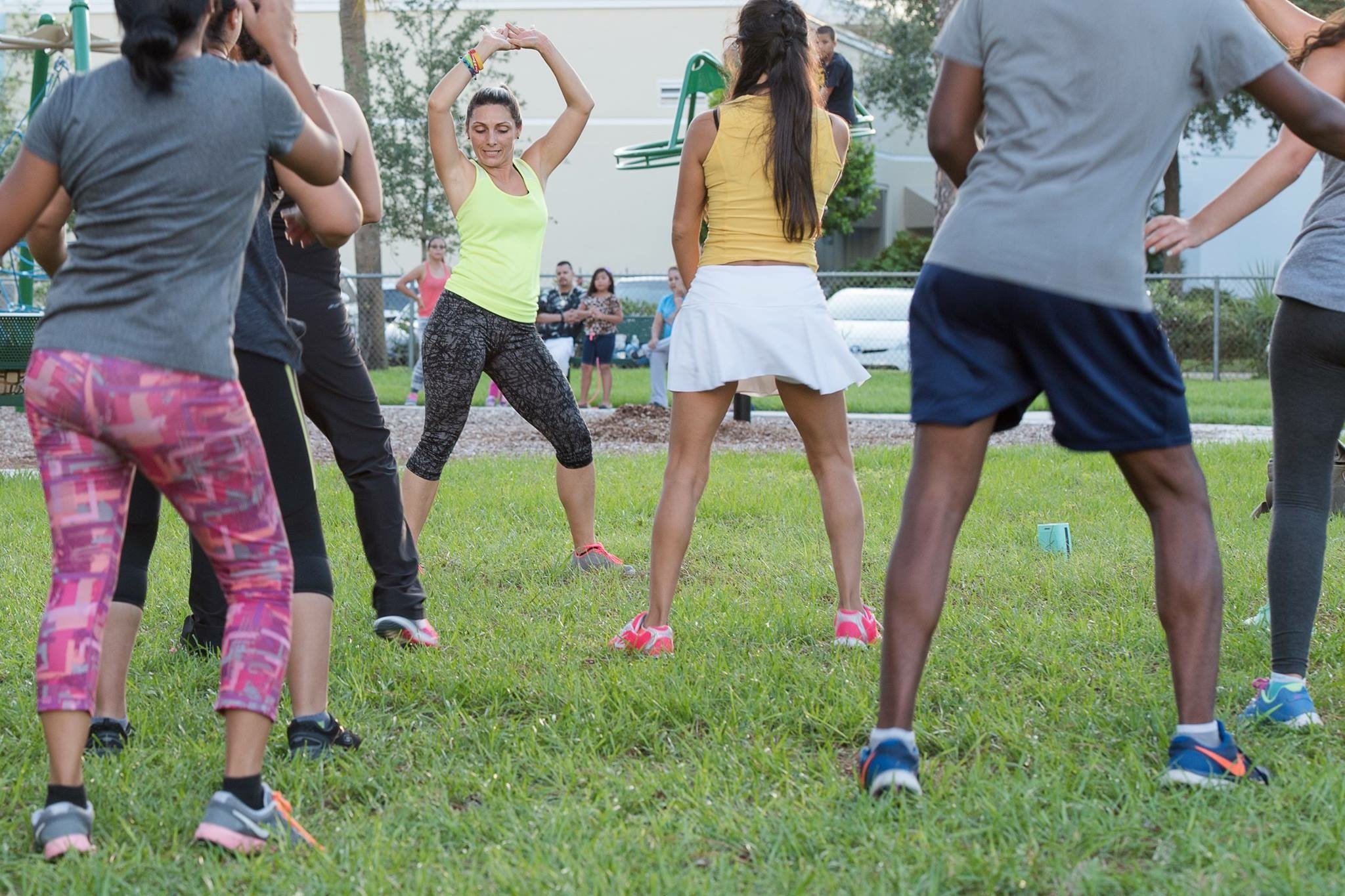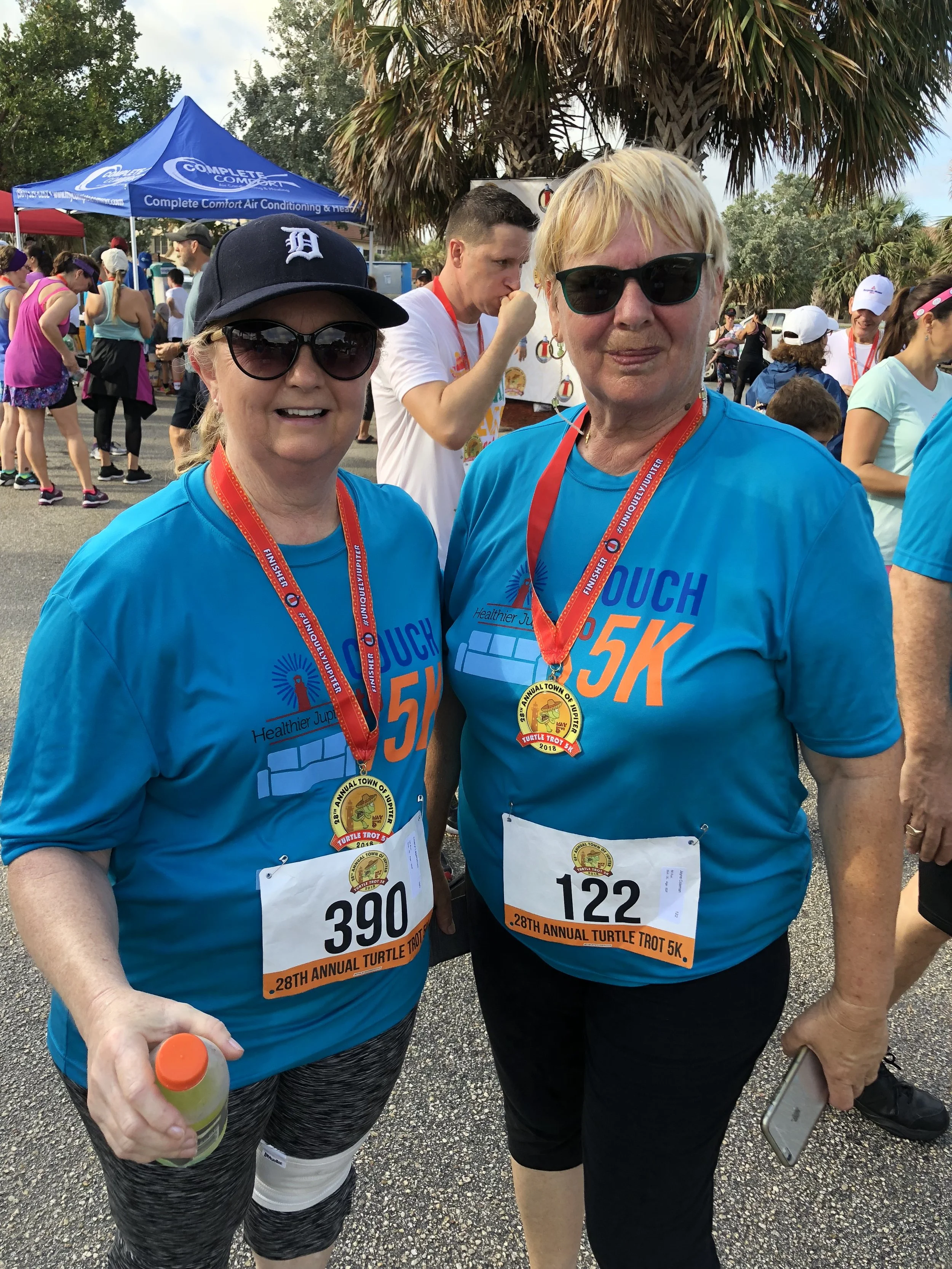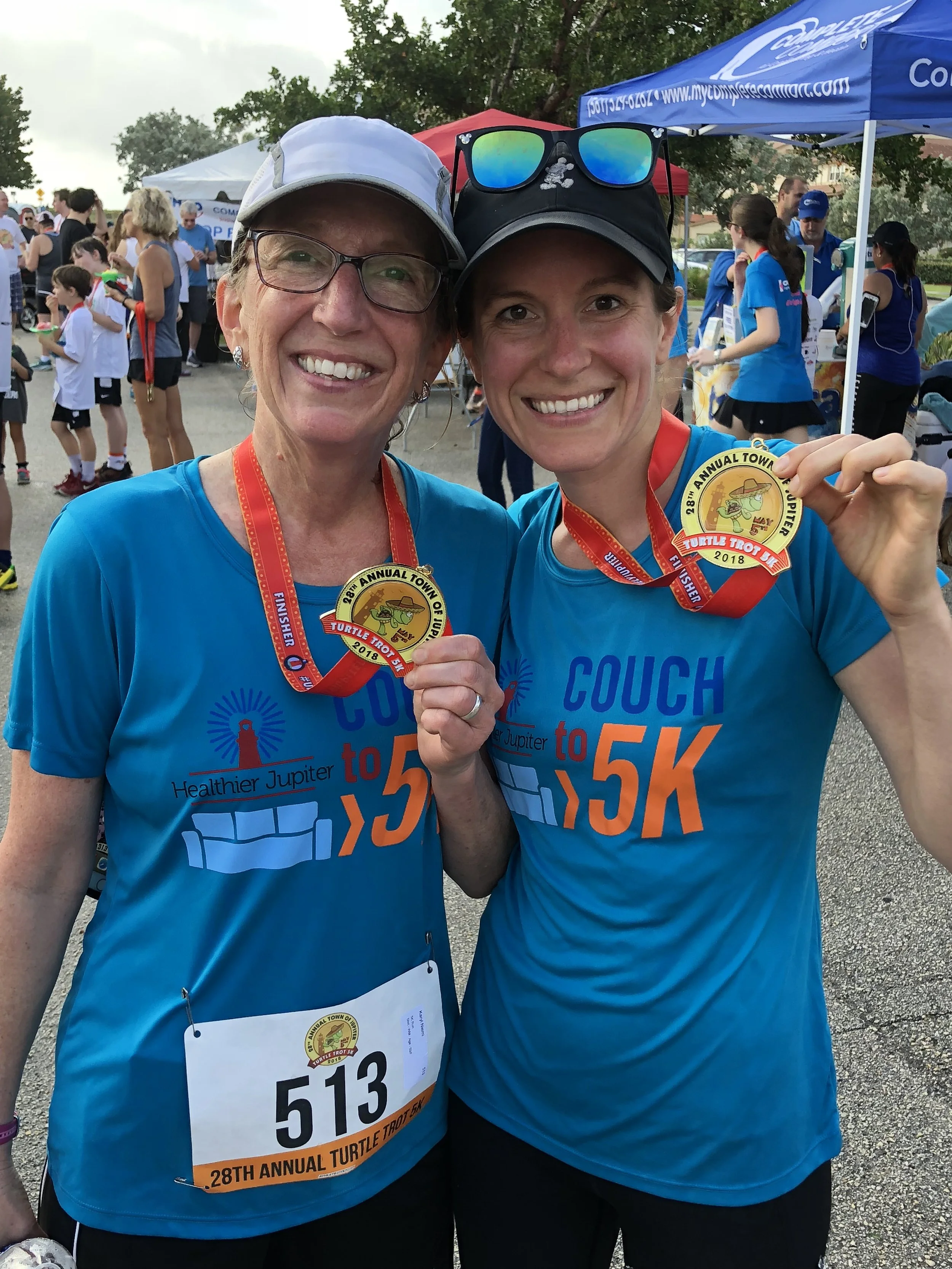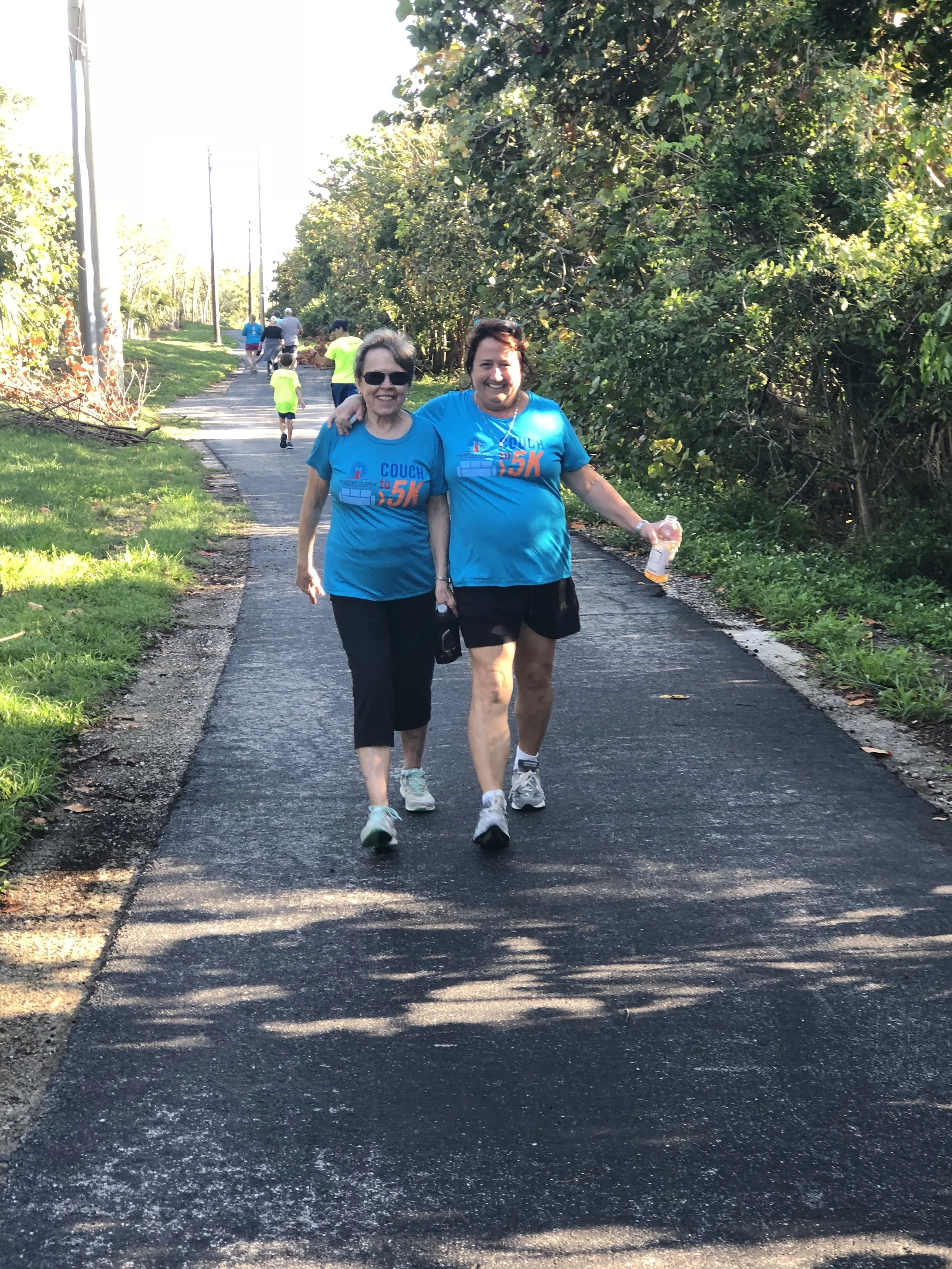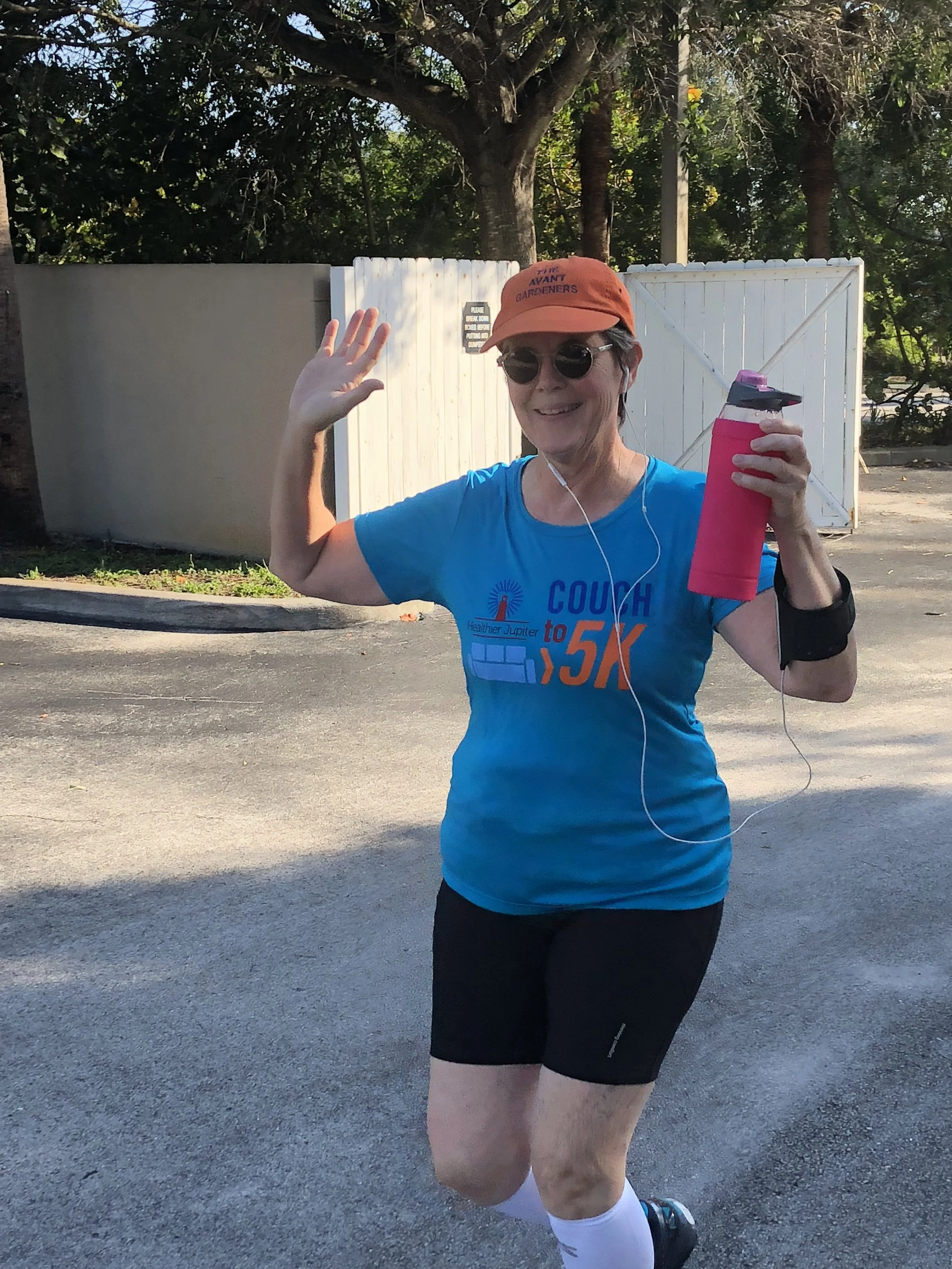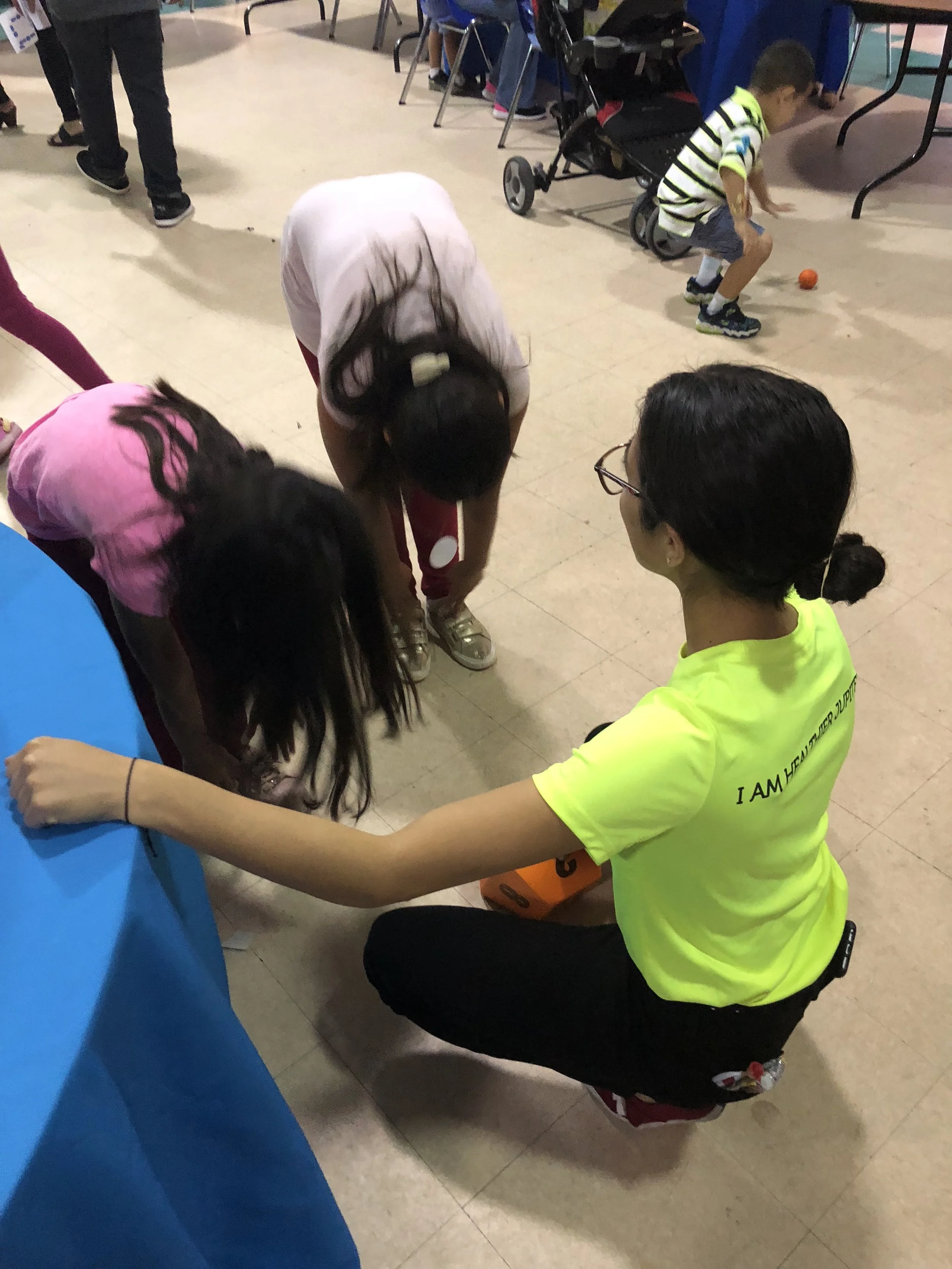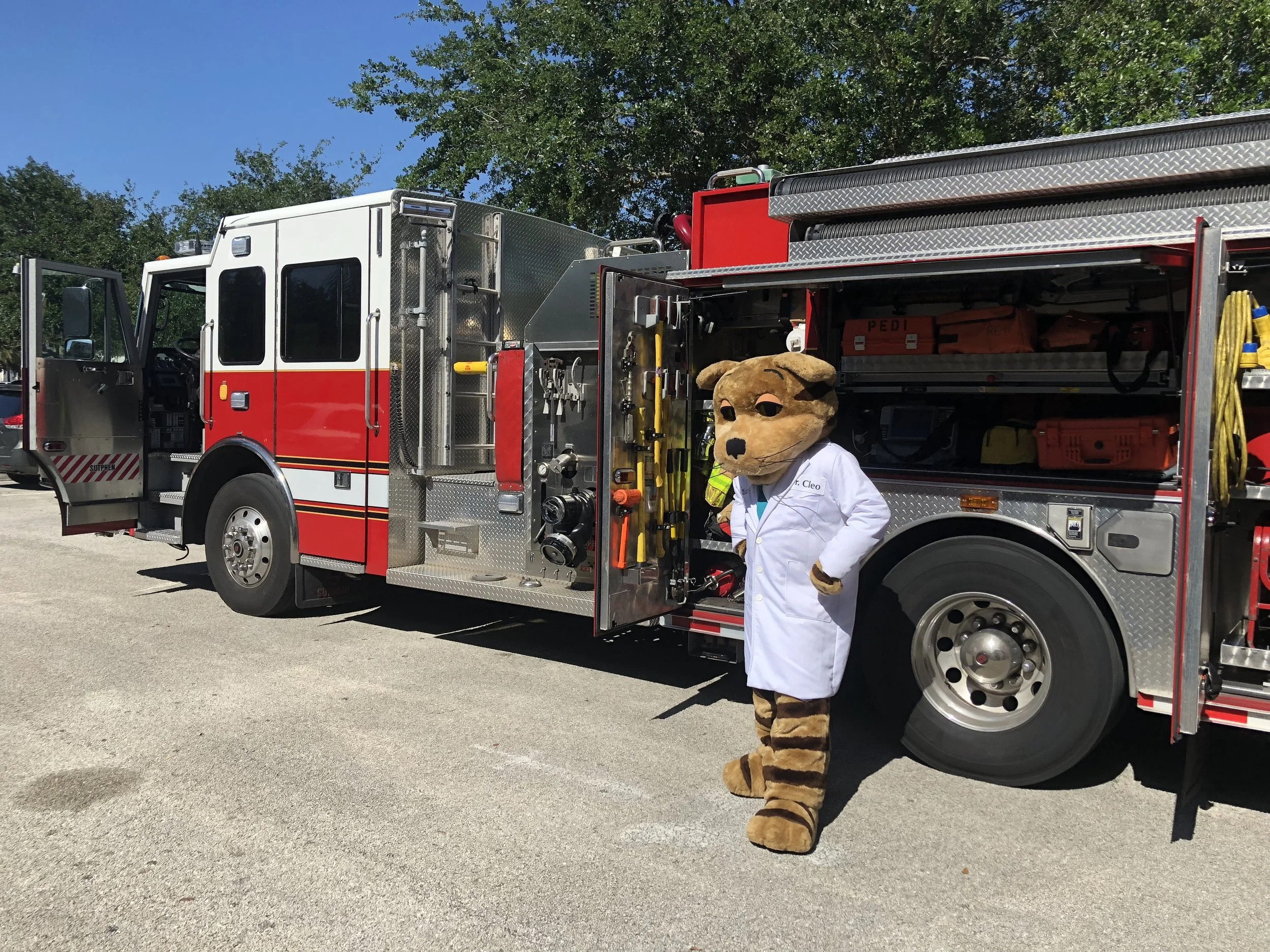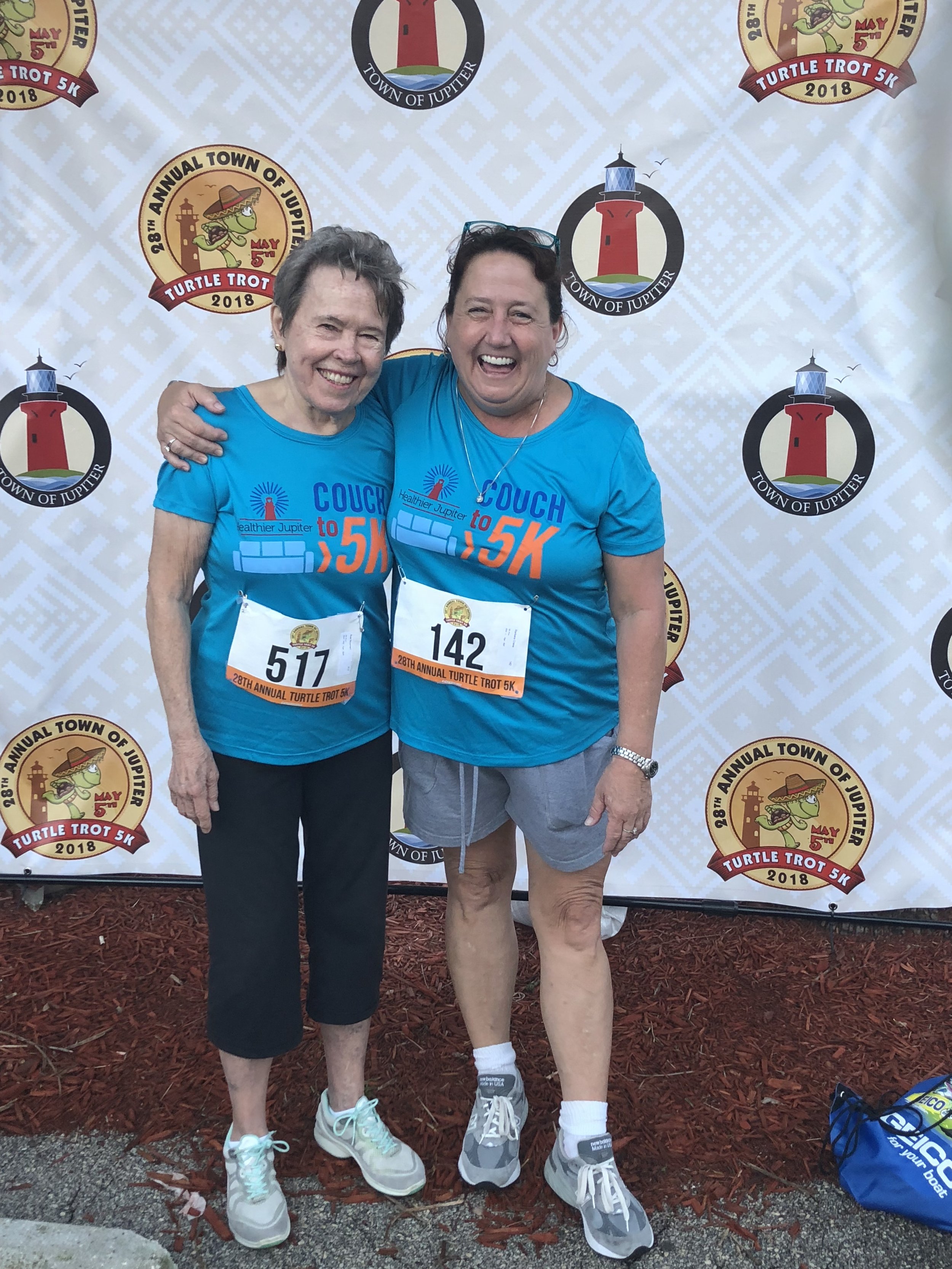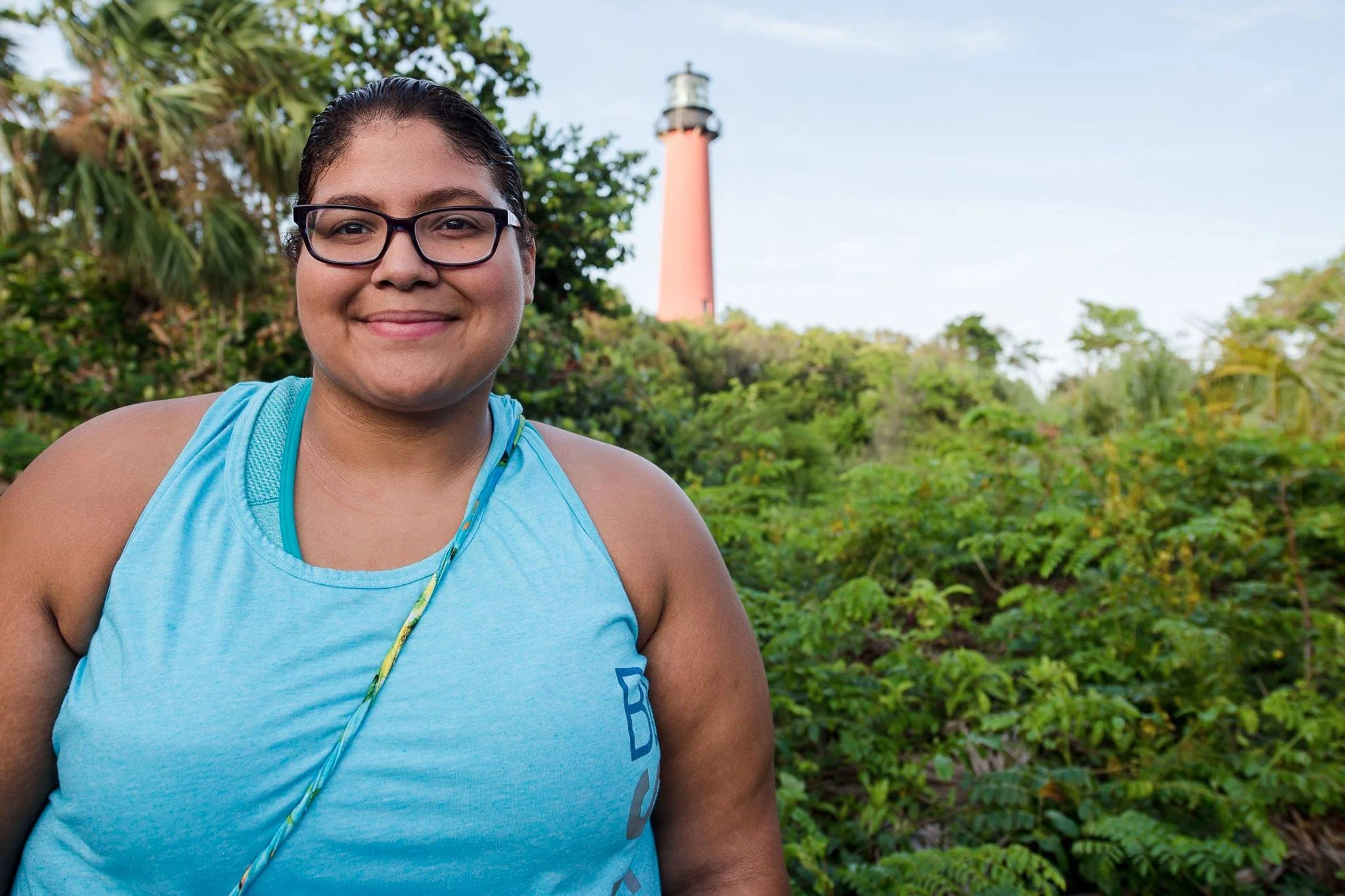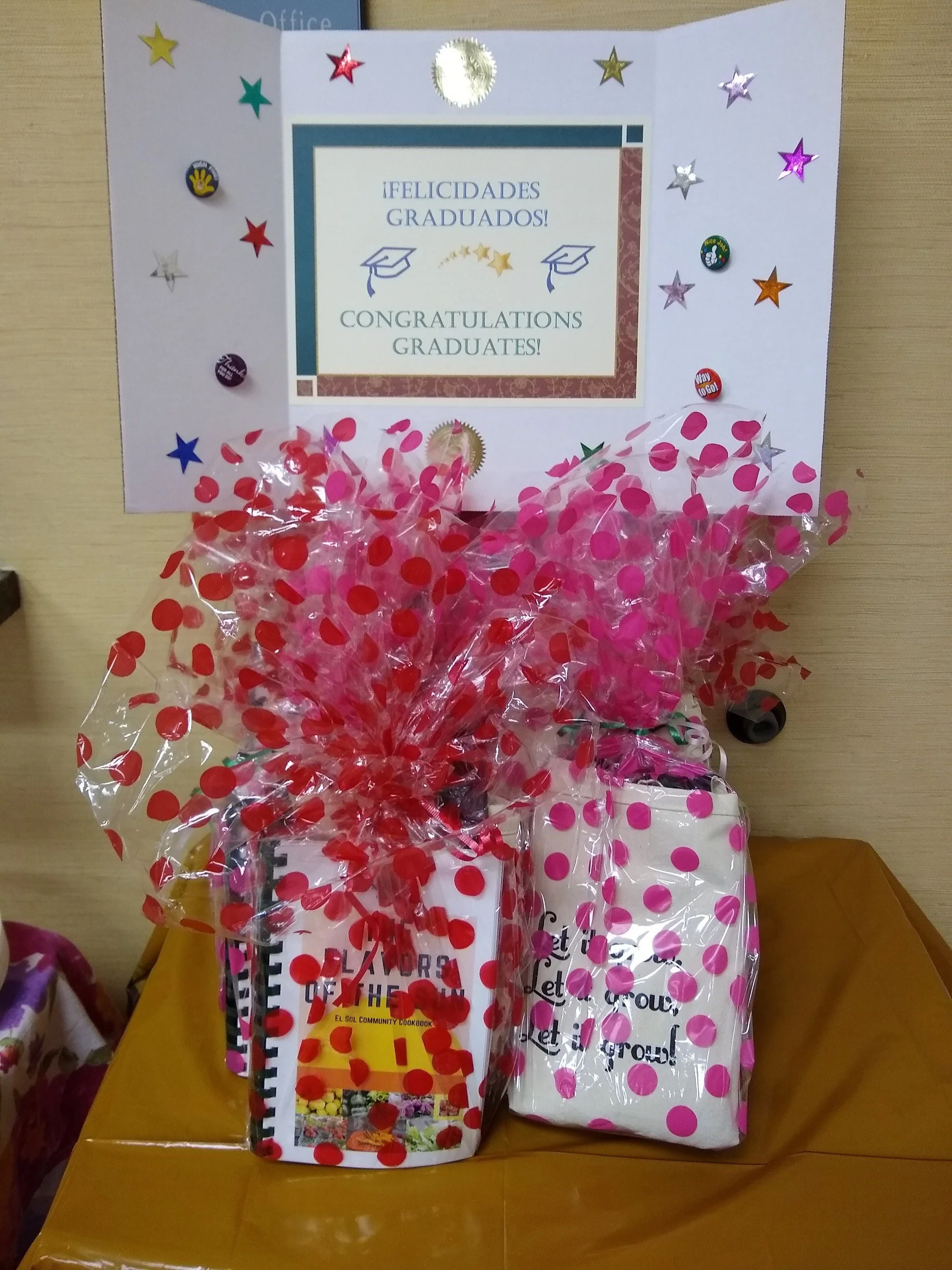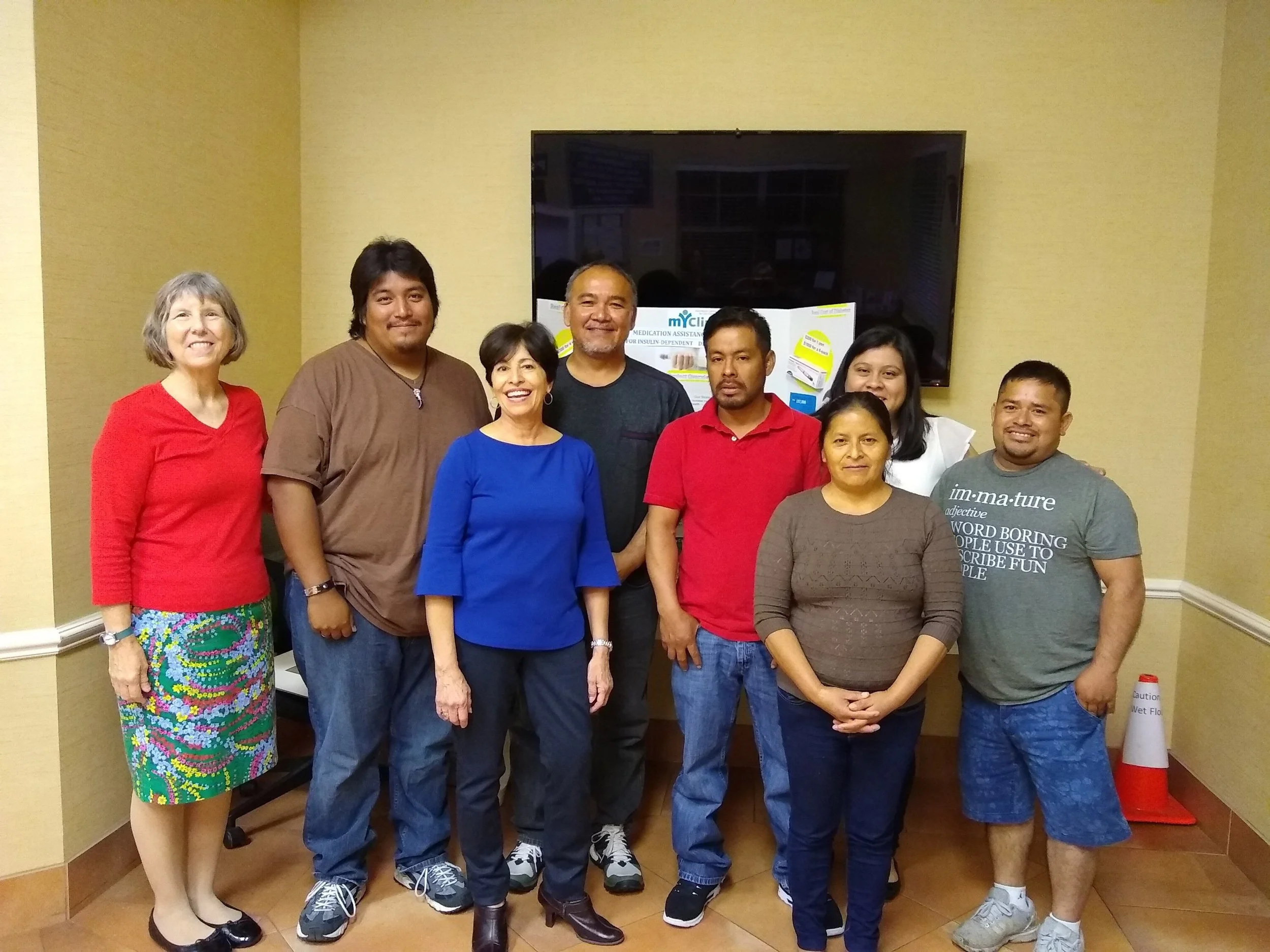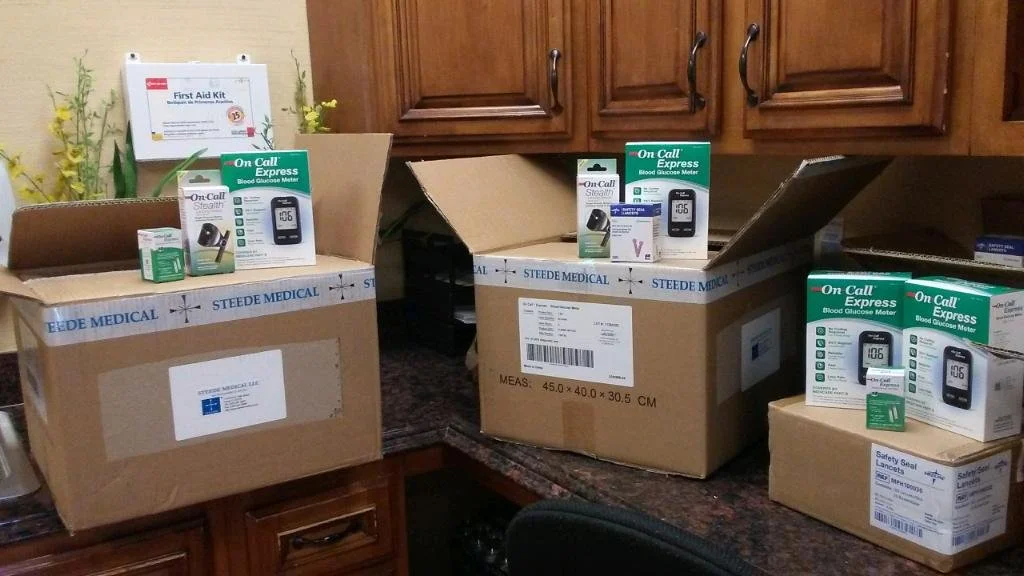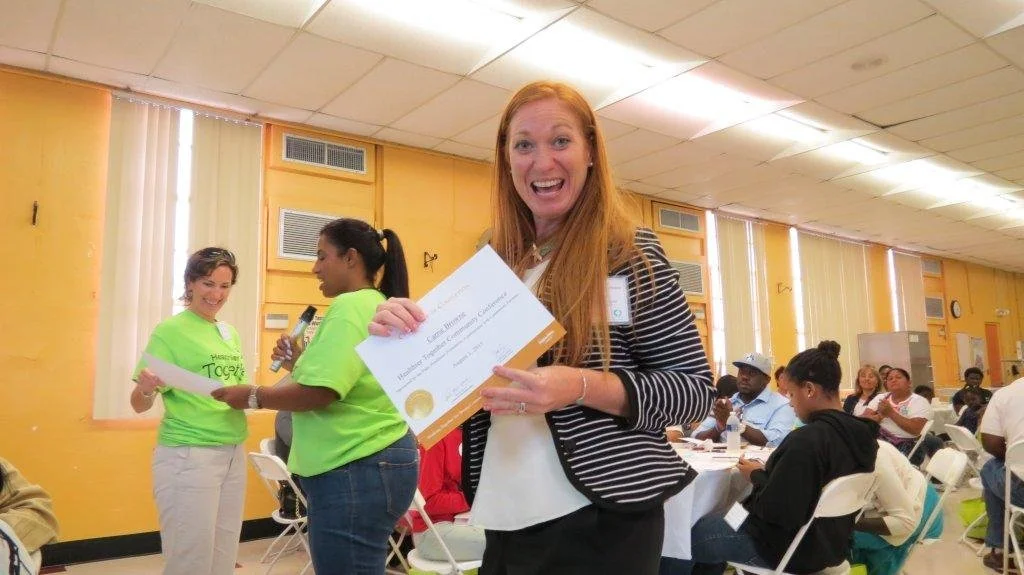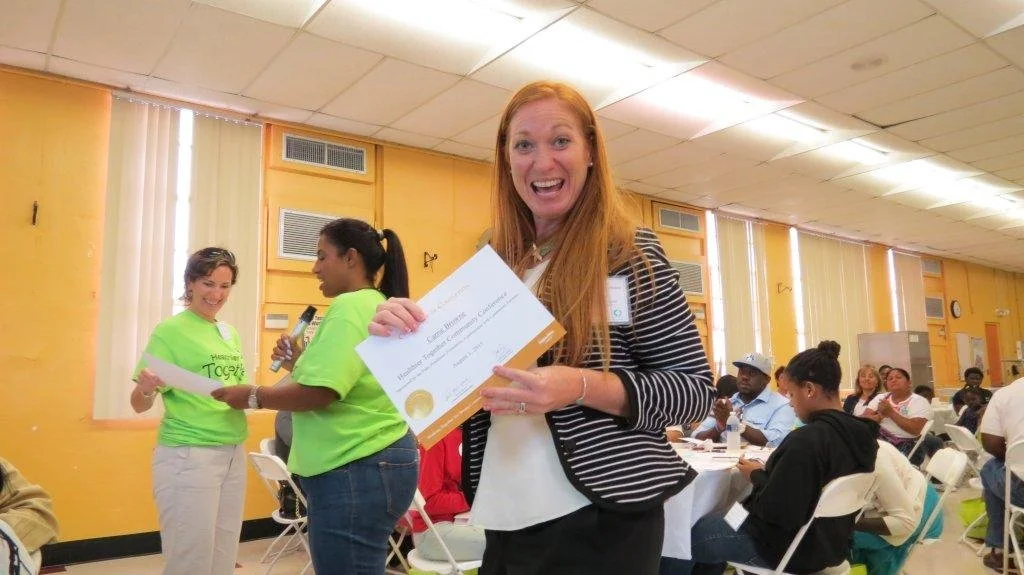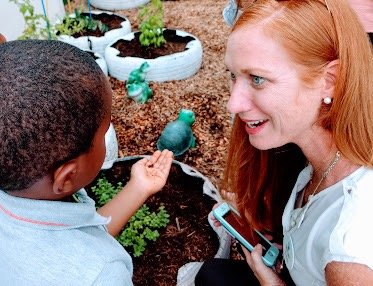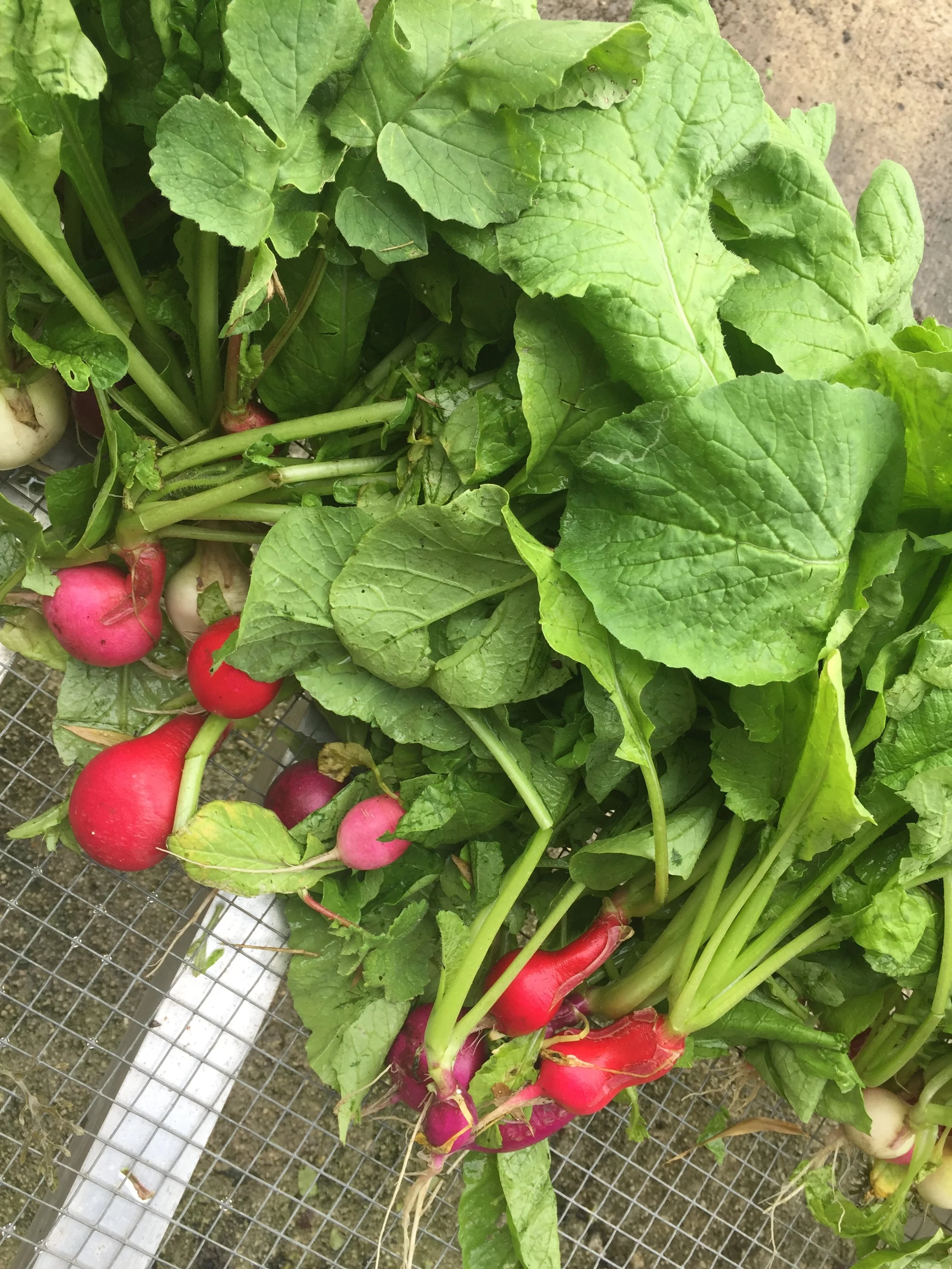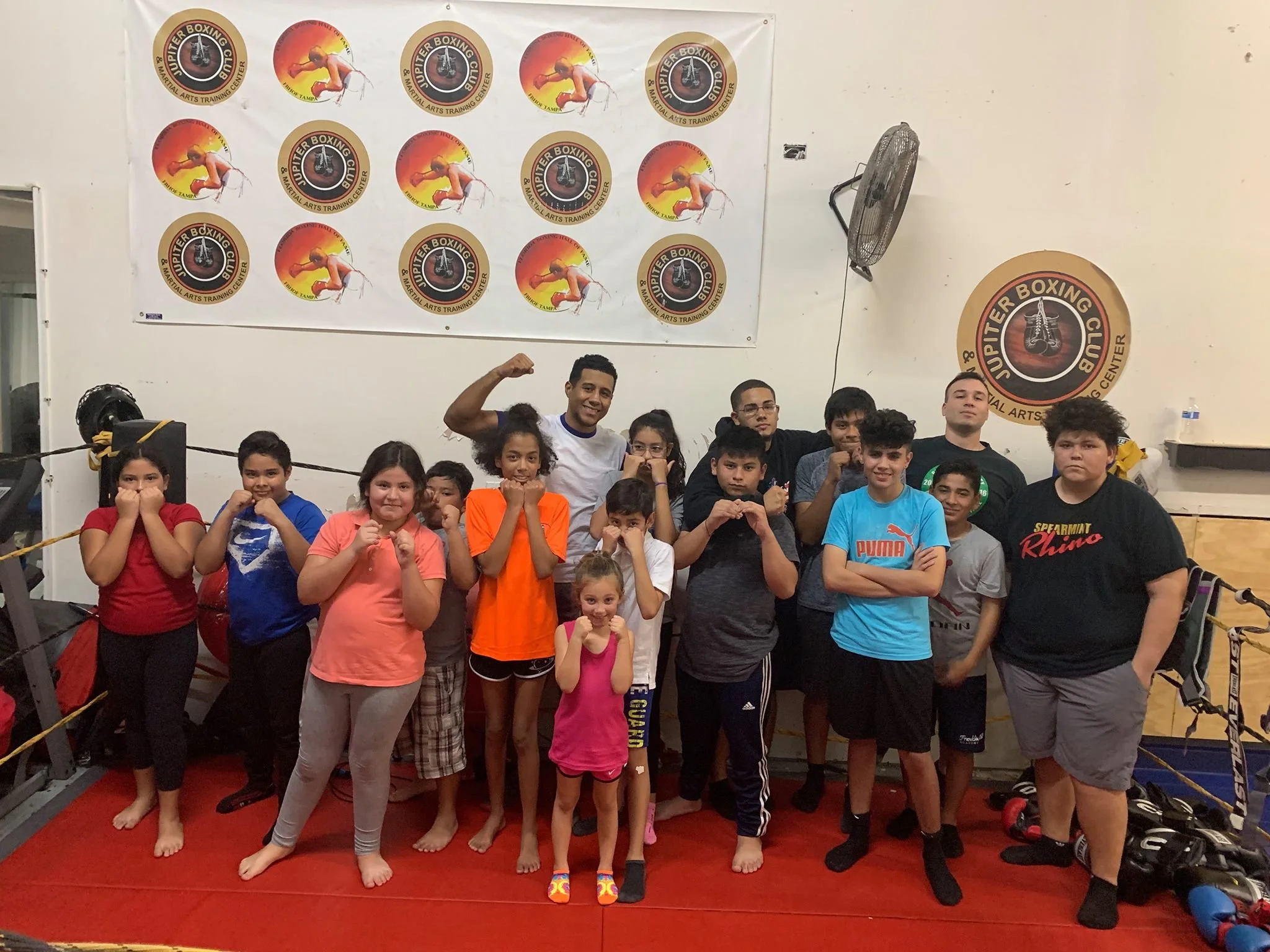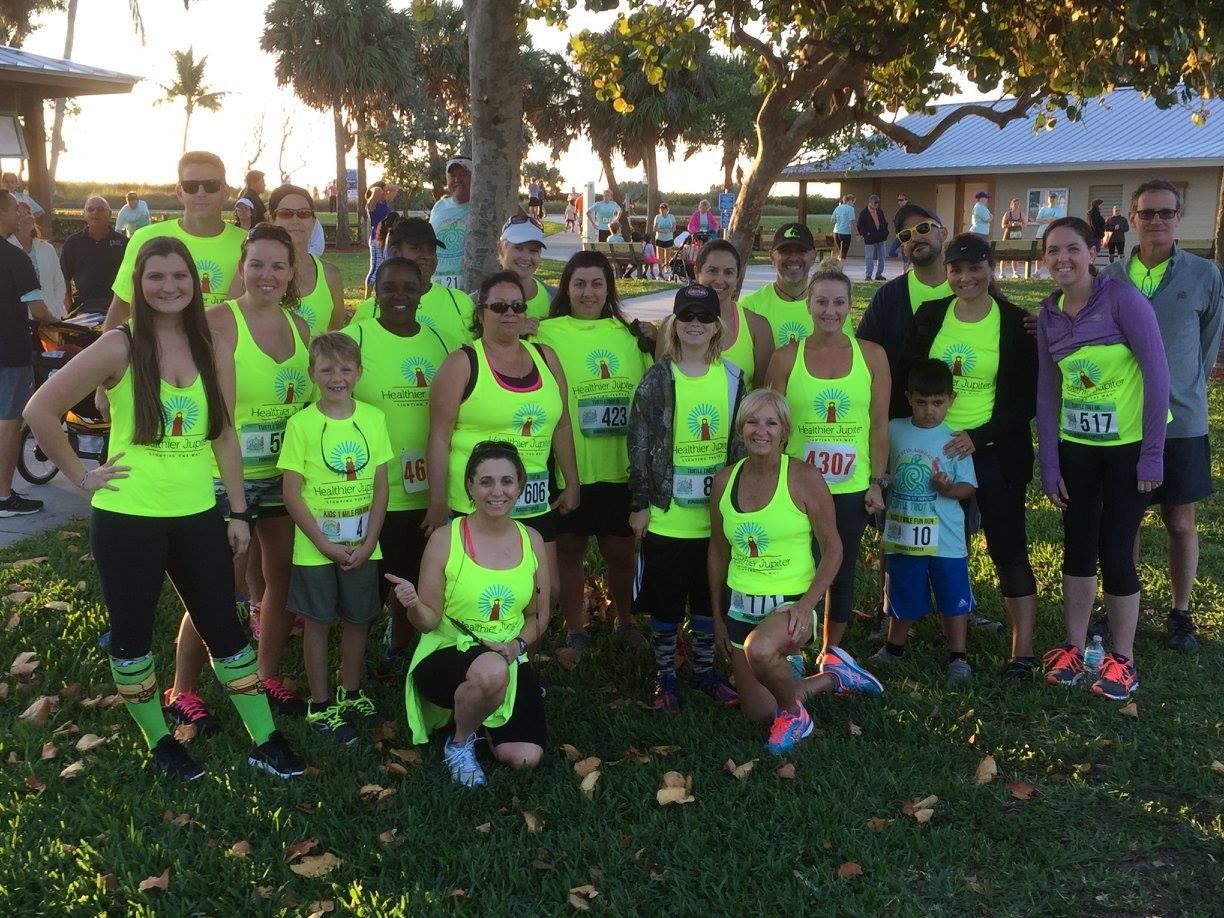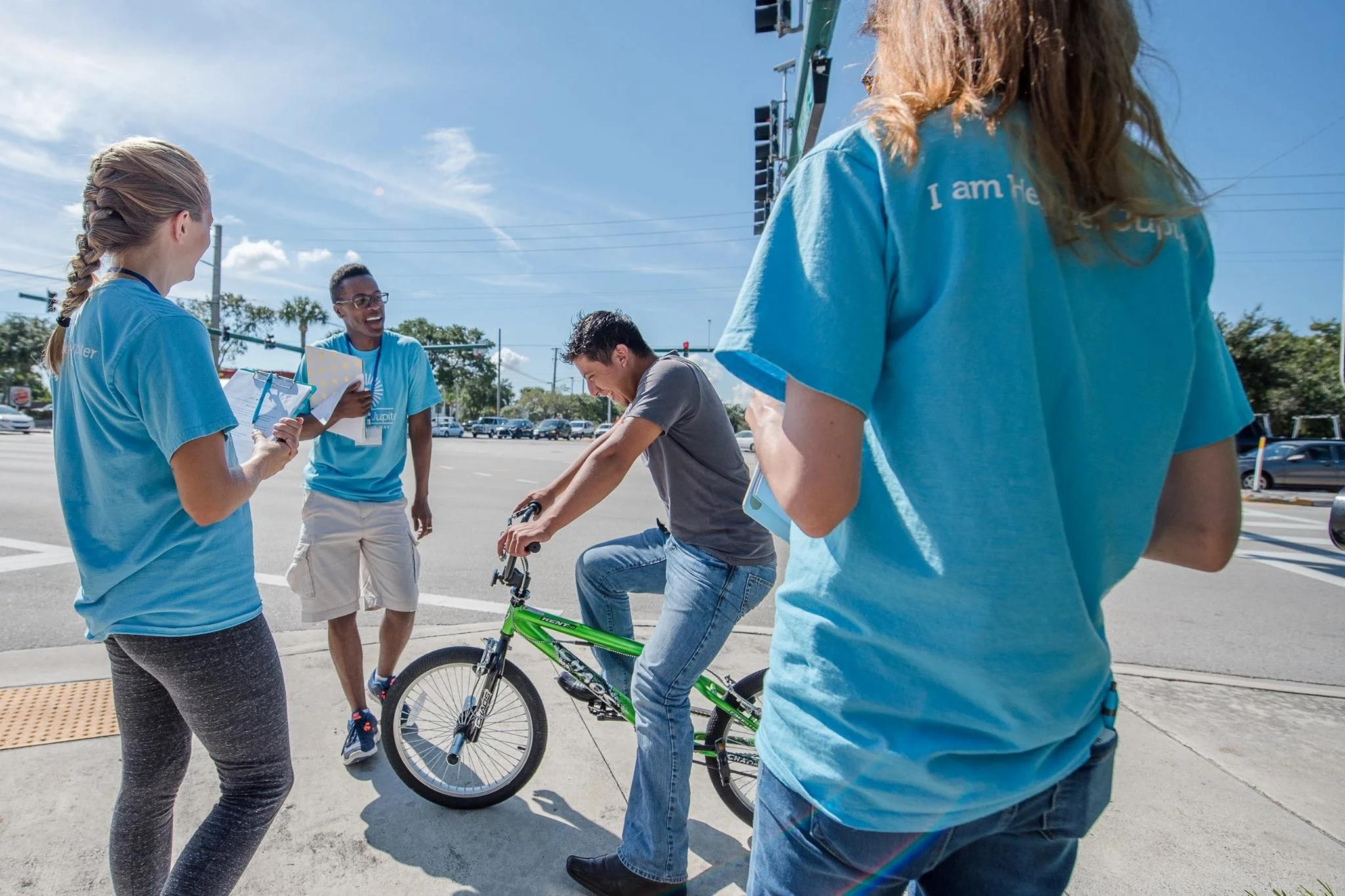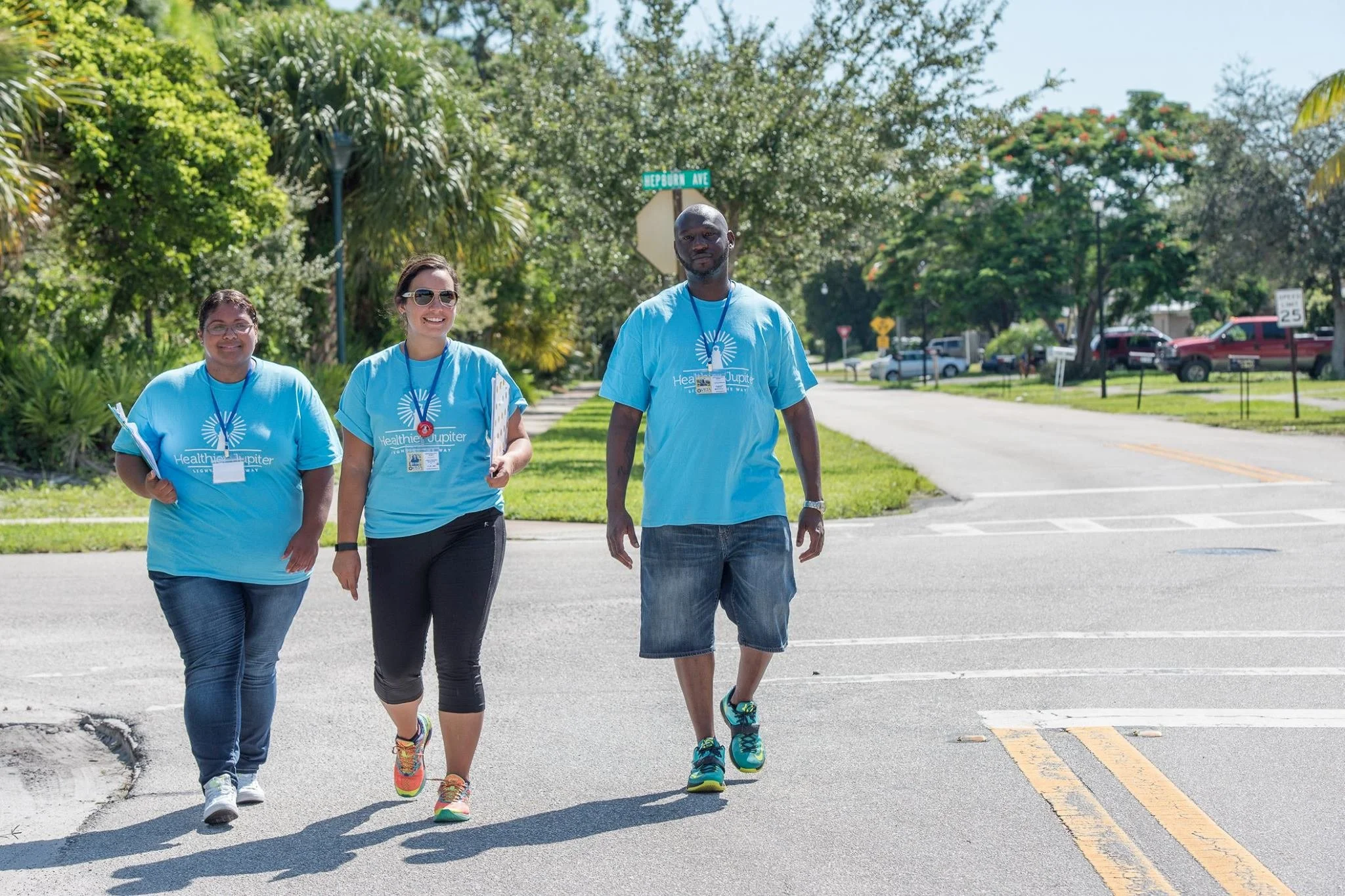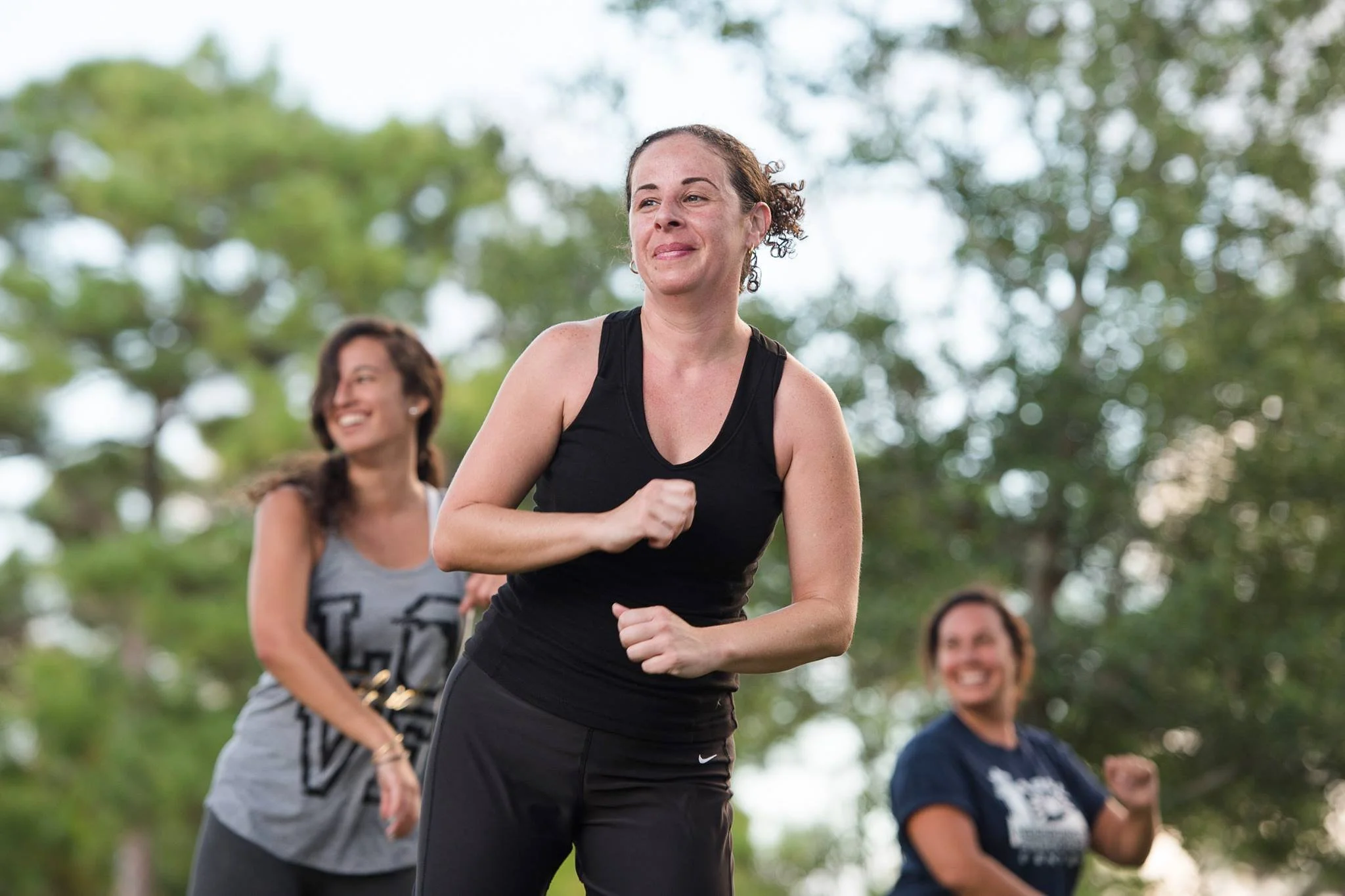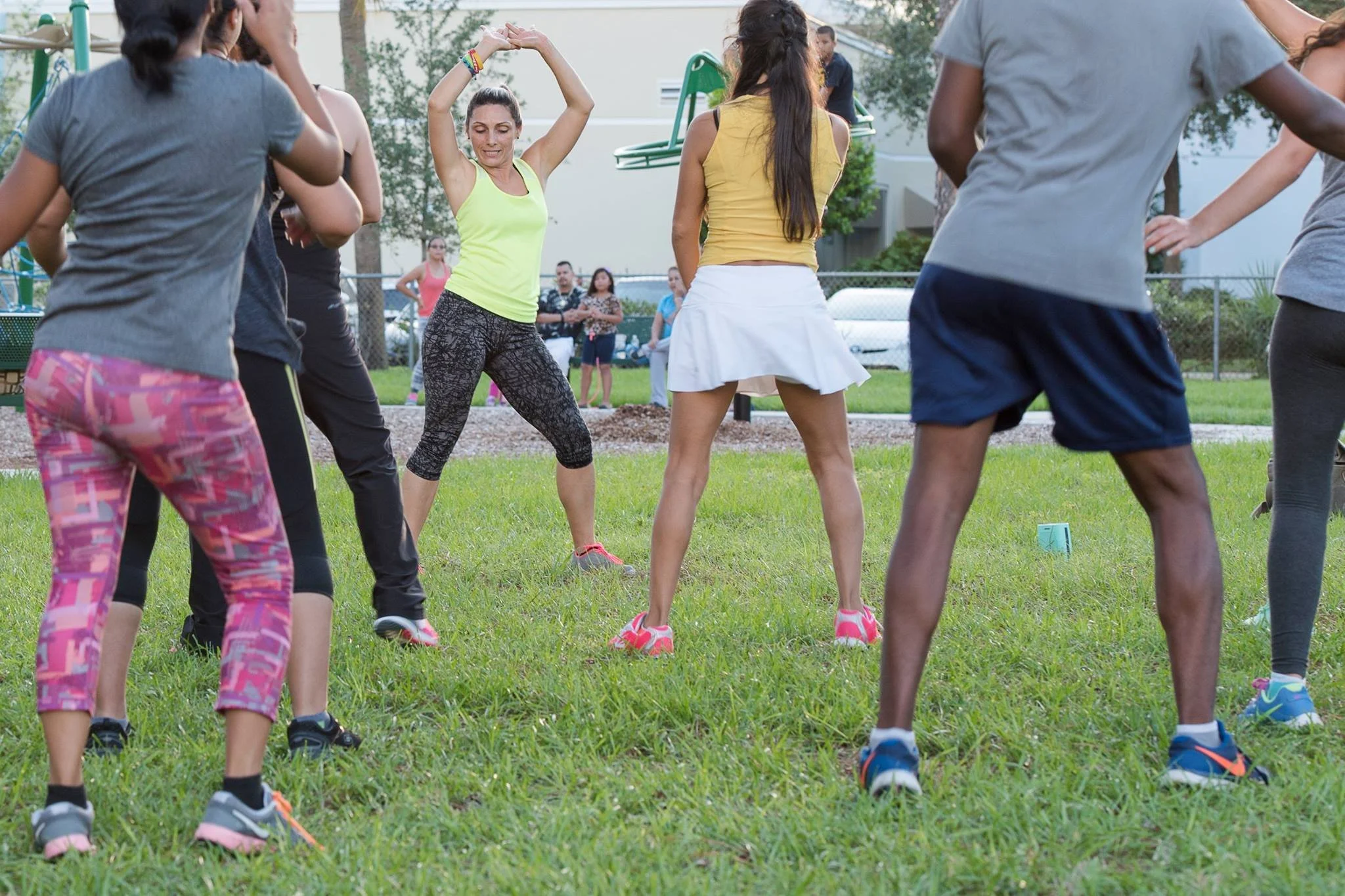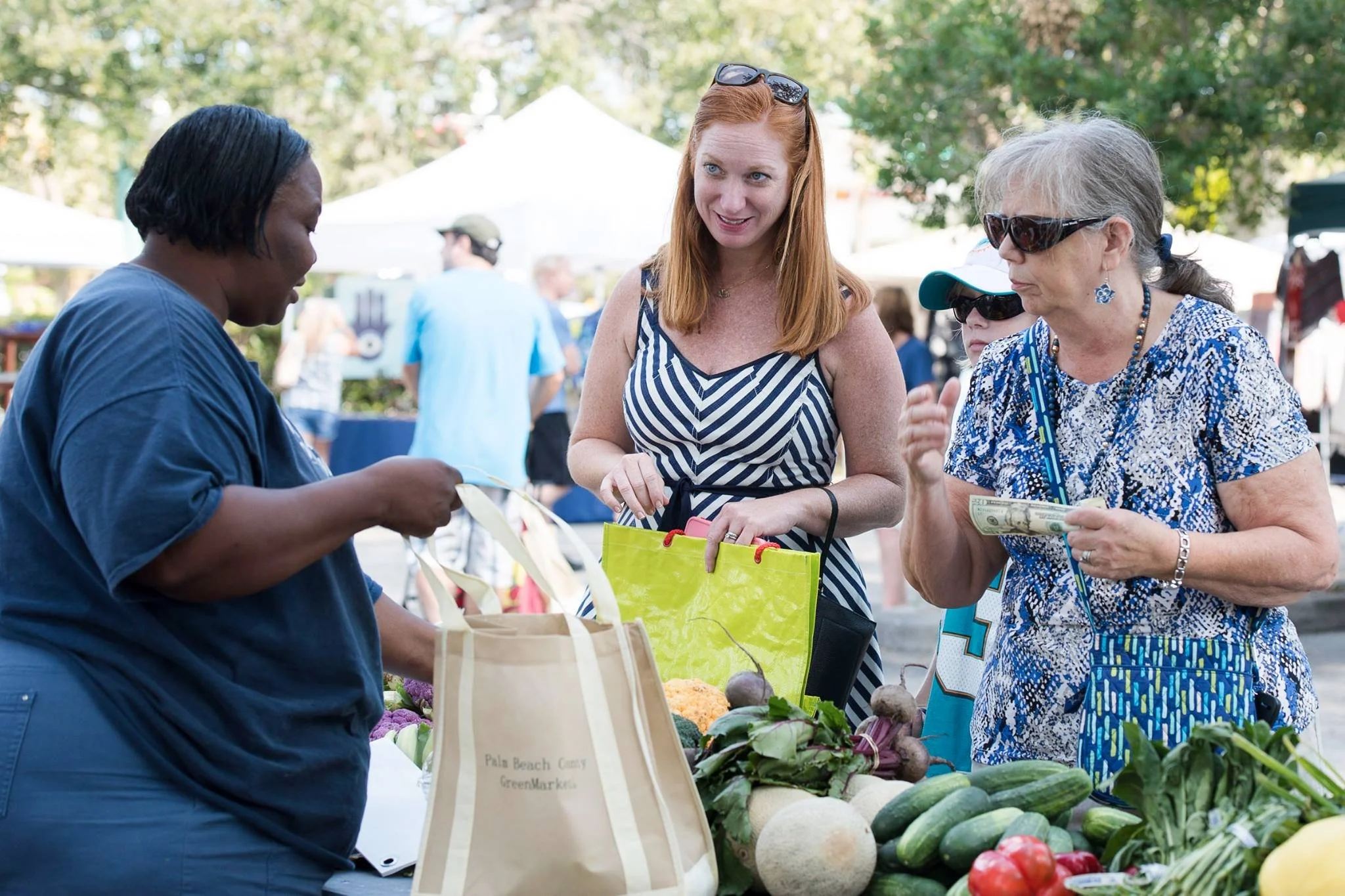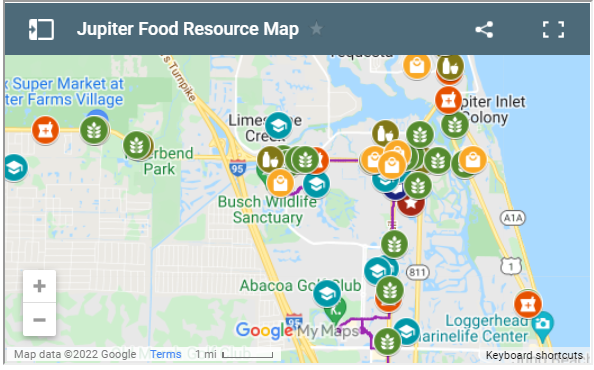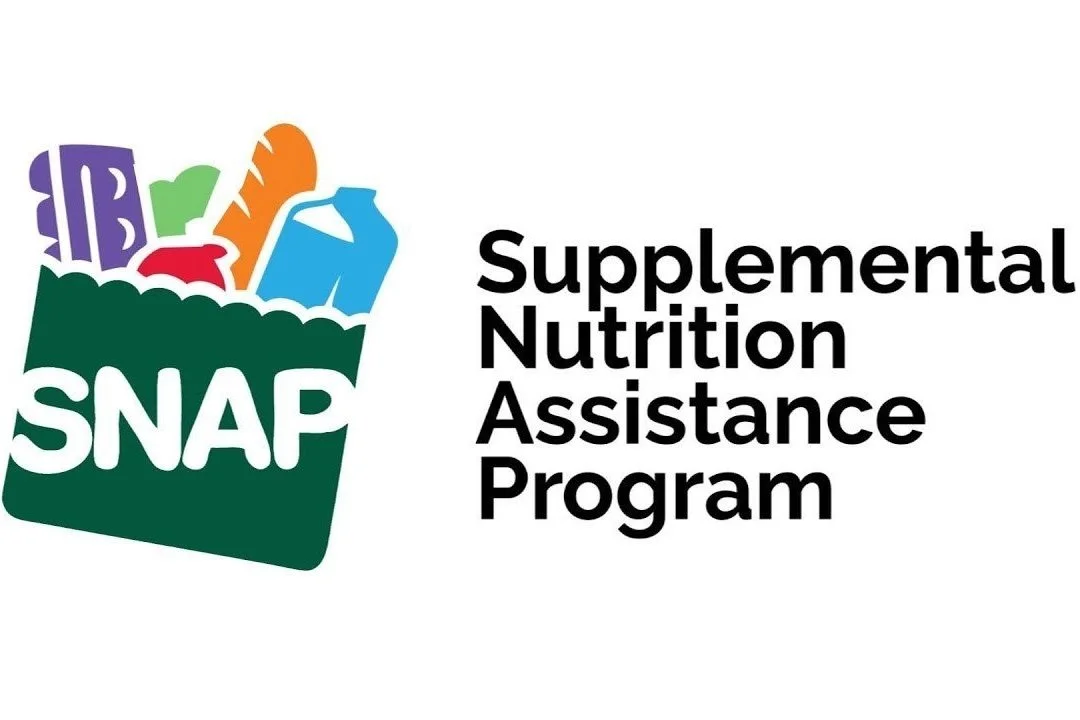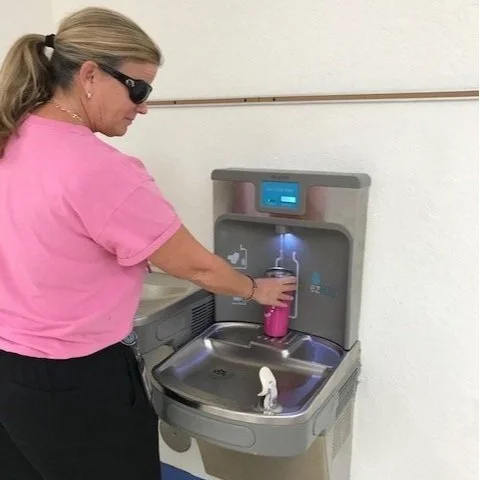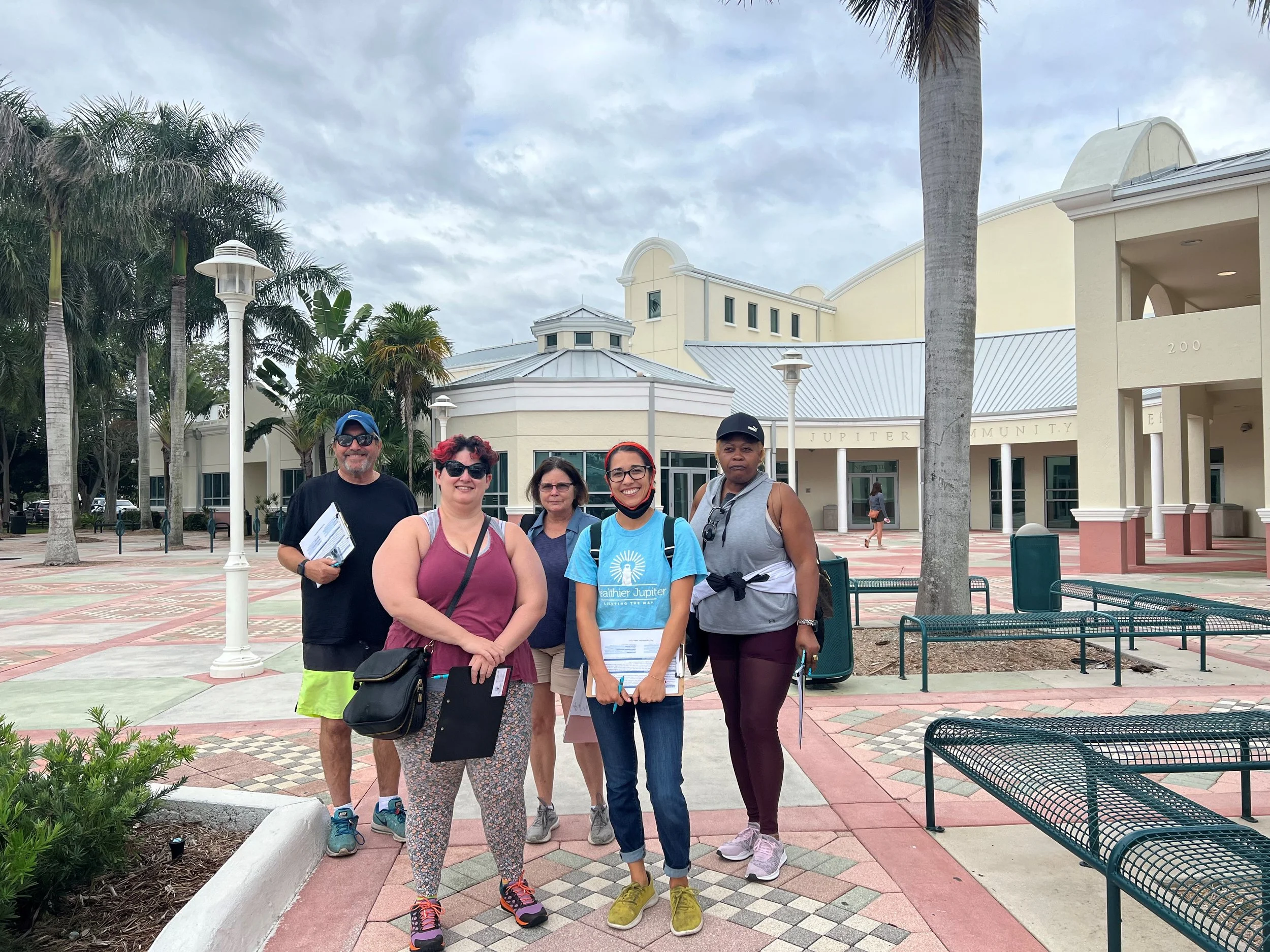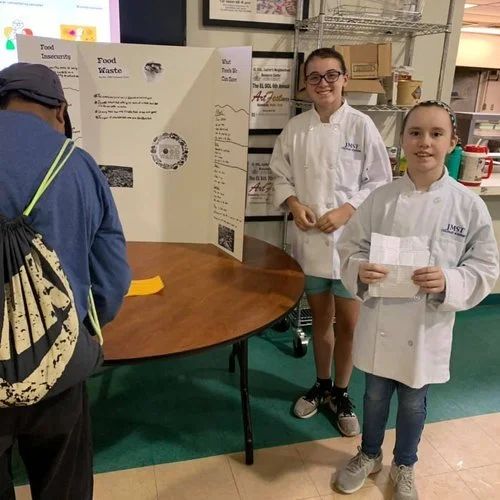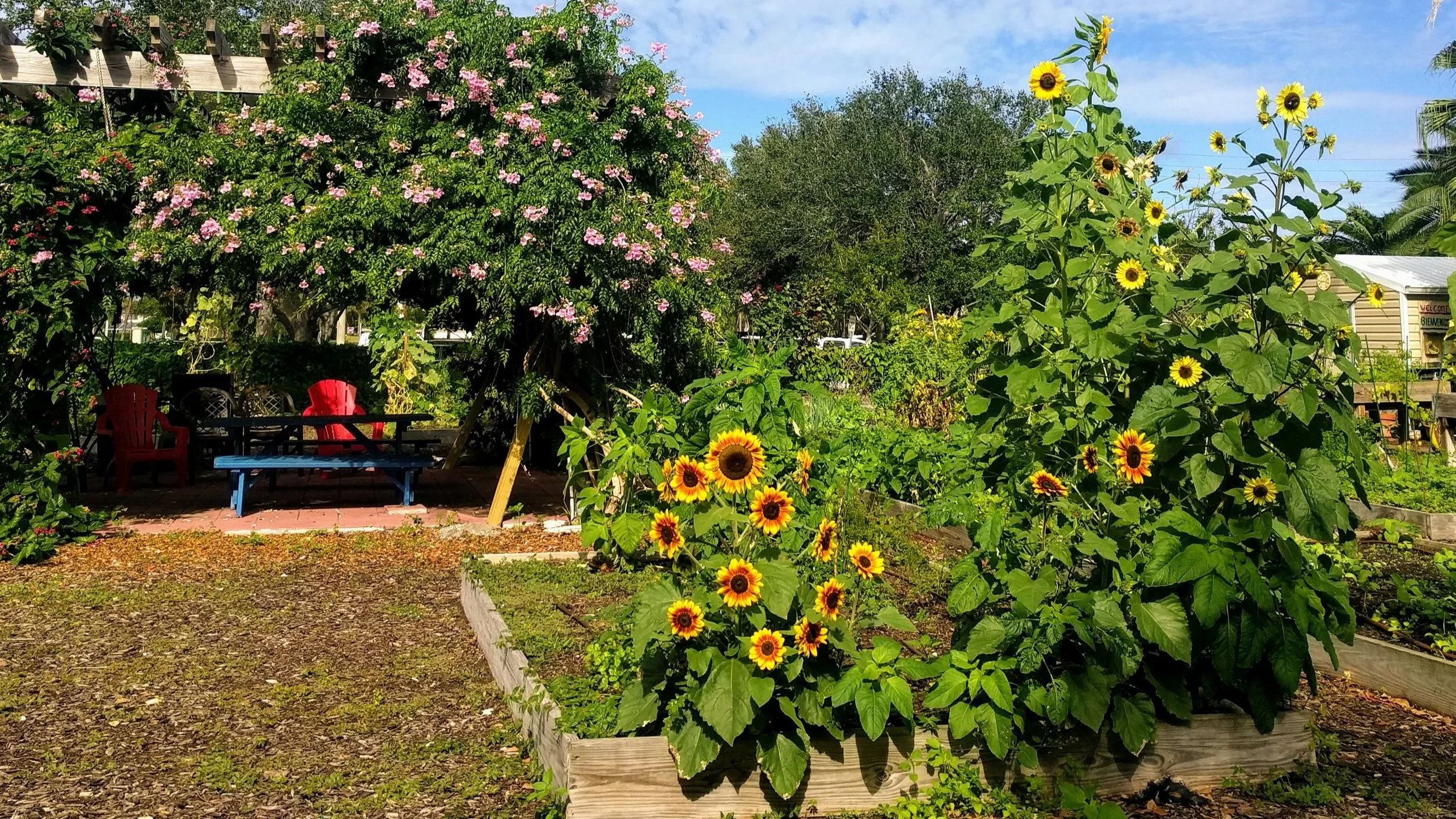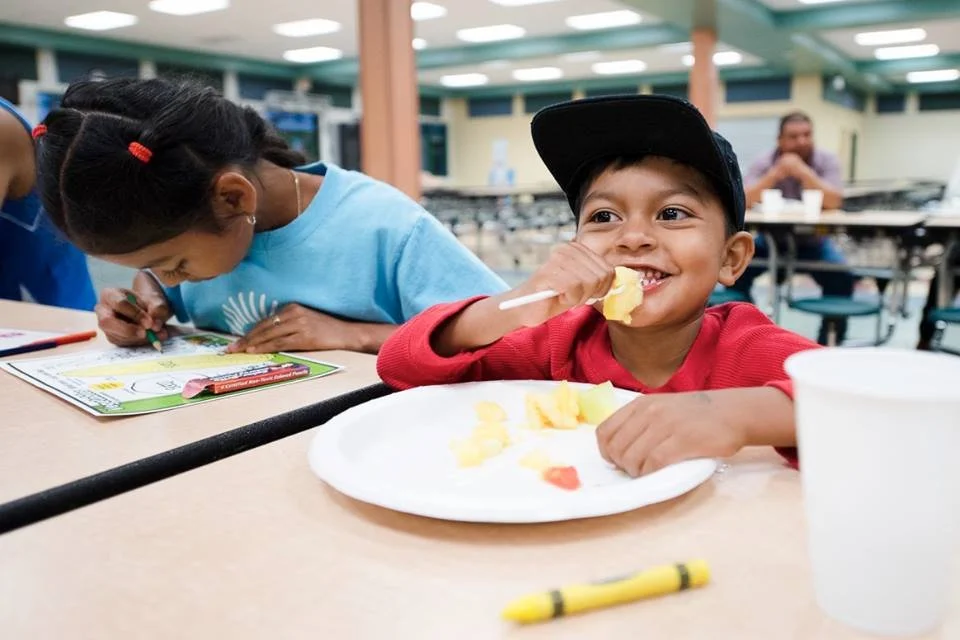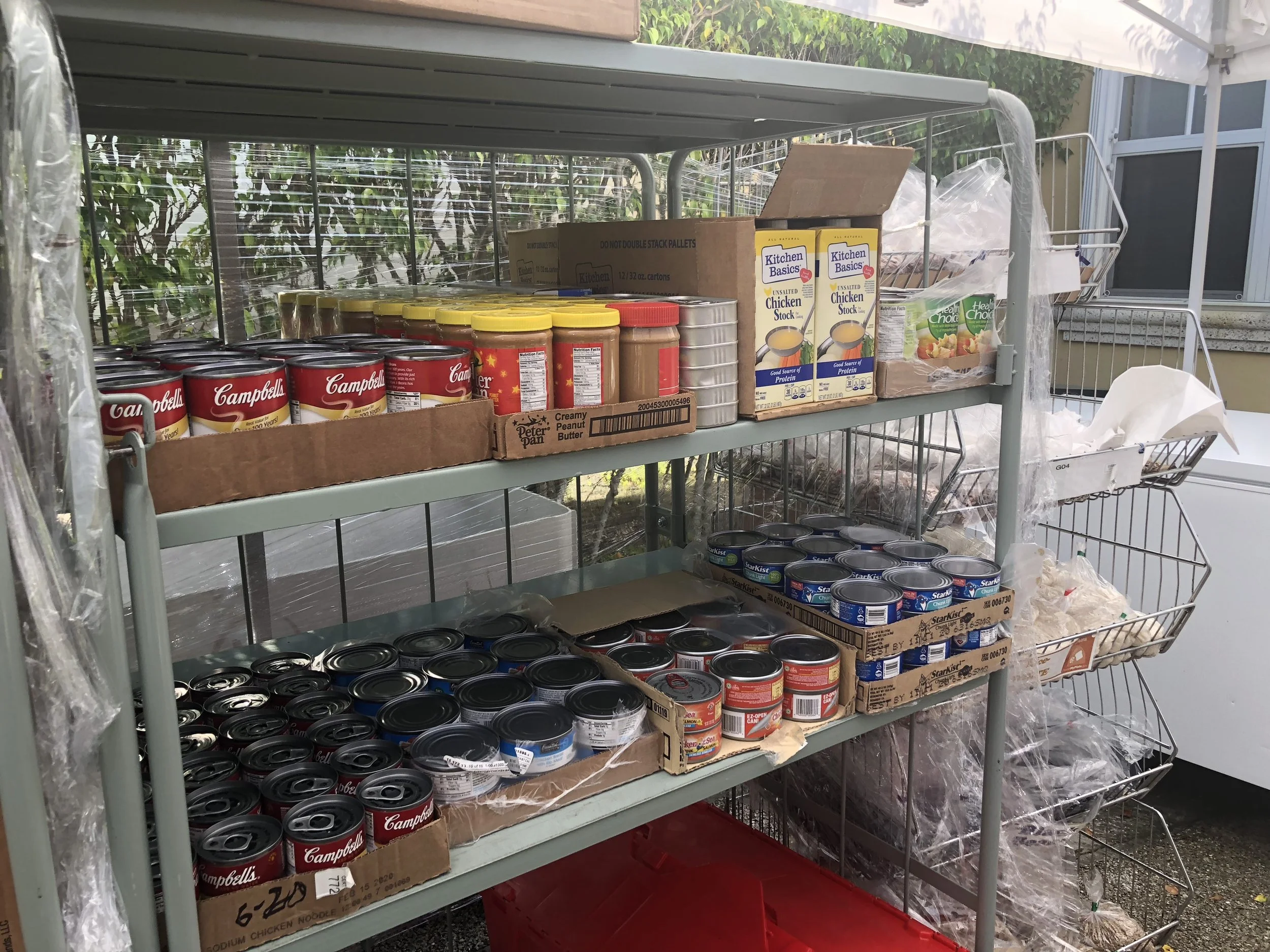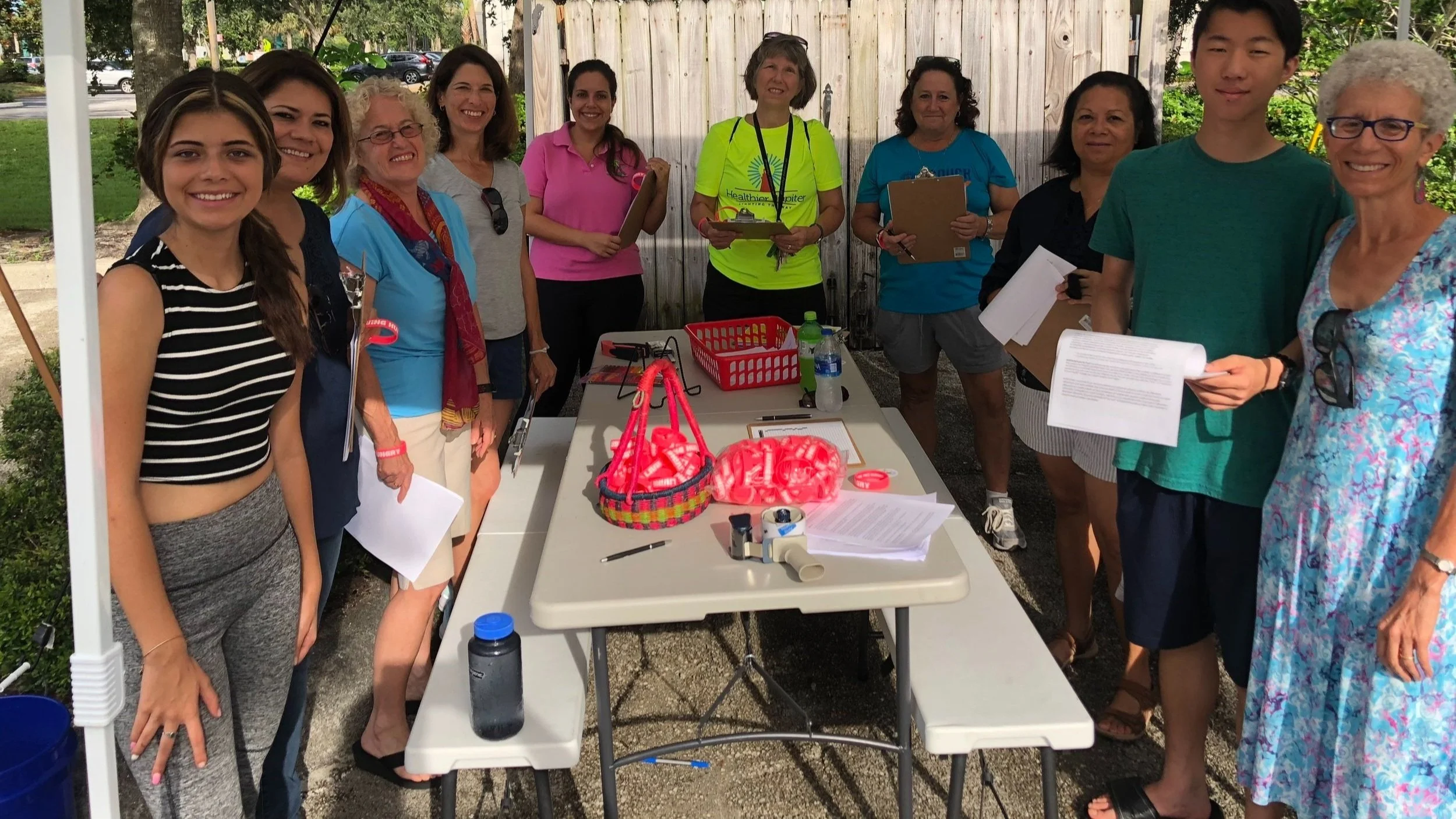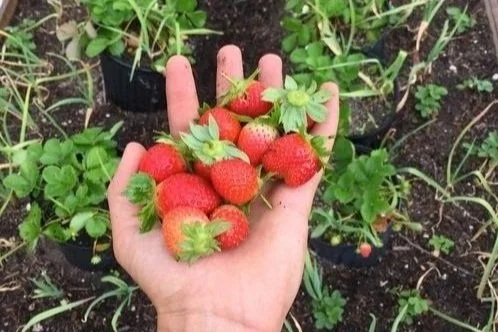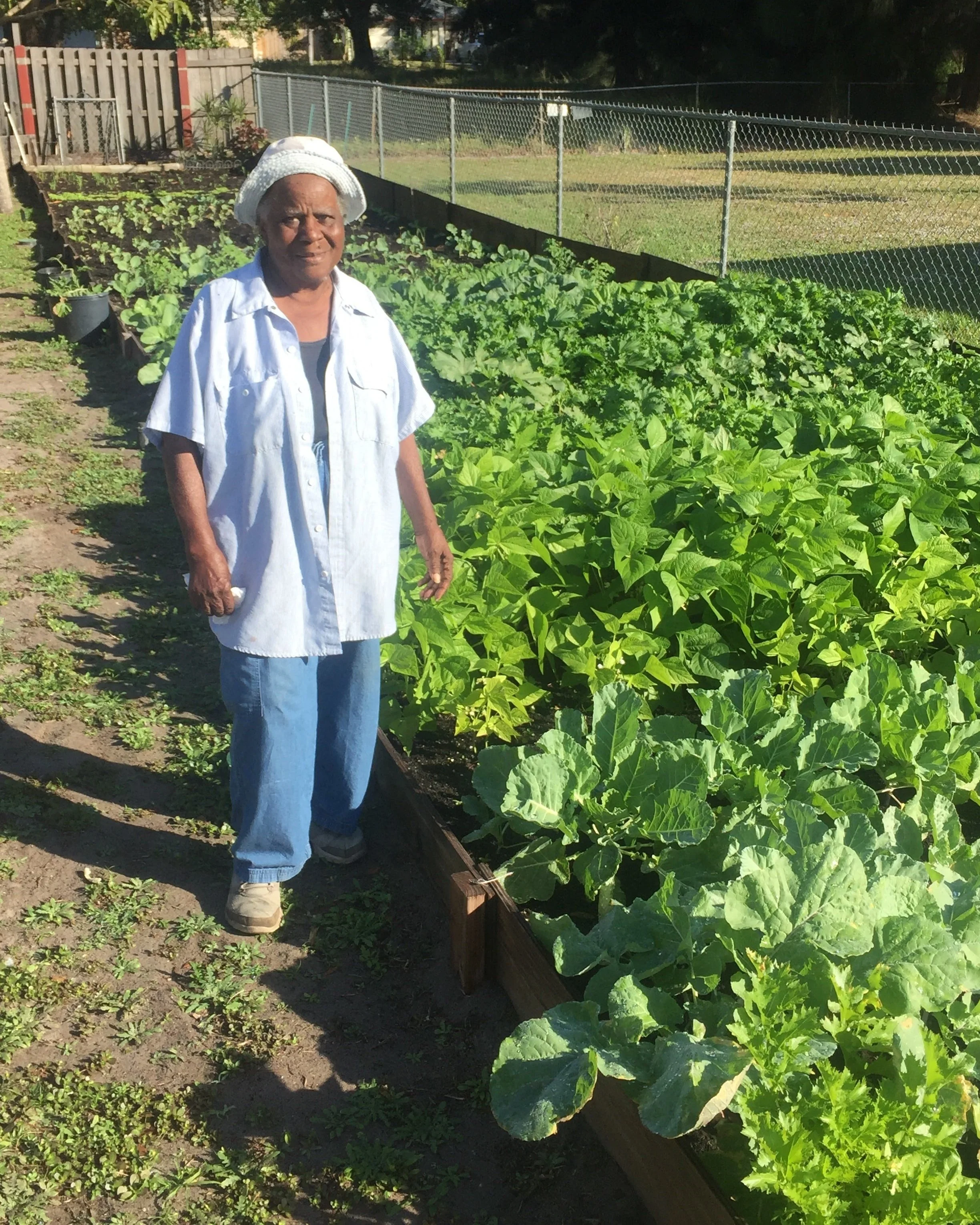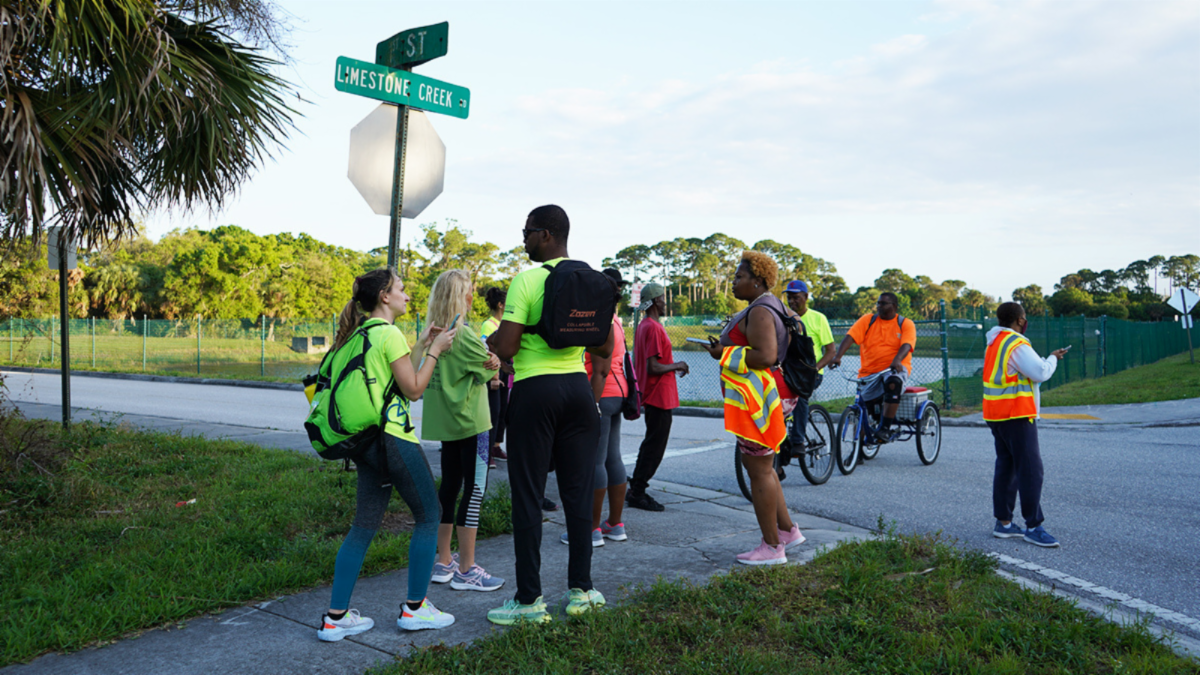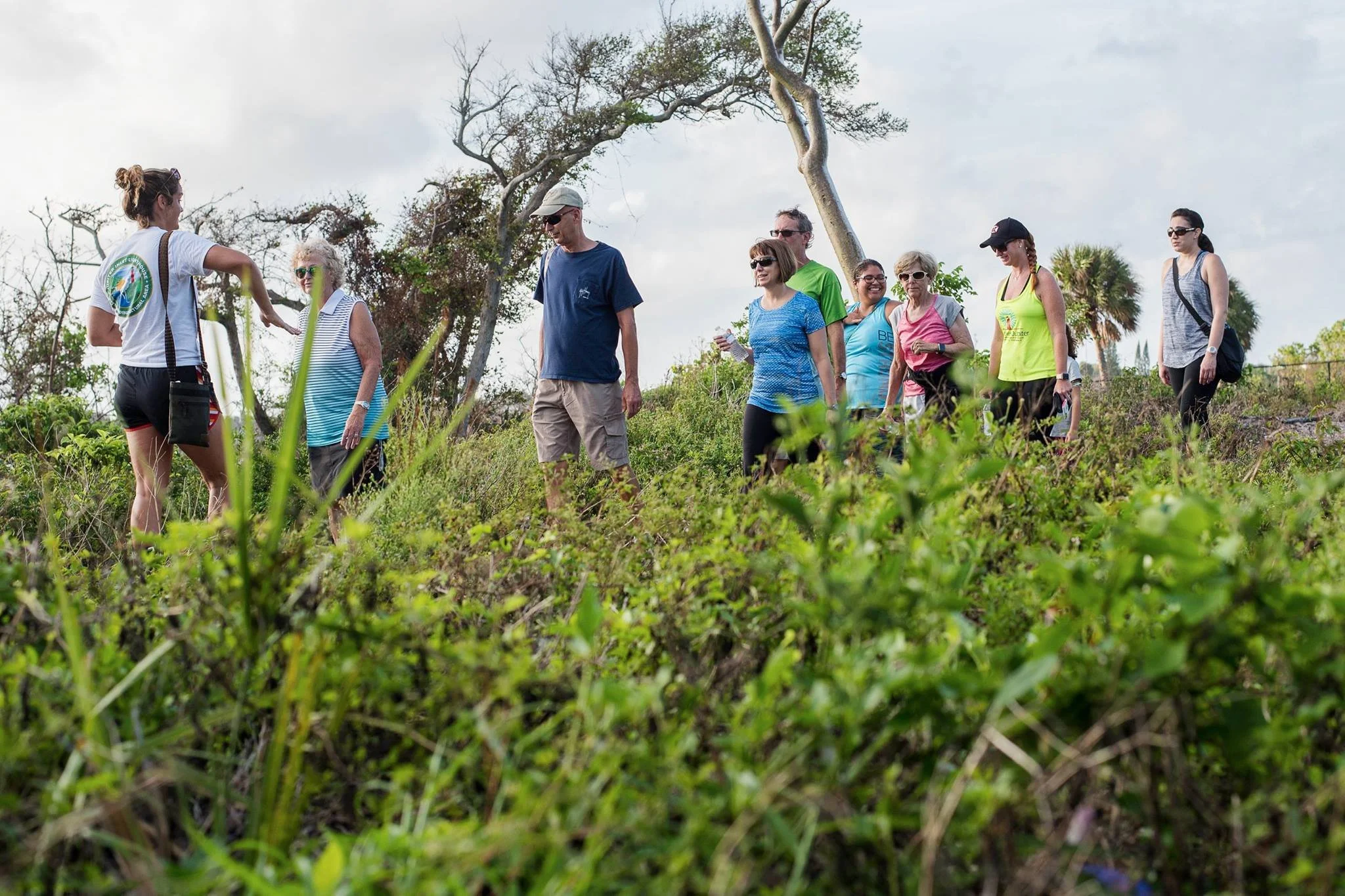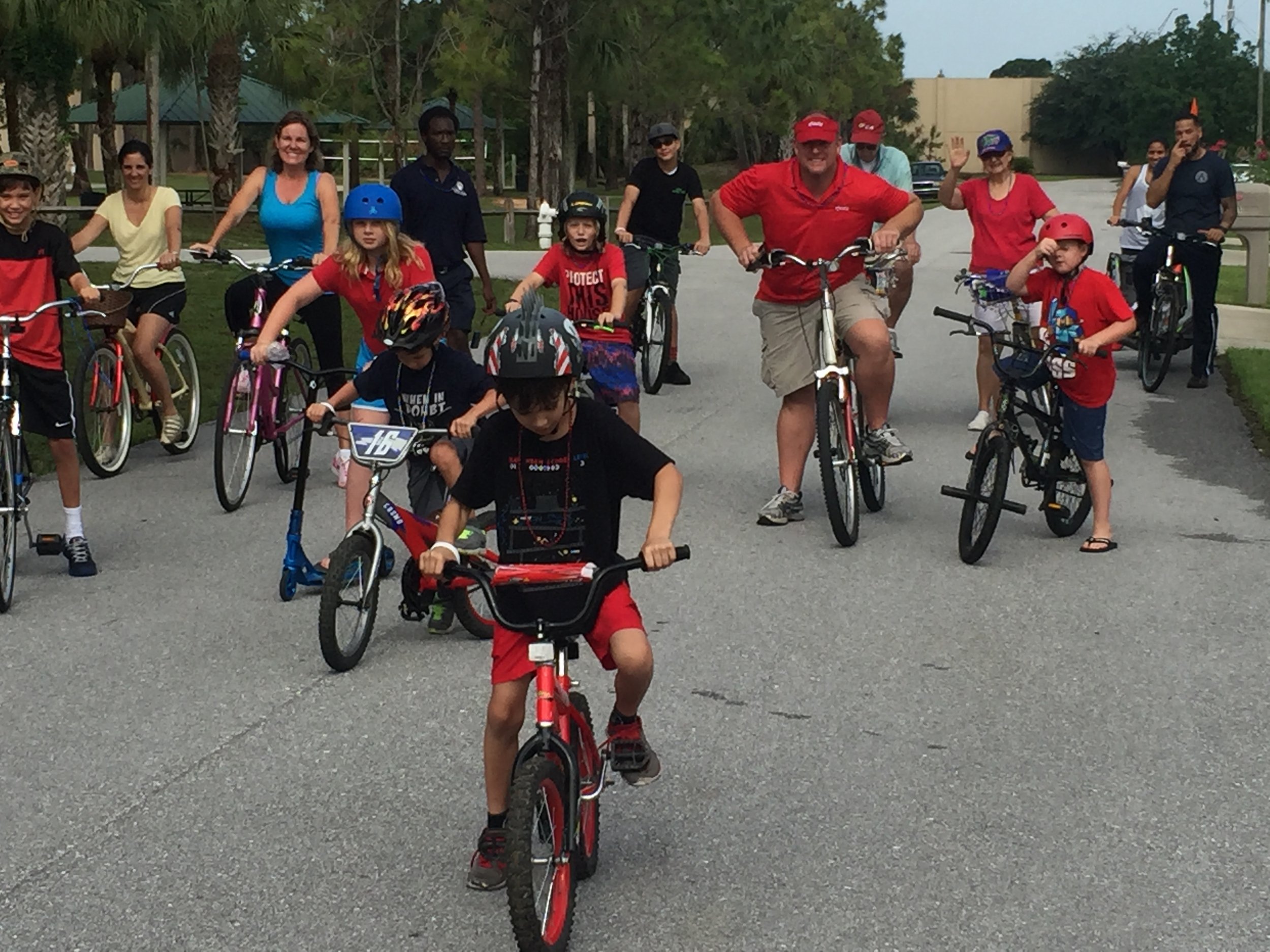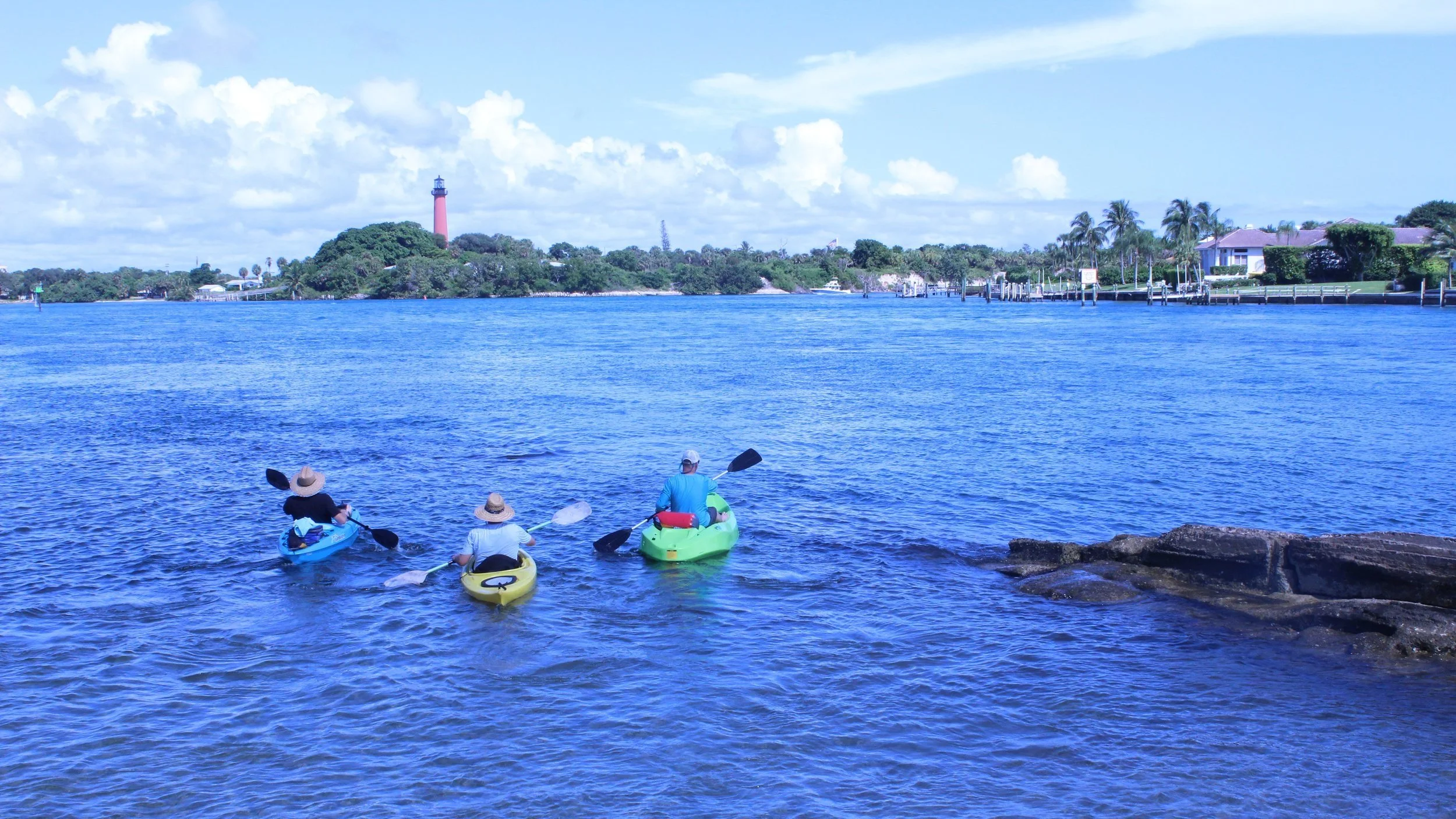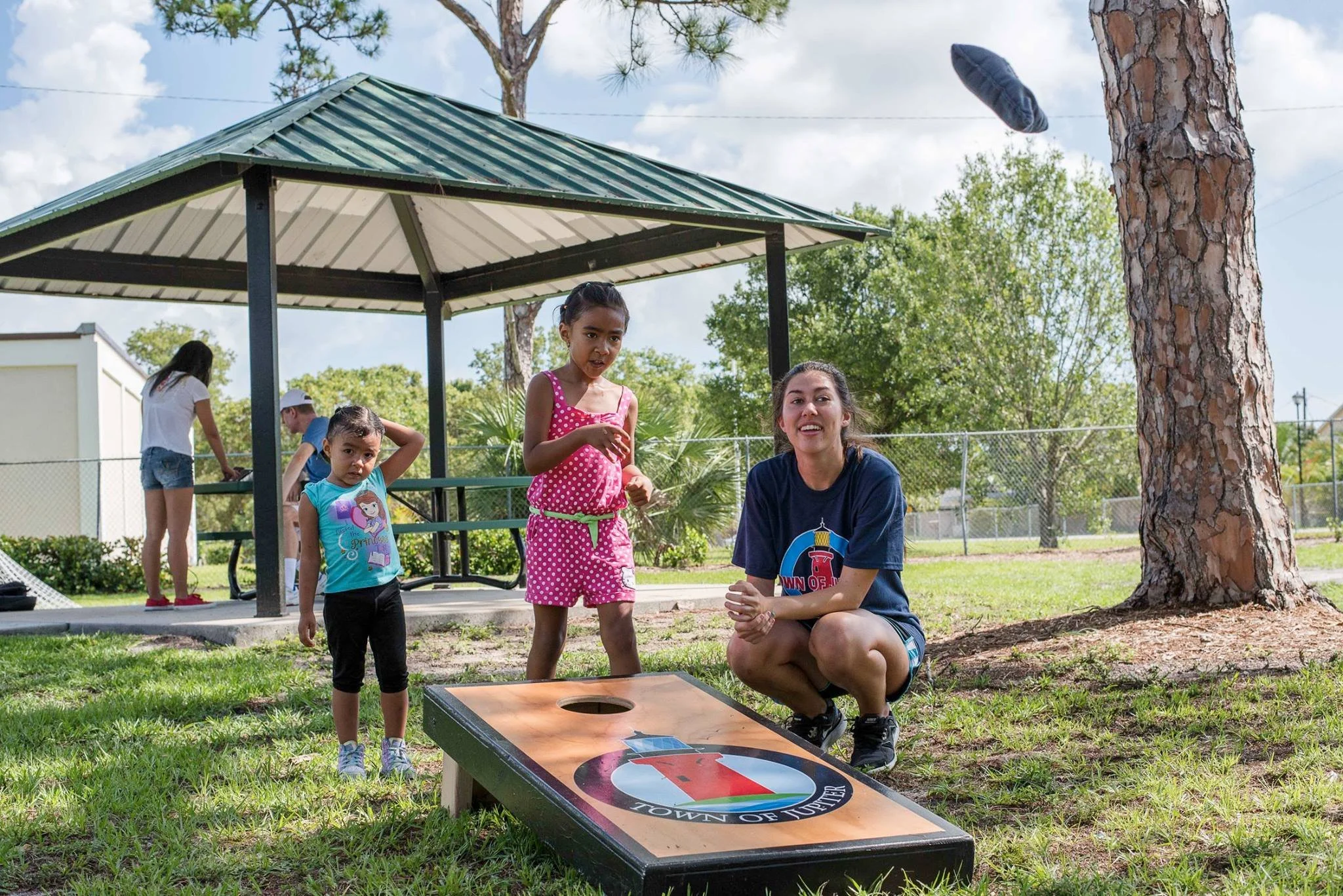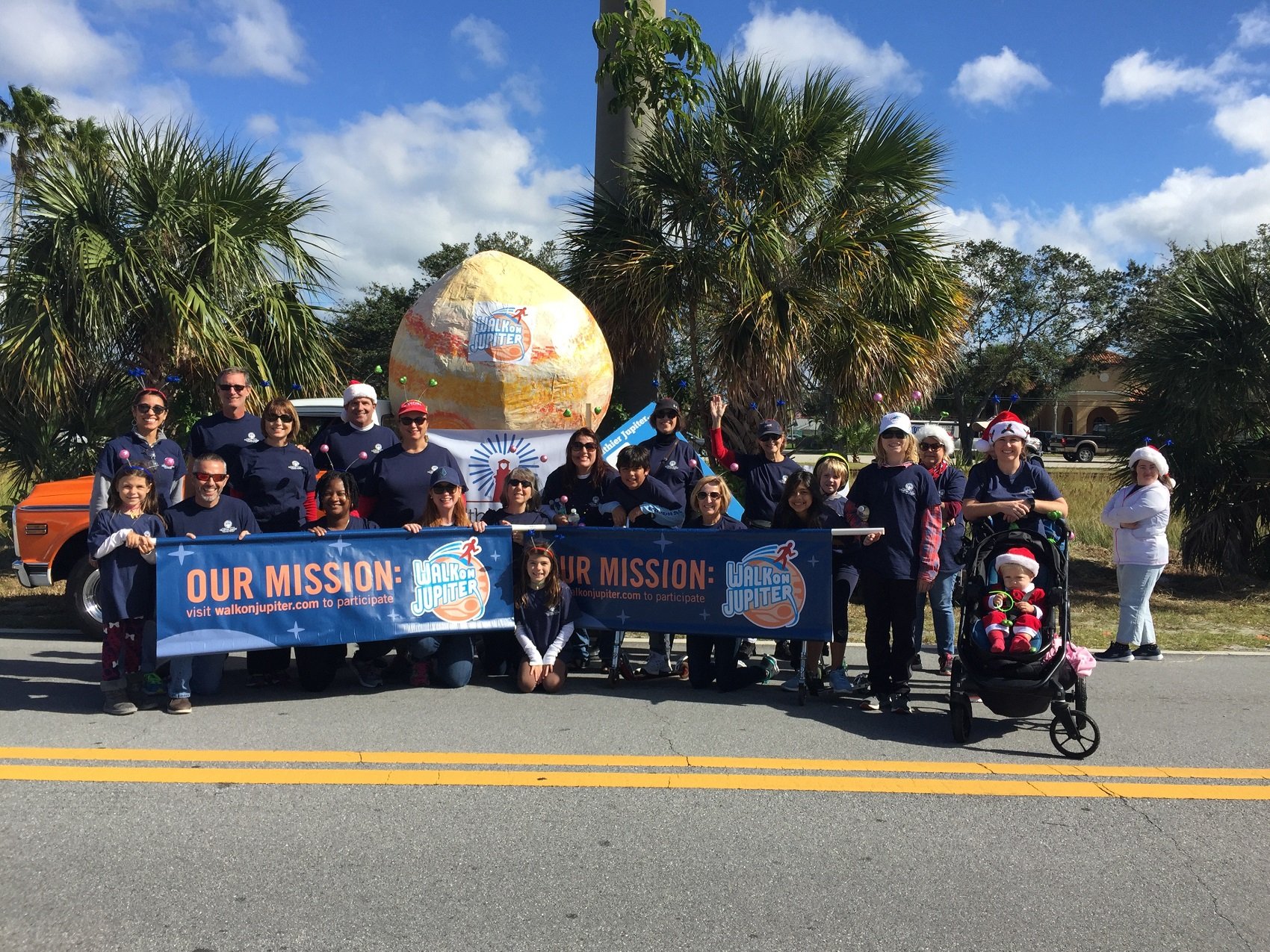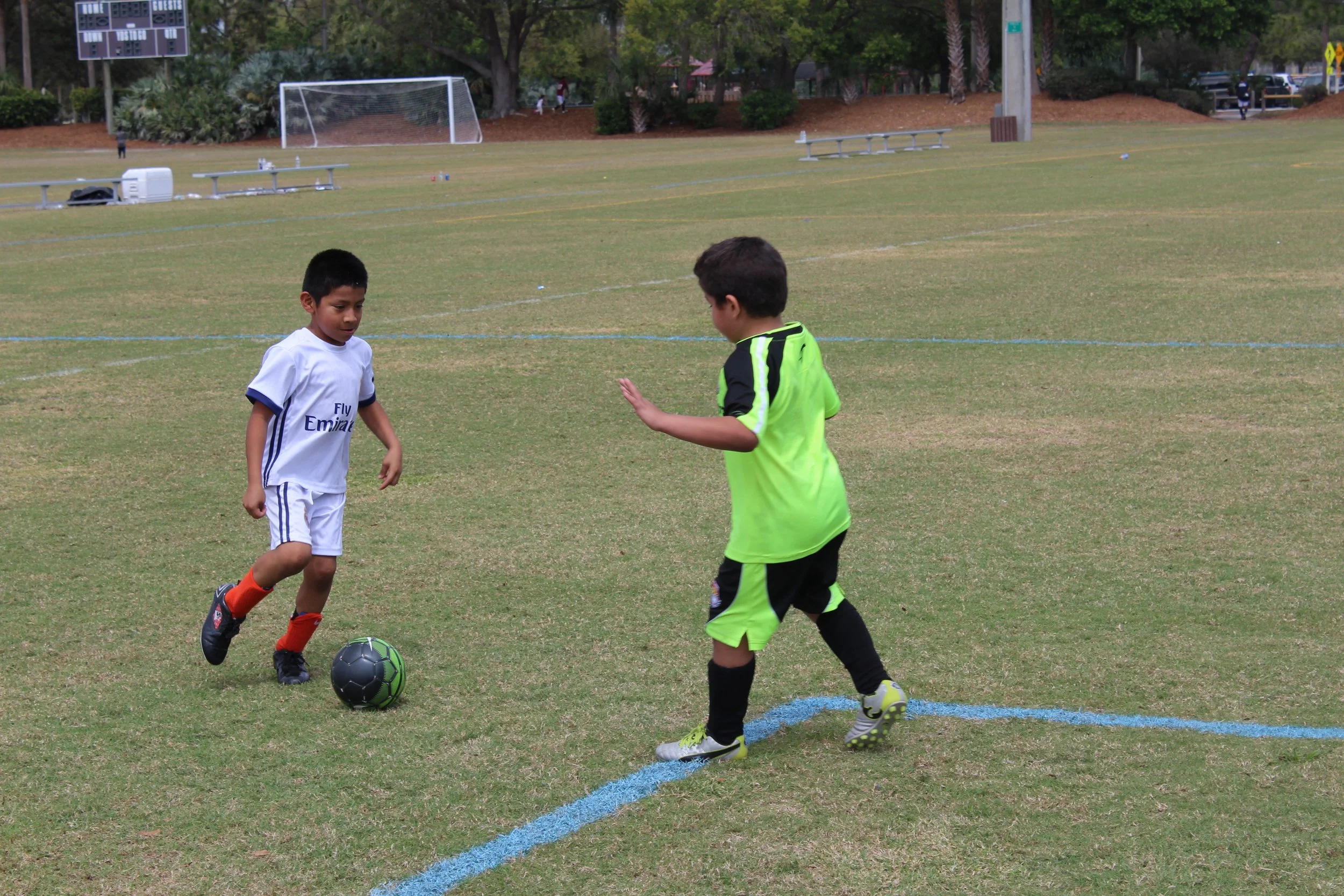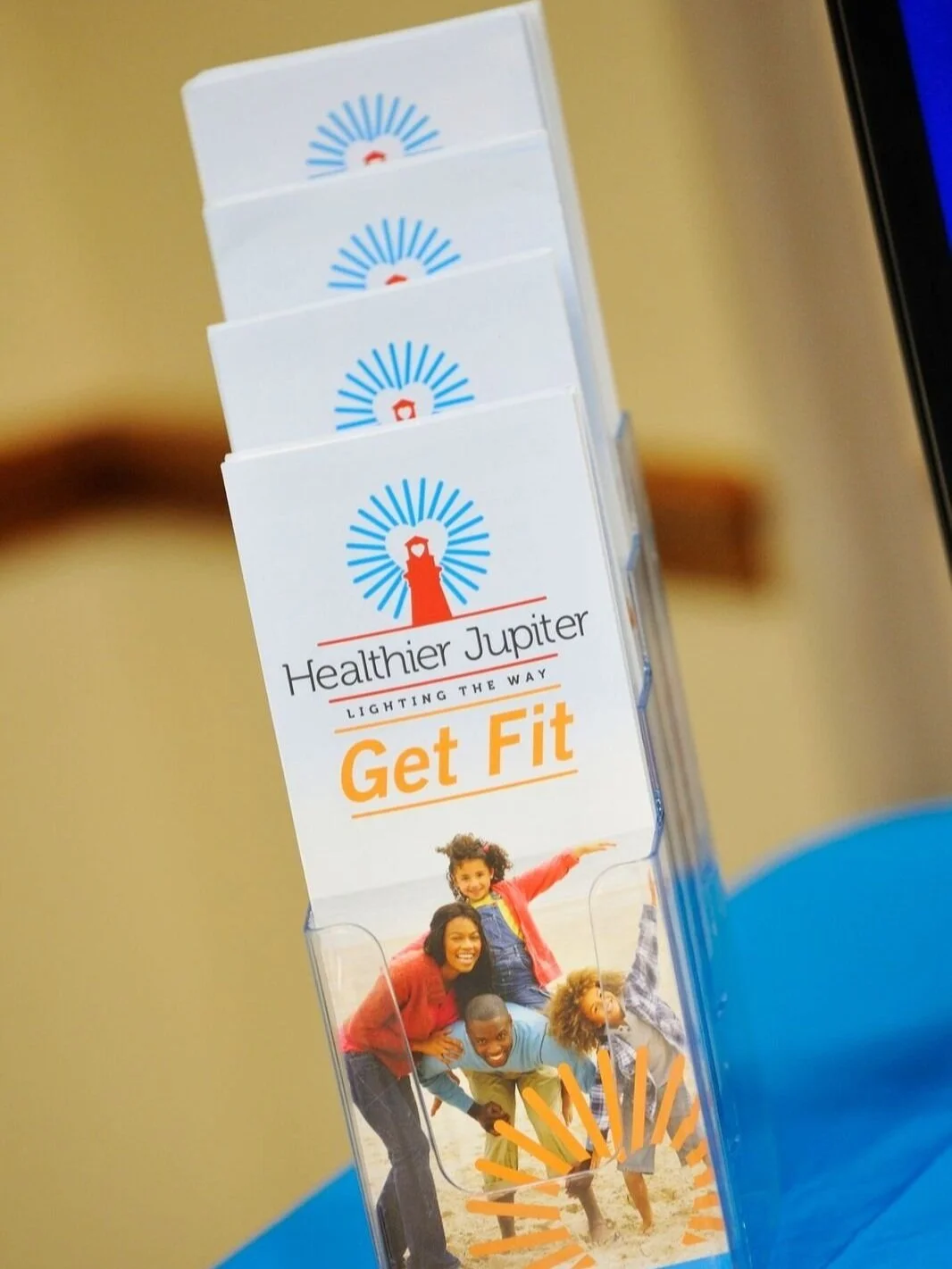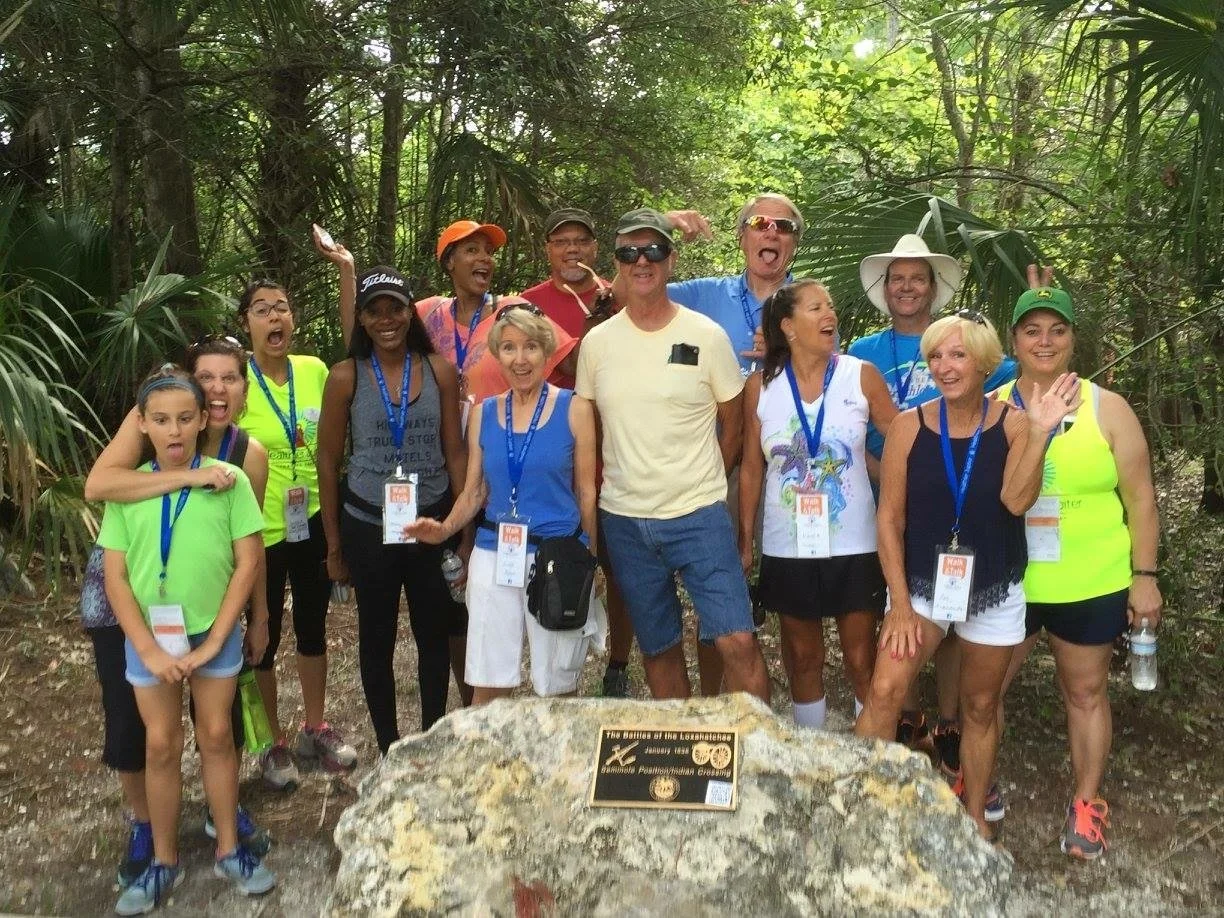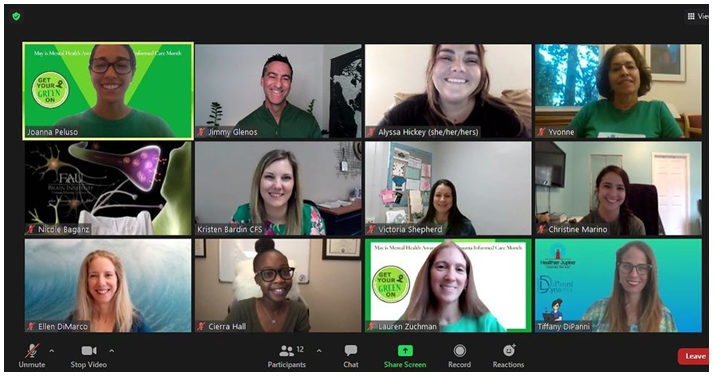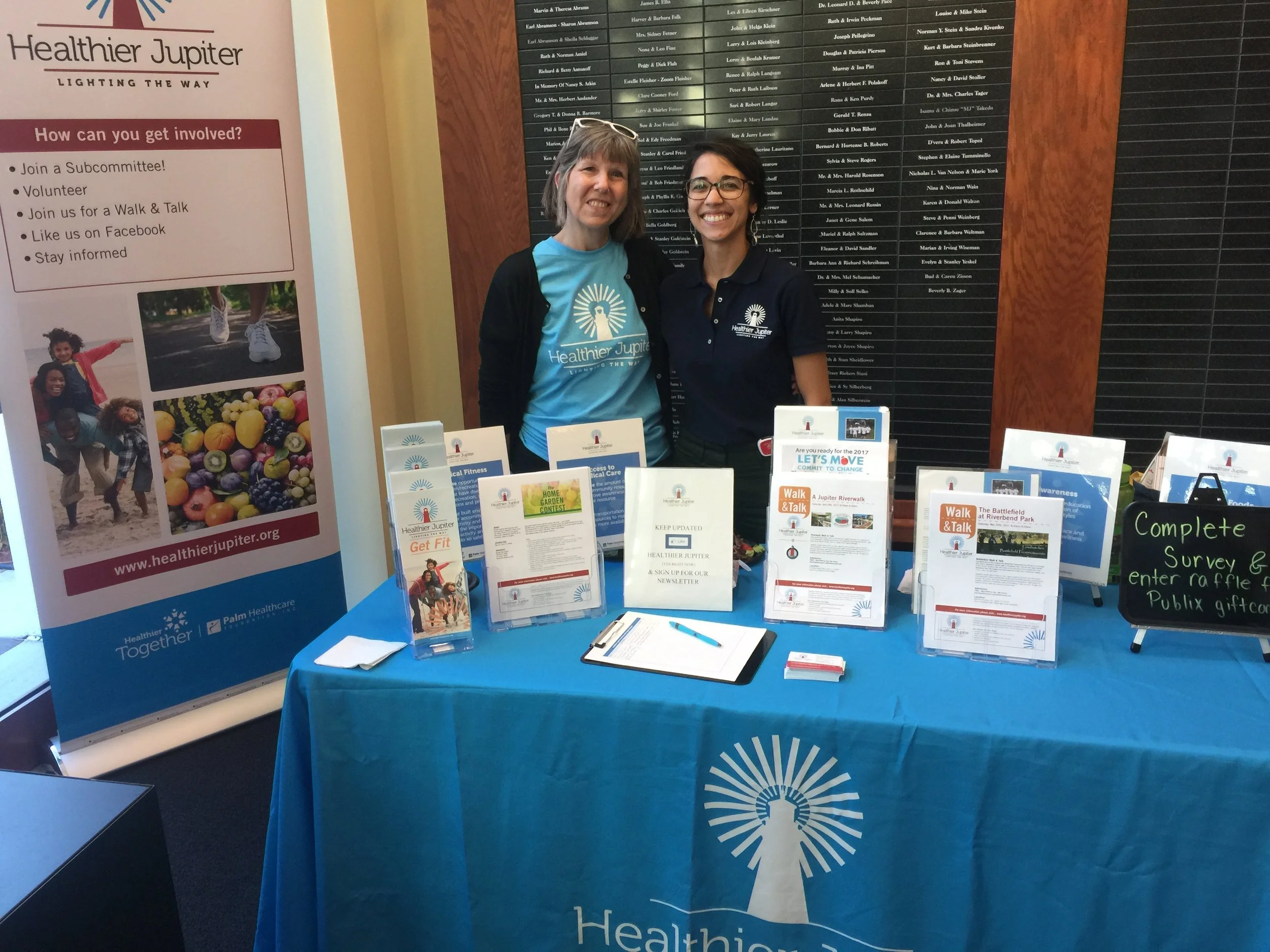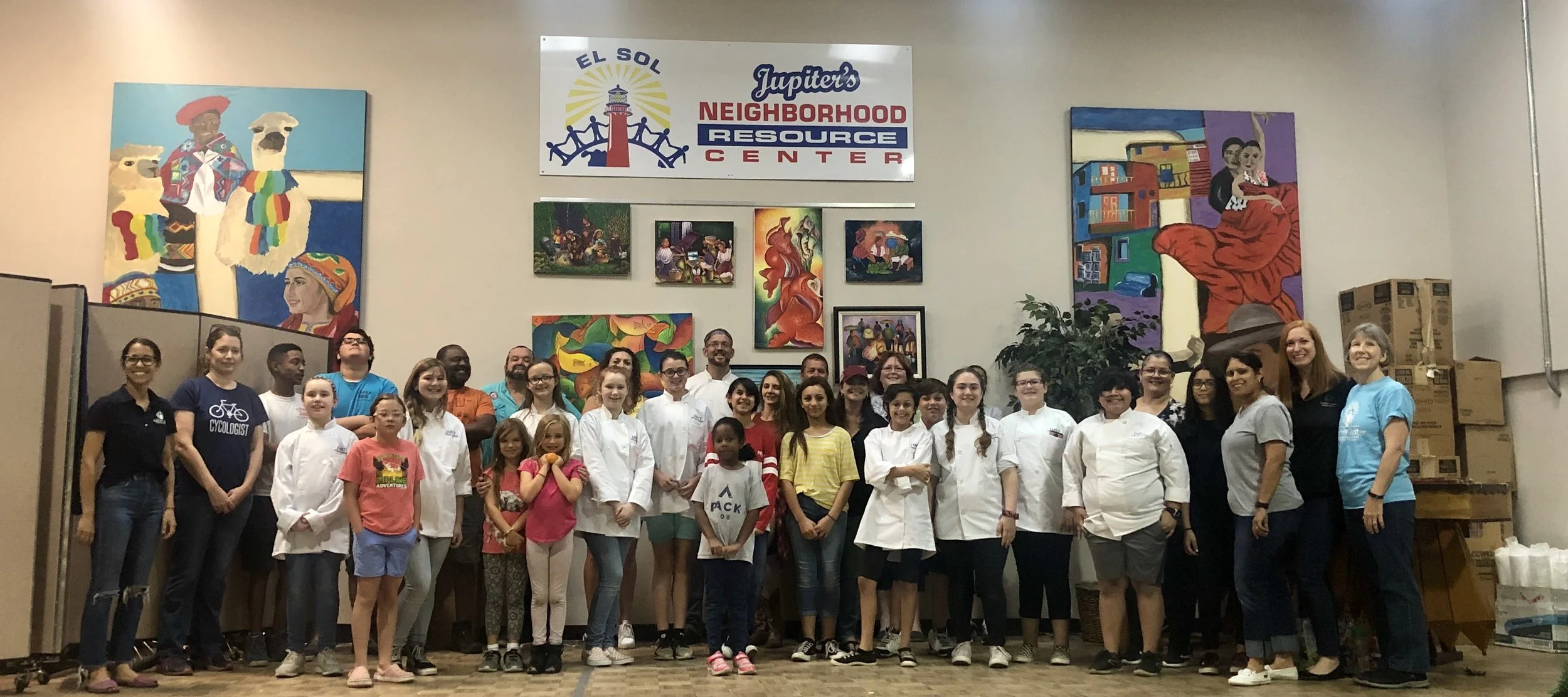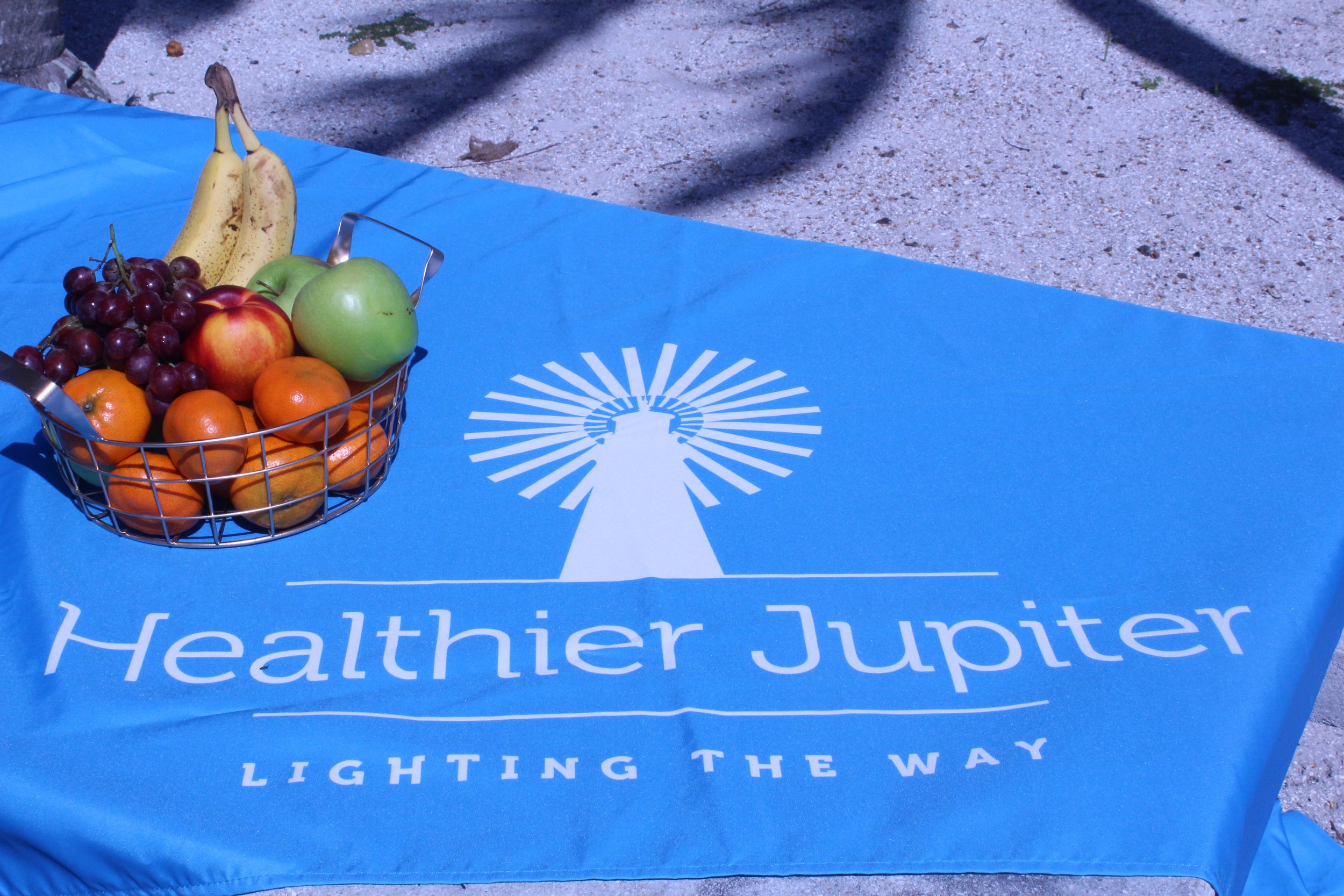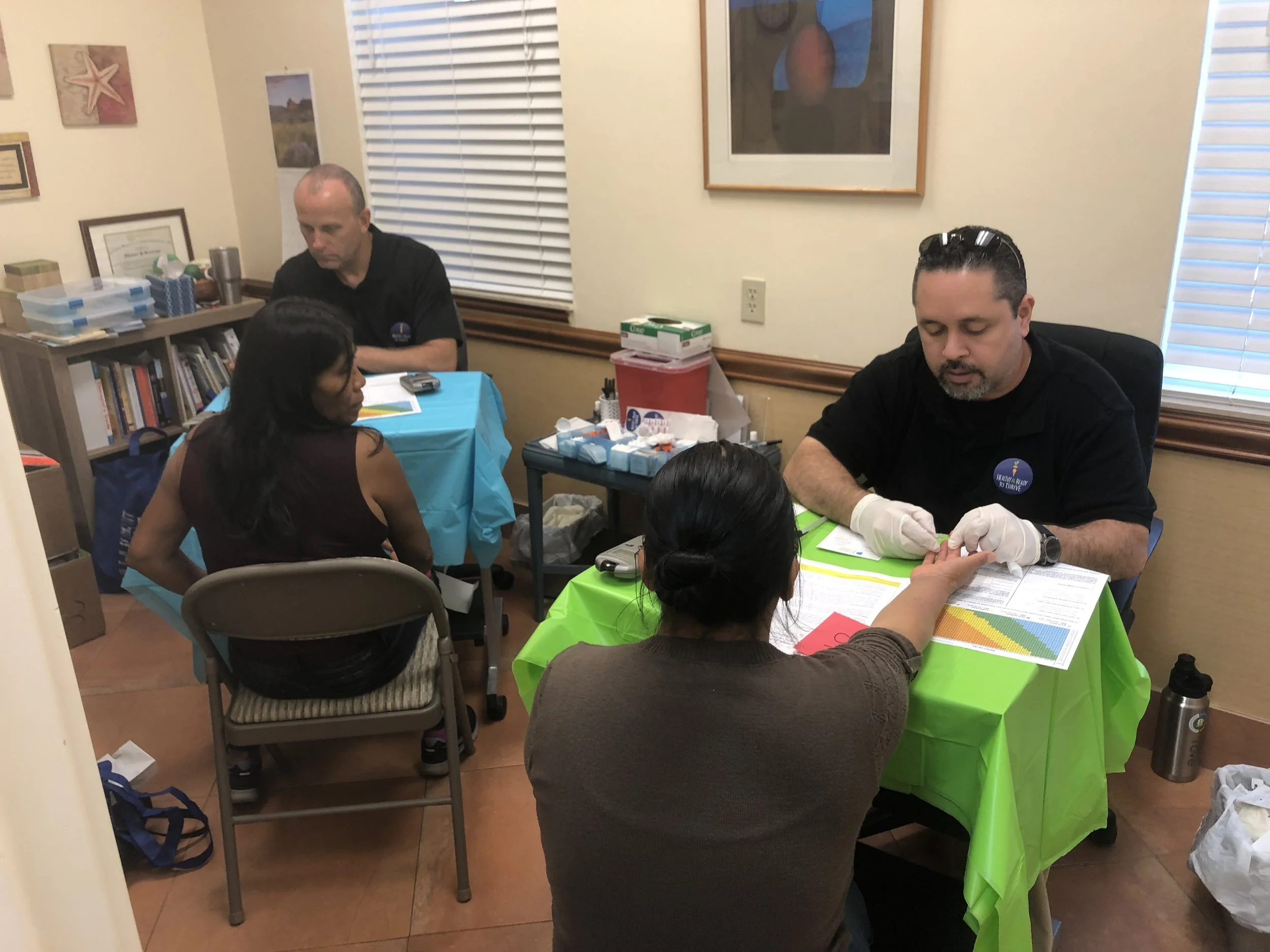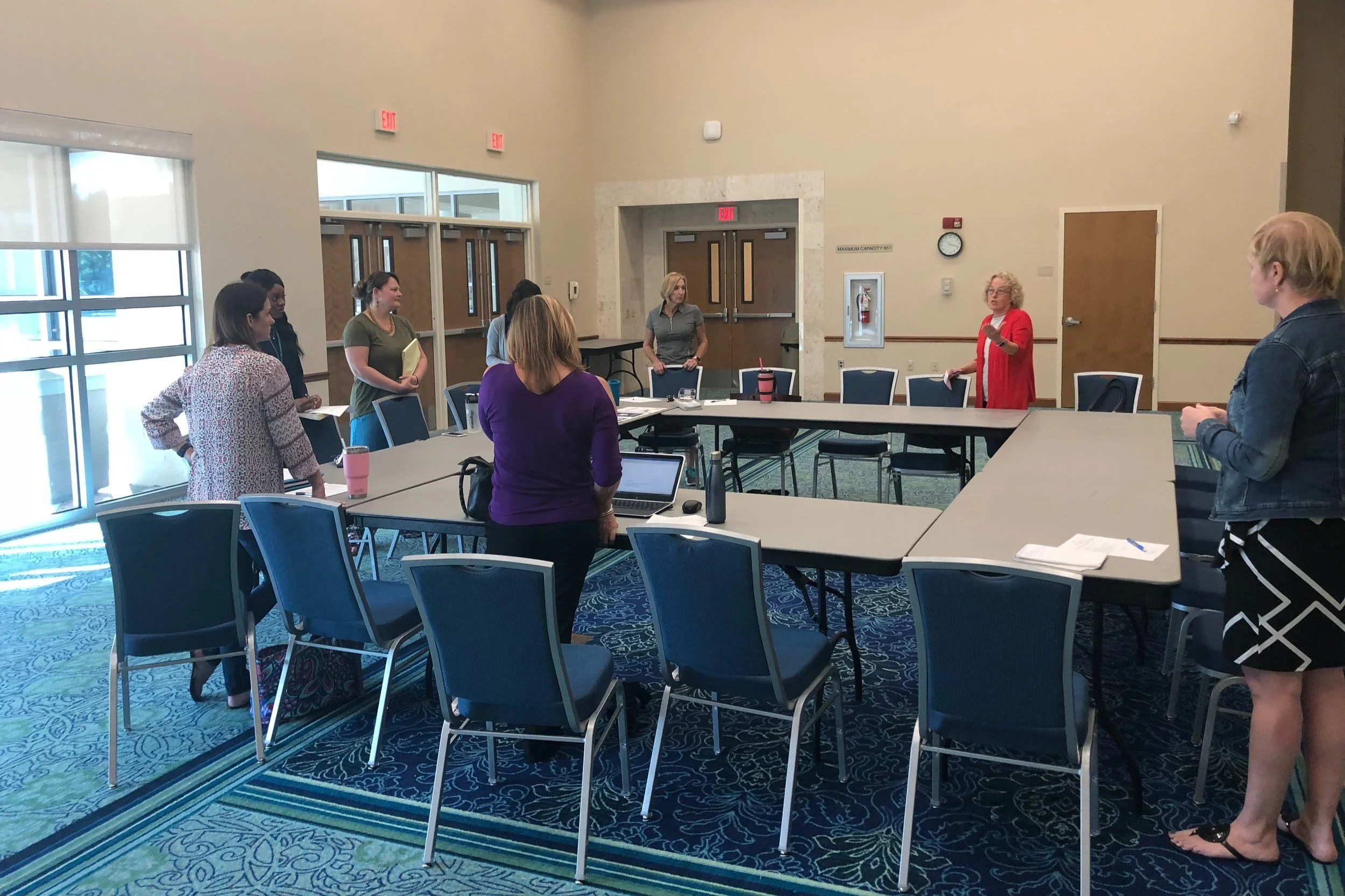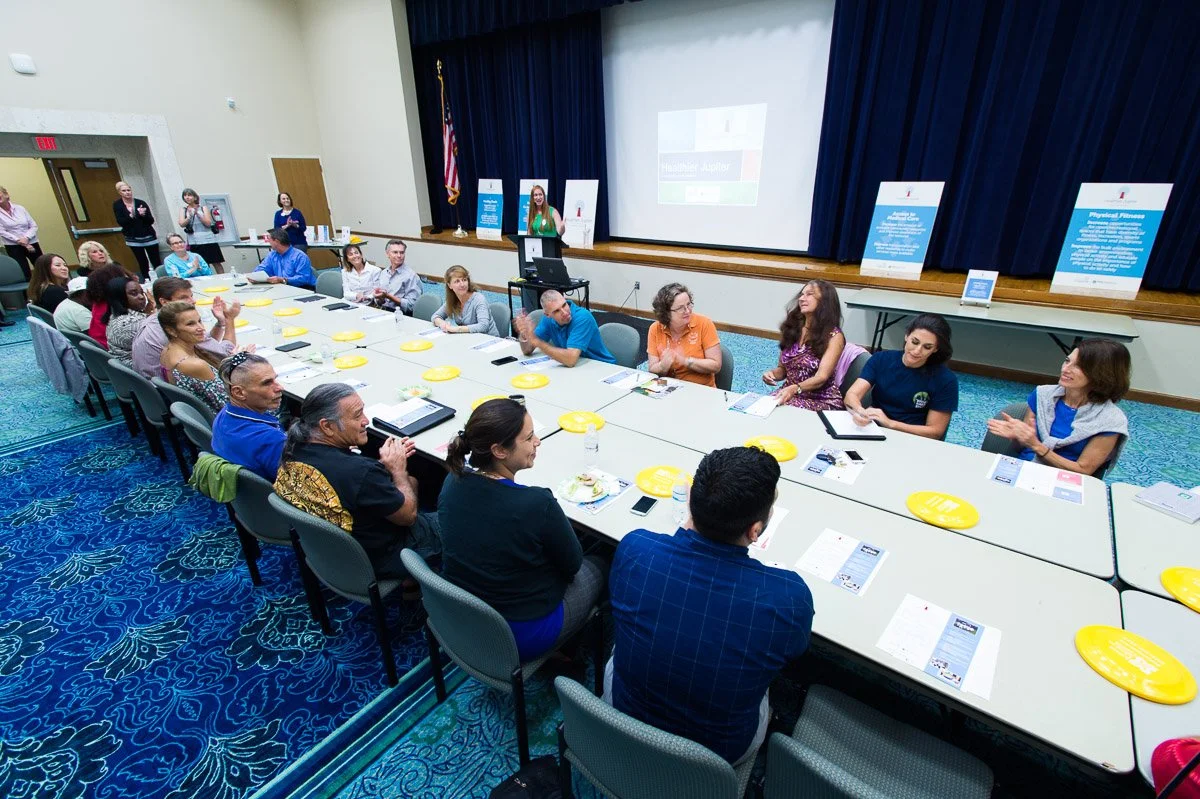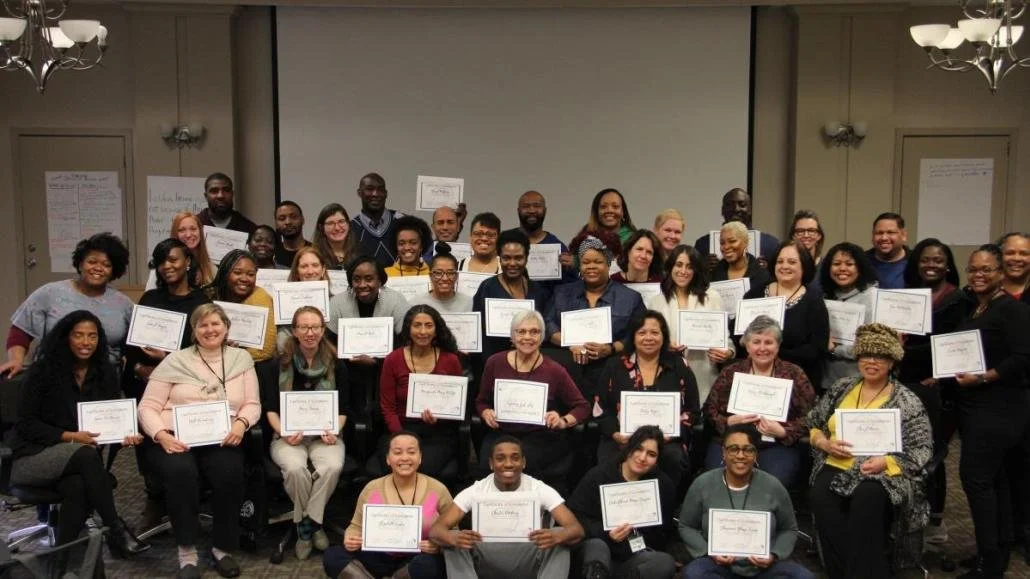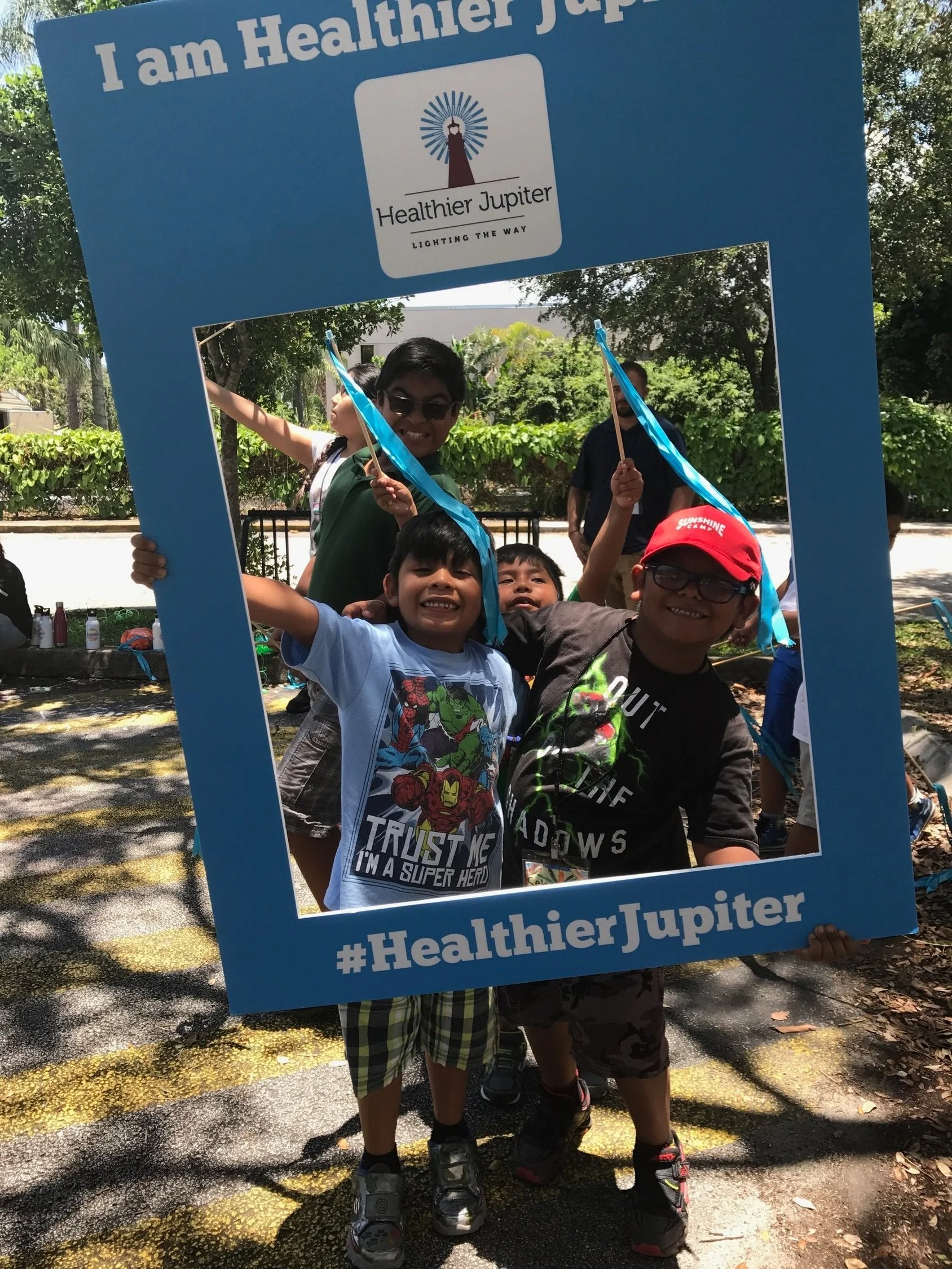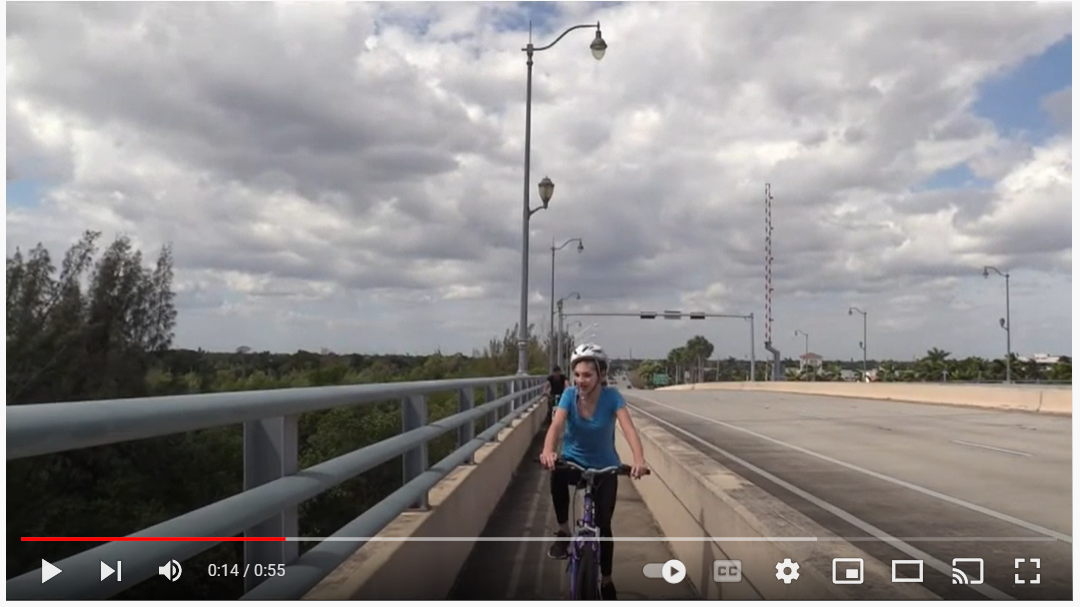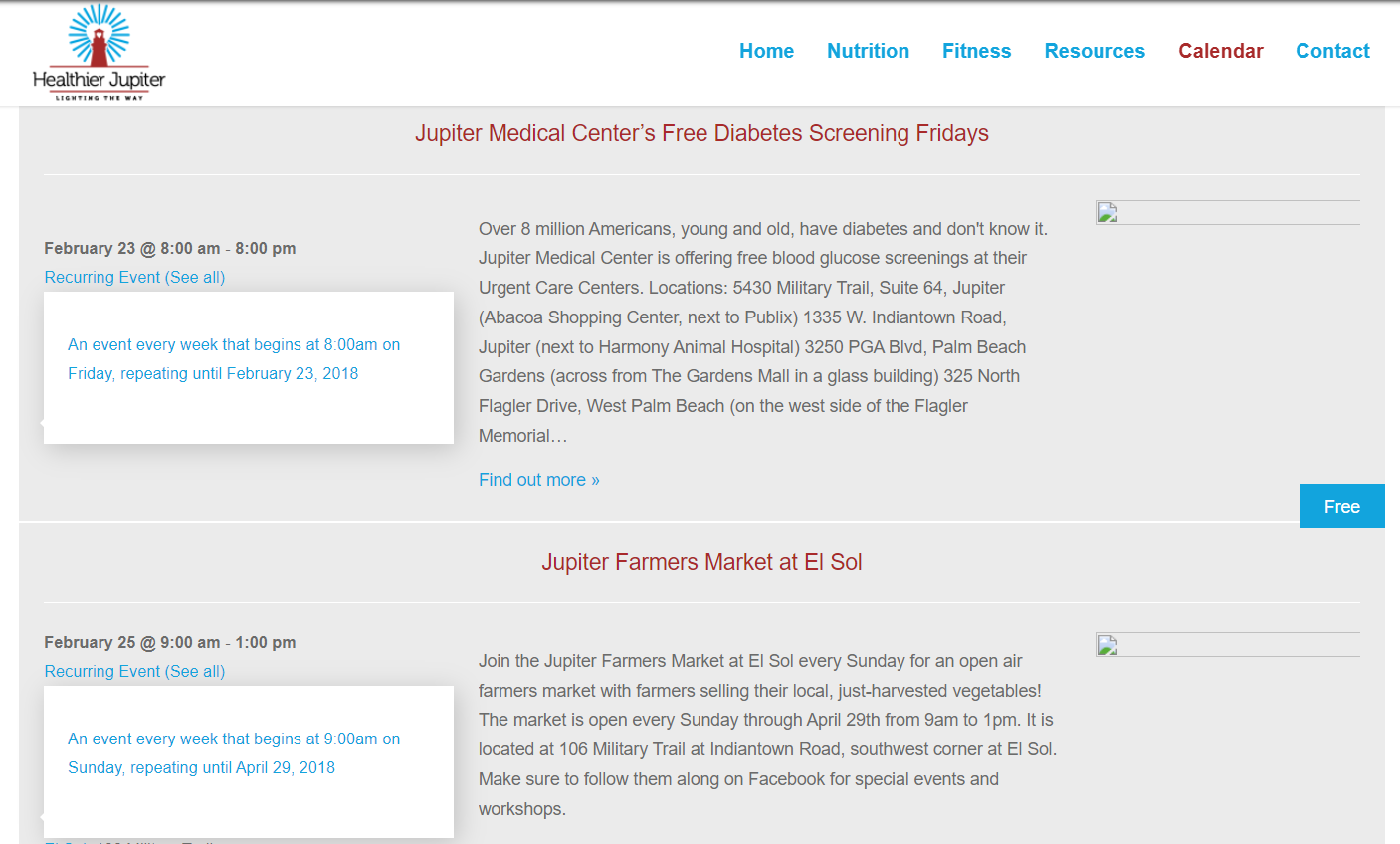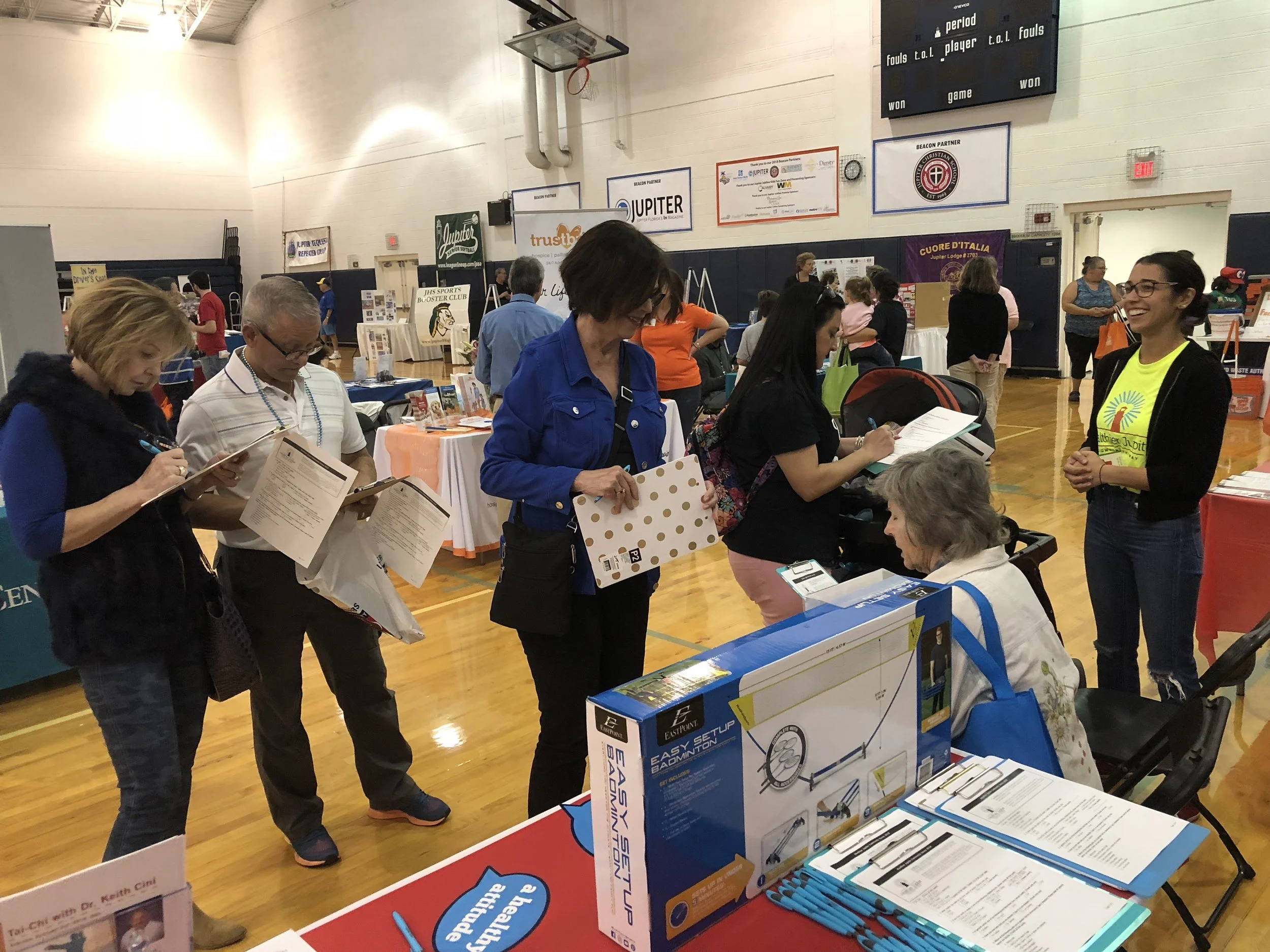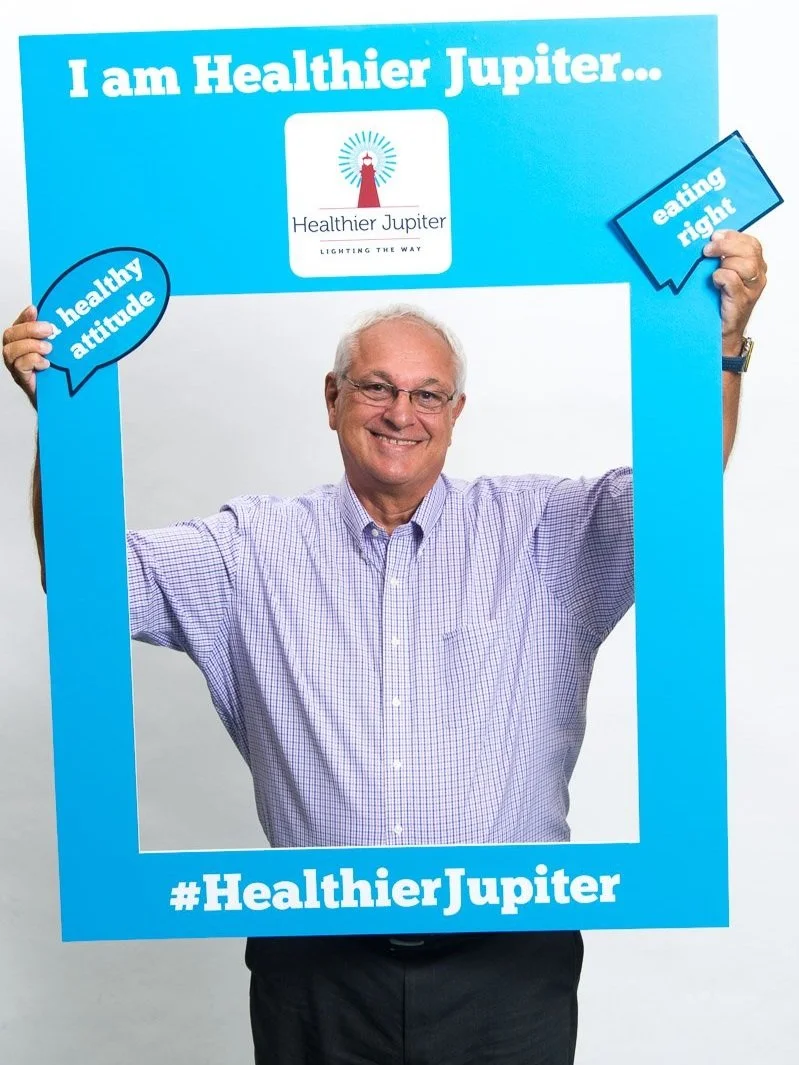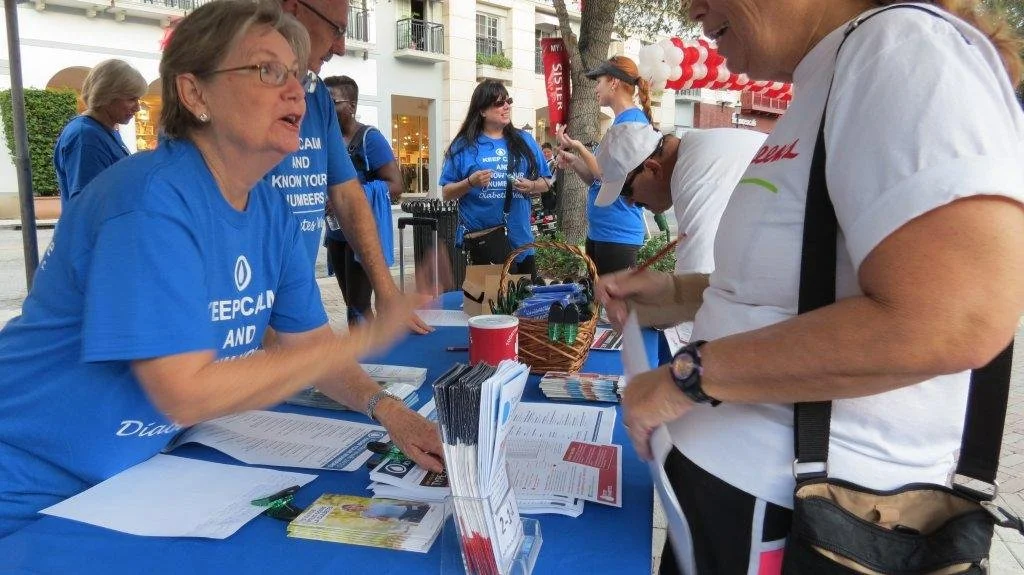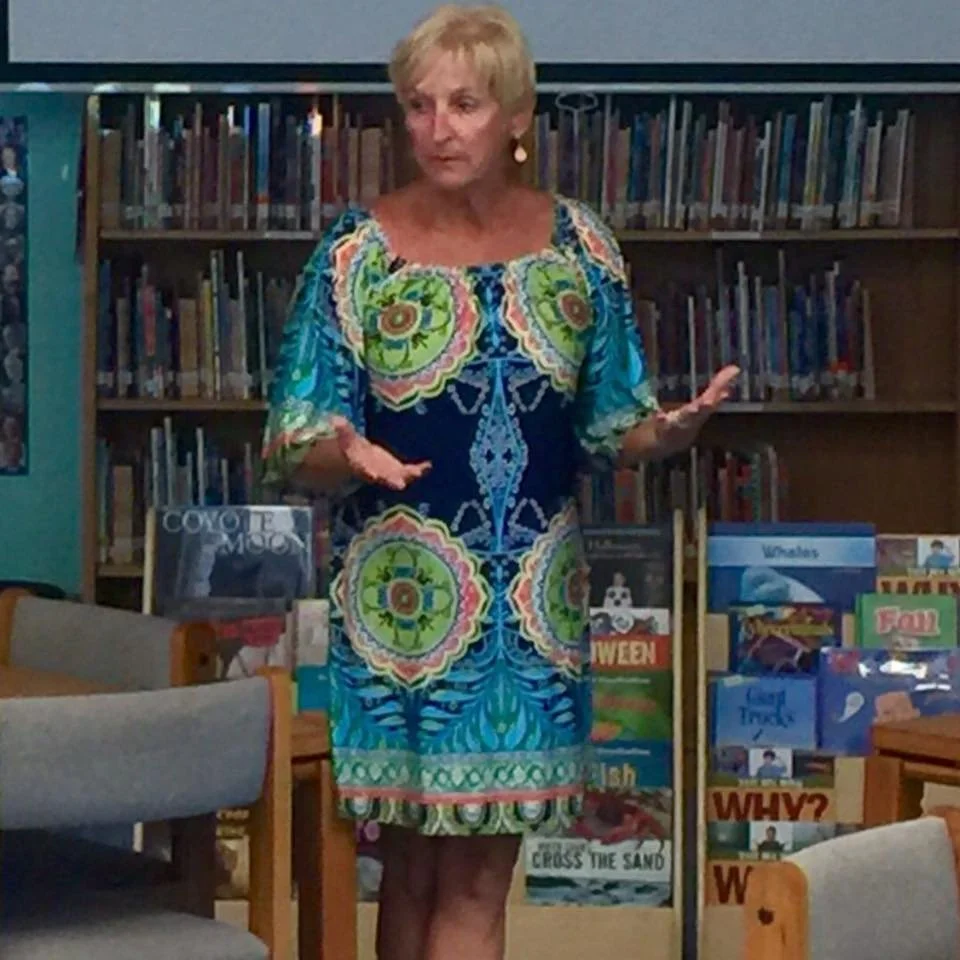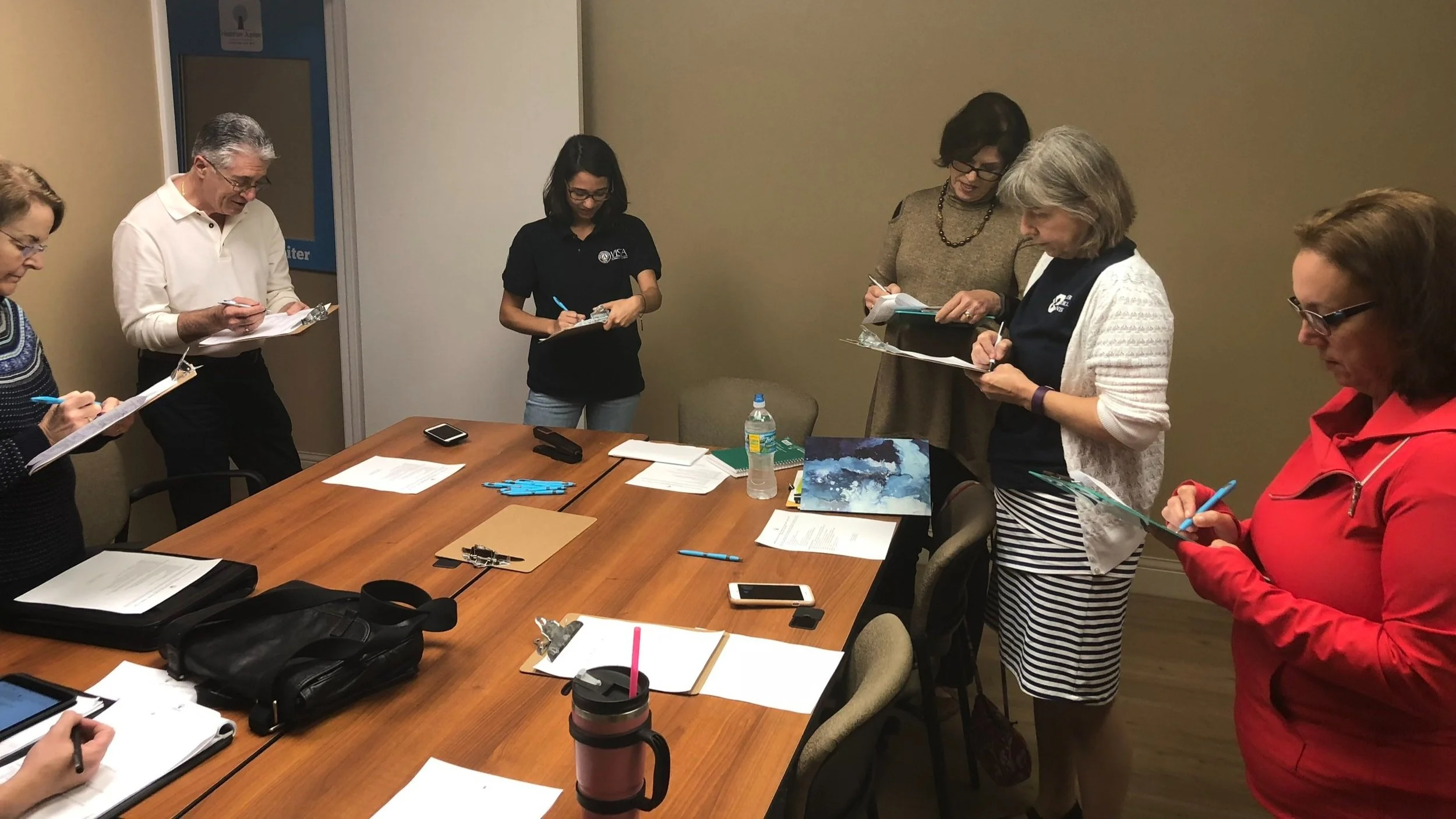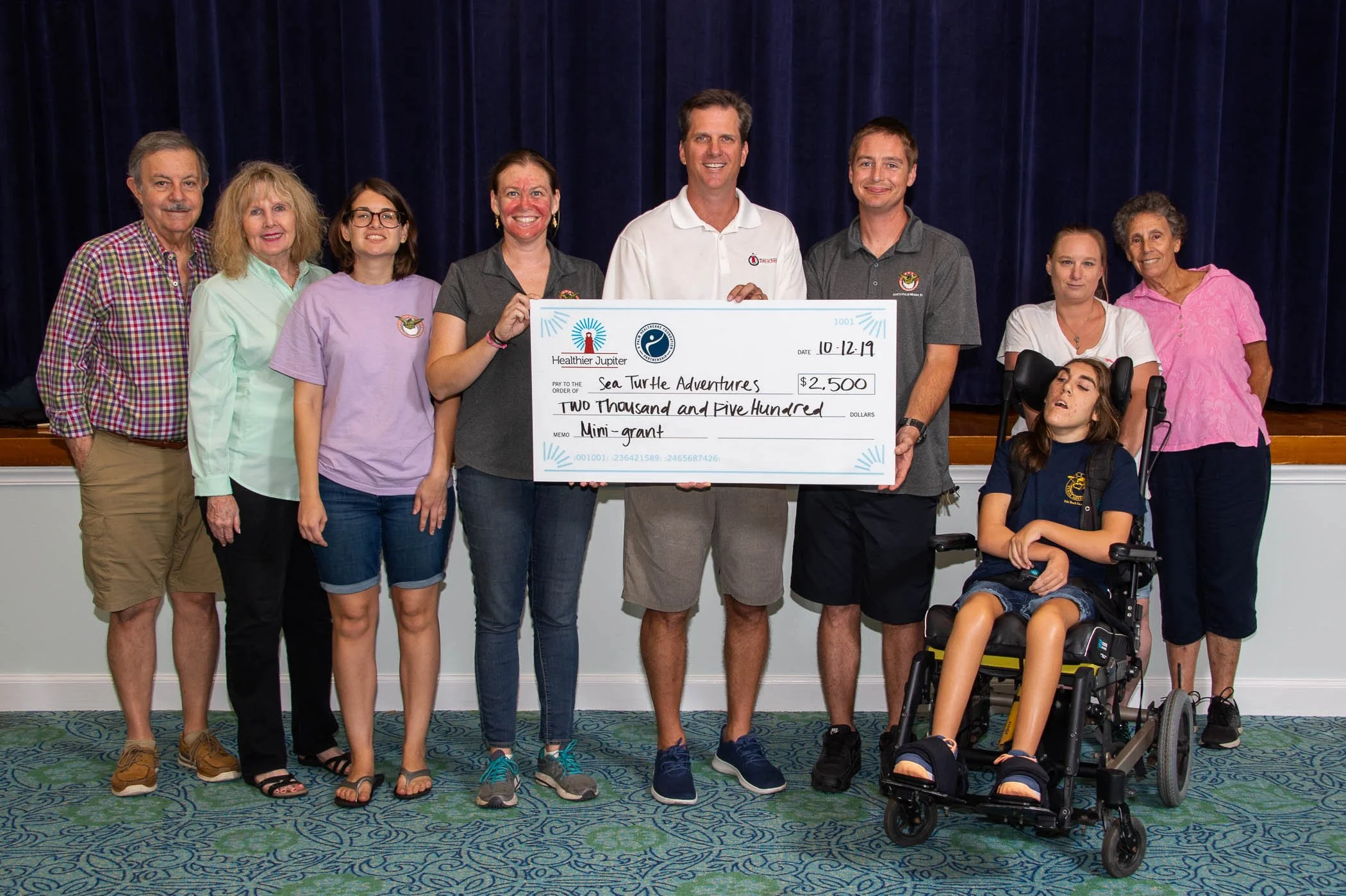Healthier Jupiter’s Program Evaluation
Updated April 26, 2022
Healthier Jupiter, in partnership with Jupiter Medical Center, is dedicated to bringing the greater Jupiter community together to encourage each person to live their healthiest life. Healthier Jupiter is part of the Palm Health Foundation’s Healthier Together Initiative, a long-term, community-driven approach to solving a community’s complex healthcare issues. Healthier Jupiter focuses on:
Promoting and ensuring opportunities for healthy eating and active living
Encouraging people to engage mentally and physically in healthy behaviors
Advocating for improving community conditions impacting health
Healthier Jupiter’s values for a community led process include:
Learning: Our actions grow Healthier Jupiter’s abilities and the abilities of others (individuals, organizations, and systems) to learn and apply knowledge and experience.
Flexibility: Our work establishes an environment for creativity and flexibility in decision making and problem solving.
Addressing Power: Our actions challenge dominant approaches, power structures, and deeply held mindsets while offering opportunities to engage in equitable ways.
Over the last several months, Healthier Jupiter has worked with Steering Committee members to create an index of all programs Healthier Jupiter is currently working on, has previously worked on, and has hoped to work on in the future. This Program Evaluation reflects on how the programs got started and the lasting impact they have created, or not.
How to navigate this page. The programs are organized first by category: healthy eating, active living and healthy behaviors. Then within each of the three categories you will find a current projects section, future projects section and previous projects section. The current projects section covers projects that Healthier Jupiter is actively working on. To learn more about this project please click the More Details button. The Future projects are proposed projects that need more partner or staff time to move the project forward, or goals and activities need to be more clearly defined. To learn more about these projects click the What’s Next? button. The previous projects are projects that Healthier Jupiter and partners have completed or we tried and did not have the results we wanted to see. To learn more about these projects click the What Happened? button.
HEALTHY EATING
CURRENT PROJECTS
Listing of Local CSAs & Farmers Markets
A bi-yearly blog post listing local CSAs and farmers markets, including those who accept SNAP/EBT. The goal is to encourage previous Food is Medicine program participants and SNAP/EBT users to purchase more fruits and vegetables from local farmers.
-
Blog post can be found here.
Why: To provide FreshRx program participants with options to access quality local fresh fruits and vegetables after participating in the program, and respond to community members request to see more farmers market and local fresh produce.
Committee Partners Involved: Community Action Committee
Time Commitment: 7 hrs = 5 (dvlpt) + 2 (annual update)
Cost: Website Cost about $216 annually
Evaluation Tools: Website Analytics (Shares + Views)
Progress: 2 Partners + Newsletter and 273 views
Results: More community members eating fruits and vegetables
Sustainability Ideas: What partner would update the listing annually? Important to keep in mind, that CSAs and local produce are expensive, even with SNAP sometimes. Some partners would like to see a focus on teaching people how to shop for affordable produce at grocery stores. What partners are working to make sure more Farmers Markets (and vendors) accept SNAP and FAB?
Racial Equity in the Food System Training
Organize a group for Food Solutions New England 21 Day Racial Equity Challenge a self-paced online learning opportunity to explore equity in the food system. The goal is to provide those with previous racial equity trainings the opportunity to dive deeper into this area of focus.
-
Learn more about our 2021 Group at www.healthierjupiter.org/recent-news/food-system-racism-challenge-join-healthier-jupiter. Urban Health Partnerships received grant funding in 2022 to develop content related to the challenge. Check out their social media.
Why: Our community has experience with racial equity training through the Racial Equity Institute trainings. This would give community members the opportunity to dive deeper into racial equity from a food perspective, which is an area Healthier Jupiter and many community partners work in.
Committee Partners Involved: University of Central Florida Master’s Student, Urban Health Partnerships
Time Commitment: 26 hours, Planning and Outreach (3 hours), Meetings (3 meetings x 1 hour), Reading/Challenge participation (21 hours)
Cost: $0, Staff Time, Funded facilitation at $2,500 (original request $5,000)
Evaluation Tools: Participation Rates
Progress: 2021 Participation (5 participants)
Results: Strategies identified to improve justice in the food system
Sustainability: Urban Health Partnerships applied for a facilitation grant in 2022 to develop south florida related content for the challenge. In the future they plan to use this content to engage partners to participate more actively in the challenge and integrate the learnings into year round operations. What other Palm Beach County based partners may be interested in joining this challenge/learning opportunity? Really important goal is to identify food security partners are trained + offered racial equity trainings.
Food System Community Outreach
Conduct interviews and meetings with local leaders to understand priority areas of need to improve the food system in Jupiter. In the future, we would like to see a food system assessment or food council. Report housed on Healthier Jupiter’s website.
-
More details can be found at healthierjupiter.org/food-health
How + Why: There are a partners in our community doing food security and nutrition education, especially around healthy food access. So our partners have been discussing the following questions and we sought from community partners the answers: How do we ensure that partners aren’t working in silos, duplicating services and/or providing fragmented services? Is there a collective vision for healthy food access in Jupiter? Are partners competing for the same food security grants? Do partners know what each other are doing? How can we localize county wide hunger relief plans to Jupiter neighborhoods? Additionally, we have thought through what collective support we could give to partners working on nutrition education and food security, while encouraging Policy, System and Environment changes.
Committee Partners Involved: Food | Health Workgroup, University of Central Florida Master’s Level Student
Time Commitment (per month): 15 hours - Weekly Co-Chair Meetings (5 hours), Workgroup Meetings (5 hours), Partner Meetings + Community Outreach (5 hours)
Cost: Staff Time and other activities TBD
Evaluation Tools: TBD
Progress: Reached out to 40+ local partners, 15 partners joined workgroup. Workgroup is unpacking Jupiter’s local food system.
Results: Vision and activities identified by community members. Stronger network of healthy food provers. More community members eating healthy foods. Promote and ensure access to healthy eating.
Sustainability: Partners have mentioned they want to know from community members how they hear about food resources, learn about nutrition, and understand shopping habits. What innovative ways can we include community members voice into this work (how can we pay community members to collect data). Who could/would take over coordination of food security efforts in Jupiter? Does our community need a healthy food assessment? How can we integrate Jupiter food advocates into county level conversations. What
Coordinate FreshRx Patient Program at JMC
FreshRx Patient Program is a free produce prescription program for oncology, cardiology, and pediatric patients in the community. Healthier Jupiter serves as liaison for Jupiter Medical Center, organizes meetings, analyzes data, and encourages partne
-
You can learn more about FreshRx and their Farm to Hospital Program at www.freshrx.org
Why: With experience coordinating a community based Food is Medicine Program with Living Hungry Coalition, Healthier Jupiter was approached by JMC leadership and Dr. Marshall Stone (FreshRx Co-Founder) to pilot FreshRx Farm to Hospital at Jupiter Medical Center. In year 1 we saw community support, and changes in participants’ health. FreshRx funds the program.
Committee Partners Involved: FreshRx Committee made up of FreshRx Staff, and JMC Oncology Department, Case Management, and Dietetics
Time Commitment: 25 hours a month. Meetings (2 hours), Data Analysis (6 hours), Outreach (5 hours), Enrollment (3 hours), Distribution (4 hours), Newsletter + Blog (3 hours), Intern Management (2 hours)
Cost: Staff time (listed above). From Healthier Jupiter, we occasionally help with printing and incentives (about $300/year)
Evaluation Tools: Surveys, Excel
Progress: Participant Enrollment (#), 10-15 Committee Members
Results: Participants reported more than 50% increase in fruit and vegetable consumption
Sustainability: Healthier Jupiter will write up lessons learned and processes involved in FreshRx. FreshRx most likely will distribute responsibilities to current staff. How can community partners assist the Food is Medicine participants beyond the 16 weeks to continue to access fruits and vegetables. Can Food is Medicine expand to other diagnosis and groups in our community? Explore Jupiter Medical Center’s role when Healthier Jupiter transitions.
Map Local Food Resources
Worked with United Way Hunger Relief Team to create a web-based map that includes food pantries, schools, library, grocery stores and other retailers that accept SNAP/EBT in Jupiter. Primarily web-based with a flyer for distribution and outreach.
-
You can find additional details at healthierjupiter.org/jupiter-food-map
How + Why: Reviewing early year programmatic strategies, community members requested a resource guide of healthy resources including healthy food in Jupiter. Previous guides developed by Healthier Jupiter have not focused on healthy food access. Healthier Jupiter’s Community Action Committee came together to think this through and came up with the idea of a Food Resource Guide. We were inspired by a few other guides from New York City and Sommerville, Massachusetts. The need for this guide was exacerbated by COVID-19. Rather than create our own guide, we partnered with United Way Hunger Relief to create a Food Finder Map for Jupiter to be housed on our website, and include links to other content for healthy food access in Jupiter.
Committee Partners Involved: United Way Hunger Relief, Healthier Jupiter’s Community Action Committee
Time Commitment: Review with Committee (3 hours), Web Page Creation (4 hours), Update Annually (1 hour),
Cost: Graphic Design Support, Website Costs
Evaluation Tools: Website Views
Progress: 202 View
Results: Help community members locate food resources
Sustainability: Potential for high impact, but needs the marketing push. What additional partners can put this on their website? Town of Jupiter was mentioned. We created a flyer that could be downloaded and printed for a rackcard.
SNAP Benefit Enrollment Outreach
Partner with PBC Food Bank Benefit Outreach to provide SNAP 101 to case managers, social workers, dietitians, and nutritionists starting with Jupiter Medical Center and expanding to other community partners. Potentially locate a Benefit Outreach Specialist at the hospital.
-
For more details about Palm Beach County Food Bank’s Benefit Outreach Program please visit pbcfoodbank.org/apply-for-snap
How + Why: During the COVID-19 pandemic committee members from the FreshRx Committee wanted to reduce barriers to accessing resources in Jupiter by co-locating a benefit outreach specialist onsite at Jupiter Medical Center, especially for immune compromised patients. The goal was to achieve the first hospital to locate a Palm Beach County Food Bank Benefit Outreach Specialist onsite. From discussions with Jupiter Medical Center team members, rather than start with a benefit outreach specialist on site and send patients over that may not qualify, we could educate team members about SNAP eligibility. The goal was to put this on healthstream (hospital online training program) as a optional education. This would better prepare team members to know if someone is eligible to save the time of patients of PBC Food Bank Staff.
Partners Involved: FreshRx Committee, Palm Beach County Food Bank
Time Commitment: Coordination (5 hours) + tbd after implementation
Cost: $0
Evaluation: Video views and referrals
Progress: Buy in from team members, Draft presentation created by PBC Food Bank benefit Outreach Team
Results: SNAP benefit enrollment increased in Jupiter. Community members, especially patients at Jupiter Medical Center, would have increased access to SNAP benefits. To promote and ensure opportunities for healthy eating.
HEALTHY EATING
FUTURE PROJECTS
Expand Fresh Access Bucks in Jupiter
Identify and assist small grocery stores and farmers market vendors to accept SNAP/EBT and Fresh Access Bucks to promote affordable healthy foods. Create an outreach campaign to promote awareness and use of discount.
-
Fresh Access Bucks is a nutrition incentive program that increases the purchasing power of SNAP recipients to buy fresh fruits and vegetables. Most programs work either through a buy one get one free model, or discounted at 50% off. Feeding Florida leads the Fresh Access Bucks program and is always willing to share knowledge and best practices. We linked them to FreshRx and United Farmers Alliance., both of which now accept SNAP and Fresh Access Bucks. Would like to see smaller grocery stores in Jupiter be included in the expansion, as well as more farmers market vendors to accept SNAP/FAB, if the whole market isn’t ready to accept.
What partners in Palm Beach County are working on this that would be interested in following the momentum in Jupiter? May be useful to identify target population and understand current data (potential market). Where are most people shopping?
Explore Policy, System and Environment Changes for Healthy Food Access in Jupiter
Explore urban gardening and healthy food access policies and codes in greater Jupiter as compared to national or regional best practices. Offer training and capacity building opportunities for partners.
-
How can we partner with Health Council of Southeast Florida. In previous meetings we learned they can track environmental indicators for food (Retail food, access to grocery stores, farmers markets, fast food density, congregate feeding sites, SNAP utilization). The Palm Beach County Office of Resiliency has done similar projects on municipal codes that do/do not allow solar, could a similar guide be created around healthy food access. Would need to work closely and understand HOAs. What current partners may be interested in this capacity building opportunity?
Create a Network of Community Gardens
Support and expand existing community gardens (and markets) that are representative of community’s cultural food choices. Utilize this project to increase access to healthy food through community garden projects.
-
Identified in the early years as a programmatic strategy. We have heard it requested at county level discussions as well. Reach out to partners to see what support they would want. What support could other county wide partners offer like United Way Hunger Relief, American Heart Association or United Farmers Alliance? Explore the food in public places and urban gardening codes model.
Suggested Partners to include: El Sol, Abacoa Community Garden, Edna Runner Tutorial Center, Nourishing Food for Thought
Water Bottle Refill Stations
We provided a Mini-Grant to Jerry Thomas Elementary School for a Water Bottle Refill Station and received requests from other local schools.
-
Learn more about the Water Bottle Refill Station at Jerry Thomas Elementary School. Other local elemenatary schools applied for a grant for water bottle refill stations, but were not awarded. There seems to be interest from local schools in this to promote students and staff drinking more water, and helping to achieve “Green” Awards to show the school cares about environmental sustainability. Additionally, water bottle refill stations could be promoted in other high trafficked areas, especially to reduce dehydration and promote more water drinking in the community.
FoodScape Walk Audit
Partnered with Urban Health Partnerships to pilot a Foodscapes Walk Audit. The Foodscapes Walk Audit Tool assesses the built environment as it relates to healthy food access gaps and opportunities. Walk Audit was conducted on Indiantown Road and near Pine Gardens South.
-
Communities need environments that enable them to make healthy choices, safely, and conveniently. A community tool was created to assess the built environment around/near the grocery store where community members primarily do their shopping. Working with Urban Health Partnerships to create a reporting tool and feedback loop opportunity. Would like to pilot more FoodScape Walk Audits in the Jupiter community in other areas/neighborhoods.
Food Distribution Partners Equipped with Active Living and Mental Health Resources
Reach out to food pantry partners to understand what additional health resources or partner connections they would like for their community. Explore a health hub model for distribution partners.
-
Would need to conduct outreach to both smaller and larger pantry partners in the community. We regularly share healthy eating and active living opportunities and ways to get more involved with our mini-grant network through a monthly mini-grant network update email. Could start easy with giving all food distribution partners our Get Fit Maps. We need to ask, do food distribution partners (and patrons) want additional resources? We can conduct a short survey to test the idea for a health hub.
Develop a Healthy Food Donation Guide
Develop a guide for use by food distribution and food drive partners to promote donation of healthier options. Included in this task would be understanding food distribution partners healthy food donation policies.
-
Discussed at a Steering Committee meeting, where a partner shared a story about unhealthy food donations. And Jupiter Medical Center Oncology Nutrition was interested in creating a healthy donation guide for their cancer emergency food pantry.
American Heart Association is helping food pantries with Policy System and Environment Changes and healthy food donation policies. Community education could be a great marketing opportunity. Could we get a grocery store partner?
Explore Food Waste Solutions
Lift up what is being done at food pantries, and explore how Healthier Jupiter can do more, including proper preparation of fruits and vegetables to reduce waste and improve budget management.
-
Healthier Jupiter partnered with Jupiter Middle School’s Culinary Program on a Food Rescue and Distribution project. From there we realized the importance of rescuing foods from local grocery stores and distributing to the community. There could be partnerships as well with local restaurants, catering companies, event spaces, or senior living facilities. How does reducing food waste cut grocery costs. Could we create posters, add additional partners, and/or a cooking series. Additional partners could include food waste partners, such as Let It Rot. Possible guidance could come from USDA.
HEALTHY EATING
PREVIOUS PROJECTS
Senior Outreach for SNAP Enrollment
Worked with United Way Hunger Relief, Palm Beach County Food Bank Benefit Outreach Team and Pearl Mae Foundation to create a flyer to encourage seniors to sign up for SNAP and pilot enrollment home visits.
-
All partners listed above were involved in the content creation, a flyer to be distributed to community members. However, never followed up with community partners on the success of distribution and if it resulted in any home visits.
You can view the flyer here.
Fund Partial Salary of Garden Coordinator at El Sol Community Garden
Committed to healthy food access, Healthier Jupiter funded partial salary of the Garden Coordinator at El Sol who is responsible for maintaining garden plot and providing community education.
-
Healthier Jupiter was approached by El Sol in our early years to assist in funding a salaried position of a garden coordinator at El Sol. Working with Palm Health Foundation we were able to fund the coordinator position, and have over the years reduced the amount of funding contributed to the salaried position.
Healthy Food Policy Baseline Study
Wanted to assess healthy food policies on Indiantown Road and Military Trail to assess grocery stores/supermarkets, convenience stores and mini-marts, alternative sources, and community programs
-
The consultant suggested utilize a tool called the “Healthy Eating Worksheet”. The recommended steps included:
1) Define the boundaries of the geographic area by street
2) Recruit volunteers, including community members to collect data
3) Provide a training on how to complete the forms
4) Pick a time frame to conduct the assessment
5) Conduct the assessment
6) Analyze the results. After we analyzed the results we could identify action steps to change the current situation. This tool could have been expanded to physical fitness as well.
Did not conduct study, but a graduate student conducted a Nutrition Environment Assessment Tool study. Is this policy base line study a tool or data collection opportunity we want to explore again?
Cancer Emergency Food Pantry at JMC
Supported the Oncology Clinical team at Jupiter Medical Center Anderson Cancer Institute in their proposal for a pilot an emergency food pantry for cancer patients.
-
The Cancer Emergency Food Pantry at Jupiter Medical Center Anderson Cancer Institute was proposed as part of the hospitals cancer accreditation. Assisted with partner connections, sourcing, drafting proposal, and navigating compliance. Partners that were approached include PBC Food Bank and CROS Ministries. The goal was that if it was successful within the oncology department it could expand to serve additional departments. Pilot program was not approved by compliance and leadership.
Eat Smart Partner Program
Worked with our Healthy Foods committee and Palm Beach County Department of Health to pilot a restaurant decal program to identify healthy menu items at local restaurants.
-
Program was created in 2016 and collateral material was developed for business recruitment, including recipe cards, forms and stickers. Community member volunteer hired was no longer able to continue with project, and there was little business interest. The Department of Health had very strict guidelines on what would be considered healthy. So we ended outreach for this project.
Pop Up Eat Well with Living Hungry Coalition
Convened partners and volunteers to support Living Hungry Coalition’s implementation of a pilot Food is Medicine program for diabetic patients in the community.
-
Originally Healthier Jupiter managed the volunteers in the program. In 2018 we dedicated staff and volunteer time for 9 events 6 hours each. In Year 2, we referred partner organizations and community members to volunteer. Program continues in the Jupiter community with partners and volunteers. Healthier Jupiter continues to share partners’ request for volunteers through our network. The program has seen significant changes in health. In 2018, there were 87 patients who lost weight and HbA1c decreased.
Jupiter Farmers Market Coupon Program
Provided a $2,500 sponsorship to Jupiter Farmers Market (former market at El Sol). As part of the sponsorship the Market Manager gave out punch cards for a discount on fresh produce at the market.
-
200 punch cards were given out in 2018. The farmers market located in El Sol’s parking lot is now under new ownership and name - J-Town Market. In previous conversations with El Sol’s Executive Director, the market was not at a point to accept SNAP/EBT. Need to revisit this ide and approaching partnership to promote fruit and vegetable purchasing. Are there other markets in town interested in a partnership like this, and are there other funders out there interested in sponsoring in this way?
Home Garden Contest
Held a Home Garden Contest where community members submitted photos of their home garden for a cash prize and recognition. Gardens rated on appearance, variety and creative use of space.
-
Lizzie Lawson of Limestone Creek, Jupiter was the winner of the Healthier Jupiter Home Garden Contest. Ms. Lawson loves to work in her garden and shares her harvest with Family, Friends and Neighbors. Healthier Jupiter had an opportunity to visit her garden and see the bountiful plot first hand. Her green thumb shines through all that she produces. Congratulations Mother Lawson…
There was not a lot of community participation in the contest, so we decided to not hold the contest again. The winner was Mother Lawson from the Limestone Creek Community.
ACTIVE LIVING
CURRENT PROJECTS
Coordinate Walk and Bike Workgroup
A community working together for safe and accessible opportunities to be physically active in our community for transportation and/or recreation. Using equity as their foundation, the workgroup dedicates itself to making progress in big and small ways.
-
How + Why: In Healthier Jupiter’s early years, transportation access and safety were identified as critical issues for access to medical care. As we transitioned away from focusing on access to medical care, we recognized that walking and biking safety and built environment changes are important for promoting a culture of health. Walking and biking is a no cost way to be physically active, and can help treat, prevent, or manage chronic conditions and our community needs safe space to do so. We kicked off the work with a walkability/bikeability event with Mark Fenton, who identified long term improvements in the built environment to make Jupiter a more walkable and bike-able community. It took several years for a community group to come together on walking and biking safety. The group started meeting in September 2020 to plan a mobility awareness event - Walk and Bike on Jupiter Challenge. Projects include active transportation campaigns, bike rides, and walk audits.
Community Partners Involved: Walk and Bike on Jupiter Workgroup
Time Involved: 15 hours - Meeting and Preparation (3 hours), Outreach (5 hours), Communication (2 hours), Active Projects (5 hours)
Cost: Incentives $200 and staff time.
Evaluation: Committee Member Attendance and # of Events
Progress: 1 Mobility Week Campaign, 4 Walk Audits, Youth Walk Audit created, Mission statement created and provided input to Town of Jupiter Planning and Zoning’s Palm Tran Community Feedback
Results: More community members getting regular physical activity. Less pedestrian and bike crashes and fatalities.
Sustainability: Right now we are building relationships and engaging more stakeholders, including community members and partners. Need to identify more easy wins for policy, system, environment change work to get to the larger built environment changes for walking and biking safety. There was some concern with this work, and the potential for conflict with Town of Jupiter and equity focused language (mobility justice). This is a nontraditional way to address health disparities. What other organizations locally or at the county level are doing this work? There is an issue with access to affordable bikes. Our Walk and Bike Workgroup would also like to see more community members focused on micro mobility, walking/biking on town boards.
Neighborhood Exercise Program
Fund community leaders to provide free exercise opportunities at local neighborhood parks. In addition to physical activity, participants build community connection. Currently, we fund Zumba, and previously funded Yoga and Nature Walks.
-
How + Why: Approached by a community leader that wanted to teach zumba to local community members. Worked closely with Town of Jupiter Parks and Recreation Department to get approval for neighborhood exercise programs, the only non-town programming approved by the town on a regular basis. Great success so we expanded to other physical activity types, including yoga and strength training (a mini-grant with El Sol). At community events, community members want to see more and a variety of free outdoor activities, especially ones that are family friend.
Community Partners Involved: El Sol, Nora Lara, Town of Jupiter Parks and Recreation, Jupiter Bloom Wellness and Busch Wildlife
Time (per year): Process Payments (1 hour), Communication (2 hours), Collecting Data (3 hours)
Cost: Zumba ($3,000), Yoga ($1,250) and Nature Walks ($2,500). On average a neighborhood exercise program costs around $3,000 to cover cost of trainer and supplies.
Evaluation: Attendance, Success stories
Progress: 3 funded programs, with varying degrees of attendance
Results: More regular physical activity for community members. Community members feel more connected to each other and the community.
Sustainability: In the future, Healthier Jupiter wants to work with partners to create a shared vision for Neighborhood Exercise Programs. We attempted to receive assistance from the National Parks Rivers, Trails & Conservation Assistance Program, but was unable to get all partner commitments. Expand to serve the Limestone Creek, and Kennedy Estates neighborhoods. What funders in the community would fund a project like this? Would gyms or trainers be interested in help to fundraise for these projects or create a Pay it Forward model. At a community event in the Limestone Creek Community, community members shared the exercise opportunities they would like to see include zumba, bootcamp, group walk, yoga and stroller strong moms group
Walk Audits with Various Partners
Walk Audits are an important tool to identify areas in the community that are (un)safe for walkers and bikers. Healthier Jupiter’s Walk and Bike on Jupiter Workgroup requested the Palm Beach Transportation Planning Agency’s support for a Walk Audit on Indiantown Road.
-
Results of the Indiantown Road Corridor are here. Inspired by these walk audits, Healthier Jupiter created two youth guides with the Girl Scouts of Southeast Florida and a Food Scape Walk Audit with Urban Health Partnerships. Recently, we helped Town of Jupiter recruit community members for a Pine Gardens South Walk Audit, and did a night time walk audit in the Limestone Creek Community
How + Why: Inspired by projects with Mark Fenton and AmeriCorps VISTAs, walk audits are one of the best tools community members have to advocate for safer streets. Audits with Town of Jupiter and Palm Beach Transportation Planning Agency staff allowed our group of community advocates to learn more about obstacles and vision for a healthy and safe community.
Community Partners Involved: Town of Jupiter Planning and Zoning, Palm Beach Transportation Planning Agency, Walk and Bike on Jupiter Workgroup, Urban Health Partnerships and Girl Scouts of Southeast Florida
Time Commitment (per year): Depends on active projects - In person events (3 ours), Planning (2 hours), Development (5 hours), and Communication (2 hours)
Cost: Water, Snacks and Safety Gear $200
Evaluation Tools: Community members participating in walk audits and partnerships
Progress: Identified areas for improvement. Completed Audits (4) in Jupiter and 15 community members participated across 4 audits.
Results: Less pedestrian and bike crashes. Areas from walk audits are funded for improvements.
Sustainability: The Palm Beach Transportation Planning Agency conducts walk audits with partners. Possible steps include: (1) walk audit (2) reports and identify/fund low hanging fruit (3) long term strategic changes. How to work with the Palm Beach Transportation Planning Agency and their Vision Zero Advisory Committee to ensure that community members (possibly without their city or county support) can apply for Transportation Planning Agency funding.
Physical Activity Blog Posts
Content created include: Free Places to Be Physically Active in Jupiter, What’s in Your Walking Shed, Walking and Biking Safely in Your Community, and How to Find Physical Activities You Enjoy. Content is located on our website.
-
The content is located online and often distributed to our partners through the newsletter and email.
How + Why: One of Healthier Jupiter’s first programmatic recommendation included developing a comprehensive list and mapping of Jupiter’s Healthy resources, including physical activity. We wanted to share with community members where they could exercise for free, or at low cost. During our Community Health Survey we also identified our community’s common barriers to physical activity. The top 3 barriers are motivation, cost, and time.
Community Partners Involved: Community Action Committee and previous Healthy Foods and Physical Activity Subcommittees
Cost: Website Costs
Time (per year): Content Creation (5 hours each blog), Update Annually (1 hour)
Evaluation: Squarespace Analytics
Progress: Views to date
Free Places to Be Physically Active in Jupiter (833 Views)
What’s in Your Walking Shed (55 views)
Walking and Biking Safely in Your Community (141 views)
How to Find Physical Activities You Enjoy (65 views)
Results: More regular physical activity for Jupiter community members
Sustainability: What partner would be interested in taking on updating the listing annually? Overcoming barriers to physical activity is a common education topic - may not need to continue, but it is shared often with FreshRx Food is Medicine program participants.
Walk and Bike on Jupiter Challenge
To localize Florida Department of Transportation’s Mobility Week we held a walking, biking, and rolling challenge to get community members active. Participants use active modes of transportation take photos and submit for prizes.
-
You can check out the challenge here: healthierjupiter.org/wbj-challenge
How + Why: This challenge was the first event for Healthier Jupiter’s new Walk and Bike on Jupiter workgroup. Goal was to see if there was enough interested parties to come together around this topic. By focusing on an organizing around the campaign, we could help start and build relationships to see built environment changes in the community.
Community Partners Involved: Walk and Bike on Jupiter Workgroup
Time (per month): In August it is 5 hours (meetings and planning). In September about 10 hours (planning and coordination). In October about 25 hours (implementation and engagement)
Cost: Incentives $100 and staff time
Evaluation: Registration forms, photos and post surveys
Progress: In Year 1, 25 participants registered and 10 submitted photos. 2 completed post survey. In Year 2, 15 registered and 8 submitted photos.
Results: More community members are physically active. Less pedestrian and bicycle crashes and fatalities.
Sustainability: Who are partners that are working on active transportation? Florida Department of Transportation and Palm Beach Transportation Planning Agency promote this campaign but at a county and state level with some community level engagement. Campaign builds awareness for long term work and we could use this campaign to build additional safety campaigns. Need to include more businesses in the future.
Coordinate Couch to 5K Training Program
Through a partnership with JMC Cary Grossman Health & Wellness Center and Town of Jupiter, coordinated a free training program to help community members increase their physical activity levels enough to walk or un a 5K in 9 weeks.
-
Learn more about the Couch to 5K Training Program.
How + Why: Healthier Jupiter’s original Physical Activity Subcommittee had representation from Town of Jupiter Parks and Recreation staff. After Healthier Jupiter’s first year participating in the Town of Jupiter Turtle Trot 5K as a group, we wanted to prepare our team and those in the community to be able to walk or run a 5K. Jupiter Medical Center Wellness Center staff were approached to create the training program, and Healthier Jupiter coordinated a planning committee to assist with program implementation. The Committee focuses on enrollment, volunteers, incentives, marketing, and participant communication. This idea expanded on one of Healthier Jupiter’s first programmatic strategies - a Neighborhood 5K Training Program. The original idea was to develop a Train the Trainers Program to hold training programs for trainers and empower them to build teams in their neighborhoods.
Community Partners Involved: The Jupiter Medical Center Wellness Center Team Members volunteer their time as trainers. Town of Jupiter supports us in preparation for the Town of Jupiter Turtle Trot. Couch to 5K Committee.
Time Commitment (per year): 7 hours per week for 9 weeks during trainings- Trainings (2 hours), Preparation for Trainings (2 hours), Newsletter (1 hour). Pre-trainings usually take up about 13 hours per month from November to February. Develop Materials (4 hours), Planning and Outreach (9 hours)
Cost: Incentives (T-Shirts) - $1,500 and supplies/printing $100
Evaluation Tools: Program Participation, Excel Tracking Sheet, and Post Survey
Progress: In Year 2019, 214 participants registered and on average 74 participated in meet ups. COVID-19 cut off our 3rd and 4th year (virtual). This Year (2022) 110 participants registered and on average 55 participated in meet ups.
Results: Increased opportunities for physical activity.
Sustainability: Volunteer student created a Couch to 5K Toolkit for their capstone project. Need to finalize the Couch to 5K Toolkit. Wellness Center staff are interested in taking this work on. What could an outreach strategy for others to conduct their own Couch to 5 K Training Program.
ACTIVE LIVING
FUTURE PROJECTS
Physical Activity at Night Concerns
Learned most crashes (pedestrian, cars, bikes) happen at night, and community members recognize this as an issue.
-
Explore activity at night concerns, including lighting at parks, sidewalks and neighborhoods. We added on TPA lead walk Audits with three night-time walk audits: first on the Indiantown Road Corridor, second in the Limestone Creek Community, and third in Pine Gardens South. This issue was raised during our Walking and Biking Workgroup as an issue our group would like to take on with special campaigns to raise awareness, and incentive items (safety lighting). Additional partners would need to be engaged on these projects, including Florida Power & Light, Town of Jupiter, and Palm Beach Transportation Planning Agency. Is there additional data that we need to collect?
Exercise is Medicine
To build off local ParkRx and Food is Medicine programs we could explore the idea of implementing Exercise is Medicine in clinical and community settings.
-
Exercise is Medicine® (EIM), a global health initiative managed by the American College of Sports Medicine (ACSM), is to make physical activity assessment and promotion a standard in clinical care, connecting health care with evidence-based physical activity resources for people everywhere and of all abilities. Currently, we have shared Exercise is Medicine one-pagers with the FreshRx Participants. Locally we would need to explore the possibility of integration of the Exercise is Medicine concept at clinics, hospitals, and community partners. What exercise partners would be interested in getting involved - wellness centers, gyms, personal trainers, etc. Would need to set up meetings to explore local partners interest in this concept.
Community of Practice to Explore (In)Equity in Physical Activity
The goal would be to explore and unpack equitable access to physical activities in the Jupiter community from youth to seniors. The Community of Practice model would create a network of partners to learn from each other and work toward potential solutions.
-
This idea stemmed from a few of our Mini-Grant applicants and awardees that focus on healthy eating and active living projects for the autism community. They were interested in coming together and network to promote more physical activity amongst the autism community. Additionally, we had a few Mini-Grant applicants apply for water based programming, but we recognized the need to help more community members learn how to swim. The idea is to establish communities of practice focused on equity in different physical activity spaces, such as yoga, swimming, surf, bike, local youth and adult sports, and walking/running. This could be a good starting point to include gyms, personal trainers, etc.
Safe Routes to School
Interested in partnering more with local schools to improve the built environment around schools to promote walking and biking safety.
-
Specific projects could include applying for Safe Routes to School local/state funding and creating a school based committee, or partnering for Walk or Bike to School Day events throughout Town of Jupiter. Healthier Jupiter’s Project Director has been staying educated on trends and best practices in Safe Routes programming, including schools and parks. We worked with a undergraduate student to research and suggest recommendations on Safe Routes to School and Safe Routes to Park implementation. Need to develop stronger relationships with local elementary, middle and high schools staff, including principals, crossing guards, and gym teachers. Other important partners could include Town of Jupiter, Police Department, and Safe Kids PBC.
Active Living Projects
The Walk and Bike on Jupiter workgroup has brainstormed other community projects to ensure our community is safe walking and biking in Jupiter.
-
Projects that were brainstormed include: Share the Road campaign, Bicycle Friendly Business, Bike 101 classes, Bike Rack Citizen Science Project, Walk/Bike Friendly City Designation, Bike Rodeos, Community Engagement Projects, National Day of Remembrance and Bike Fix It Station Demonstration Videos.
In order to implement new projects, we need to engage additional community partners such as Town of Jupiter, Town of Jupiter Police Department, neighborhood organizations, bike shops, etc.
ACTIVE LIVING
PREVIOUS PROJECTS
Park Usage Study
Student, with volunteer help, conducted a study of 10 neighborhood parks. Results of the report demonstrated the success of Zumba and the importance of expanding programming to other local small parks.
-
A University of Miami Public Health student led this one-time study with the help of Healthier Jupiter staff and 5 volunteers (total of 57 hours) to collect data at parks. The full report has been published on the website and can be found here. Healthier Jupiter did use the results of the report, and the fact that programming helps to increase park usage, to apply for an AARP Community Change Grant to bring more fitness classes to local parks. We did not receive funding. The data sits in the report, but we played around with the idea of developing a map to share suggested recommendations, and show park access in our community. This could be used as a guide to align more closely with the 10 Minute Walk to a Park Initiative: www.tpl.org/10minutewalk
Bike Valet
In 2018, Healthier Jupiter partnered with the Boy Scouts to operate a Bike Valet at the Town of Jupiter Jupiter Jubilee to promote active transportation to the event.
-
Over 50 bike riders participated at the first Bike Valet in partnership with the Town of Jupiter and Boy Scout Troop 774. Information on how to run a Bike Valet has been provided to 2 additional organizations. Healthier Jupiter created an outline for implementing a Bike Valet but did not work with our graphic designer to turn it into a toolkit. The idea was to also allow partners to borrow the materials from Healthier Jupiter to have a Bike Valet at their event, potentially using tip fund as a fundraiser. This would be a great way to promote healthy living at local events. Similar to other toolkits, could we partner with a business to develop the guide and share with community partners.
Walk on Jupiter Toolkit
Created a toolkit for community members to start their own walking groups, includes tips on how to recruit participants, choose a routine, and how to sustain participation.
-
The Walking Group Toolkit was created as part of the Walk on Jupiter Challenge, which was planned to be launched in Winter 2018. This was intended as a physical fitness challenge to encourage everyone in our community to walk by creating walking groups and collectively achieve the distance it would take to land on the planet Jupiter. This evolved into promoting a walking group in every neighborhood. The marketing plan was never fully developed for this program, and when lost AmeriCorps VISTA / Part-Time Coordinator it was hard to keep up outreach.
Sustainability Ideas: Could we align with business partners to underwrite the cost of printing for space on the guides. How can Mini-Grant awardees better use the toolkits? If Healthier Jupiter goes away, who would distribute the toolkits or keep on their website? All toolkits need to be translated into Spanish. How can this be distributed to medical professionals?
Lets Move PBC
Digital Vibez coordinates the county wide physical activity promotion campaign to be active for 30 minutes a day during March. They invite others to join the planning and encourage community events.
-
Healthier Jupiter previously organized teams and meetings with good success and engagement. We also used to partially fund a healthy meal and bathrooms at an Edna Runner Let’s Move Event. Recent years stepped back from coordination and encouraged individual organizations to participate in the campaign, and get individuals to join our team. It is easy to continue to promote this campaign through our newsletter. Tried with a relative degree of success to piggy-back off Let’s Move Month to promote our active living work, including walk audits (0 participants) and bike month bike rides (8 participants).
Get Fit Map
A comprehensive listing and mapping of Jupiter’s physical activity resources. The goal was to show community members they can walk or bike in their own neighborhoods.
-
This was identified and implemented in 2015 and 2016 as a wat to create a comprehensive directory and map of Jupiter’s health resources, including free and low cost opportunities. After printing, we distributed the Get Fit Maps at all opportunities. Additionally, we created a large print out to take with us to community events. We sought feedback on the map, and what is missing from community partners in 2020 and 2021. The idea was to update the map with new parks and safety tips for walkers and bikers from Town of Jupiter Police Department. Town of Jupiter already has their own branded maps with parks, and natural areas. Our Community Action Committee discussed internally the best route to take and wanted to explore if we could align with business partners to underwrite the cost of printing for space on the guides. How can Mini-Grant awardees or food distribution partners better use the Get Fit Map? If Healthier Jupiter goes away, who would distribute the toolkits or keep on their website? How can this be distributed to medical professionals?
Walk & Talks
One of Healthier Jupiter’s first programs, we partnered with educational, inspirational, and spiritual partners to encourage light excise to during a social experience.
-
Planning, outreach, and implementation for a Walk & Talk usually took 10 hours per event. Specific tasks included securing and communicating with speaker, preparing flyers, outreach, and day of event. The average number of participants was 15 with many repeat participants. The first Walk & Talk happened in Abacoa Greenways in March 2016. Other Walk & Talk speakers/special locations included: Chef Barbara, Dr Ken Grey, Dubois Park, Jonathan Dickinson State Park, Lighthouse Tour, Limestone Creek, Chef Greg from Jupiter Middle School Culinary Program, Jupiter’s Outstanding Natural Area, Riverbend, Rock Painting, Scripps, Tai Chi, and the River Walk.
Time and effort versus participation was too much. Additionally, we realized that our Walk & Talks were successful at getting a group of greater Jupiter residents active and social, it was not reaching one of our target populations, the Hispanic Community.
Explored the idea of transitioning to a grant format where award a community organization to conduct the walk and talks. We piloted this with one year of funding to Busch Wildlife Sanctuary’s for their Happy Trails Program, which were guided nature + wildlife walks in Palm Beach County Environmental Resource Management Natural Areas. Additionally, the Palm Beach County Environmental Resource Management does a lot of programming in natural areas.
Youth Sports Scholarships through Jupiter Tequesta Athletic Association
Funded Jupiter Tequesta Athletic Association (JTAA) for several years to provide youth athletic scholarships to those with financial need to participate in team sports, including youth soccer. JTAA partnered with El Sol to enroll client’s children and other youth in the community.
-
In 2017, 30 scholarships have been provided for Recreation Soccer with 50 more scholarships available for other JTAA sports. It was discussed with JTAA where they are seeking additional funds to support scholarships for youth, and the Executive Director mentioned that they had a tough time securing funding from other community partners for scholarships. Additionally, we had conversations with JTAA’s Executive Director about exploring additional adult leagues for the Hispanic community, open field access and the possibility of shared use agreements at local schools. However, none of those projects moved forward.
HEALTHY BEHAVIORS
CURRENT PROJECTS
Jupiter Mental Health Campaign
Community partners came together to organize a mental health awareness campaign: Jupiter Mental Fitness Week. Community members share photos for mental health care themed days of the week.
-
You can find more details at: healthierjupiter.org/mental-fitness
How + Why: El Sol staff recognized there were a lot of community members talking about mental health issues and that our community could benefit from a mental health awareness campaign. Healthier Jupiter’s network and support was recognized as a good backbone to bring people together, build consensus, and coordinate the campaign. Partners came together to identify current issues around mental health and brainstormed what the design of a local campaign. This is the first effort Healthier Jupiter has coordinated around mental health. Our community is interested in gathering around this topic more. Annually the plan is the meet in early March to plan for May, which Mental Health and Trauma Informed Care Month.
Community Partners Involved: A Jupiter Mental Health Campaign Planning Committee has been established and a listing of community partners can be found here.
Time Commitment: Meetings (1 hour per week for 2 months), Campaign Materials + Updates (2-5 hours), Outreach + Social Media Posting (3 hours per day during Jupiter Mental Fitness Week)
Cost: Staff time, graphic design support donated, social media ads ($20-50)
Evaluation Tools: Social Media Analytics
Progress: 20+ partners planning the campaign. In 2021 the campaign reached 92,000 on social media with 1805 interactions and 174 mentions.
Results: Reduce mental health stigma in the community and encourage people to engage mentally and physically in healthy behaviors
Sustainability: All materials are created, just need to be updated yearly with dates and business partners. Is there another lead agency that wants to take this on for Jupiter? Would the planning committee continue to meet without Healthier Jupiter leading? Beyond the campaign is there another role that Healthier Jupiter should play in the behavioral health space?
Health Fairs & Community Events
Outreach events and health fairs are an important mechanism for feedback loops and to check in with community. At events we distribute resources, obtain community ideas and give out incentives (and fruit).
-
How + Why: Community outreach and events are important to ensure feedback loops of hearing from community about programs and projects they want to see around healthy eating and active living. Information gets funneled up to our workgroups and partners. Recently, with only one full time staff member, only took on events important to our community and partners, focusing on reaching new populations in Jupiter.
Community Partners Involved: Many events we have attended in the past are organized by Jupiter Medical Center, Town of Jupiter, El Sol, and Limestone Creek.
Time (per event): Preparation (3 hours), Event (4 to 6 hours) about 2 events per month (depending on time of year)
Cost: Supplies, Fruit Giveaways, Printing usually around $50-200 per event
Evaluation: Distribution of flyers, Sign Ups, Engagements
Progress: 10 events per year, 1,400 newsletter sign ups
Results: Engage and collaborate with community members and increase awareness of Healthier Jupiter
Sustainability: Could have set up a stronger volunteer program for outreach. Healthier Jupiter has pulled back from sponsoring many events.
Student Involvement
We have worked to involve students of all ages in the initiative on a variety of projects from volunteer food distribution, blog posts, toolkits, and research projects. In person and virtual projects were available.
-
How and Why: Student research innovative topics in healthy eating and active living has helped to provide context for future projects that Project Director may not have time to research fully. Important to connect student projects with larger things happening in the community. To find out more information about each student project see the list below:
Jupiter Middle School Culinary Students Rescue 300 Pounds of Food
Andrew Stine Rowe - Increasing Park Engagement for Diabetes Prevention and Management
Paula Baniotaite - HEAL Series
Barbara Wisinski - Healthy Food Options Audit
Joe Correa - Healthier Jupiter’s Collection of Data Around Walking & Biking
Sean Goodwin - Cost Incentives for Healthy Foods
Tessa McKay - started the outline for the SMART Guide and started toolkits on Workplace Wellness and Couch to 5K
Amy Krigsman - Volunteer Program Case Study. Amy had also assisted in food and health work, and Healthier Jupiter’s strategic plan.
Sophia Nemes - Student Voice Reporter
Derek Tingle - Promoting Safe Routes Programming in Jupiter
Community Partners Involved: Local universities and middle schools
Time Commitment (per student): 7 hours - Planning (3 hours), Meetings (1 hour ever other week), Review (2 hours), Updating website (1 hour)
Cost: Staff Time, no interns were paid
Evaluation Tools: none created
Progress: 10 students
Results: Engage more students in Healthier Jupiter
Sustainability: Need to do a better job to take on projects that require minimal staff involvement. How can we have a better relationship with local high school and middle school medical programs?
Share No Cost + Low Cost Resources
Share no cost or low cost healthy eating, active living, and mental health resources and events on social media, newsletter, website, and during outreach.
-
How + Why: Healthier Jupiter has built our following of community members and community partners that seek out healthy eating and active living resources and share resources with us. We utilize our various channels to communicate resources (in order of most used): Facebook, Blog, Newsletter, and Instagram.
Community Partners Involved: All are welcome to submit no cost, low cost resources.
Time (per month): Research events and resources (5 hours) and Content Creation (3 hours)
Cost: Website costs
Evaluation Tools: Communication Channel’s Analytics
Progress: Average post like 6, 1400 newsletter followers, 1110 Instagram followers, 1200 Facebook followers
Results: Promote opportunities for healthy eating and active living
Sustainability: When Healthier Jupiter had multiple staff members, posting regularly was easier. It was proposed in the past to find an intern or hire someone to run our social media.
SMART Guide
Identified in March 2016, community members wanted to see a comprehensive listing and mapping of Jupiter’s healthy resources including free and low cost opportunities.
-
How + Why: These toolkits and resource guides are intended for community members and community partners to utilize to promote different healthy eating and active living resources. Serves as a one-stop-shop for the best articles specifically related to healthy foods, physical fitness, access to medical care and knowing your risks of diabetes. Currently, we only have the resource online and in English. Originally, this resource guide was called the Getting Started Guide to be handed out by doctor’s offices. A student’s capstone stone project organized community feedback and created a 12 page guide.
Community Partners Involved: We partnered with FAU Medical School students as a service project to identify the best resources. And was organized by a graduate student, Tessa McKay, as part of a capstone project. Community Action Committee.
Time Involved (one time): 20 hour project (Research, Planning, Design, Marketing)
Cost: Graphic Design support ($1,000), Printing ($2600 for 10,000 guides)
Evaluation Tools: Squarespace Analytics
Progress: 250 Views
Results: Ensure opportunities for healthy eating and active living
Sustainability: Could we align with business partners to underwrite the cost of printing for space on the guides. How can Mini-Grant awardees better use the toolkits? If Healthier Jupiter goes away, who would distribute the toolkits or keep on their website? All toolkits need to be translated into Spanish. How can this be distributed to medical professionals?
HEALTHY BEHAVIORS
FUTURE PROJECTS
Social Determinants of Health Screening Practices and Referral Processes
Reach out to local clinics, social service providers to understand their screening and referral practices around food security (healthy eating), physical activity and mental health to identify gaps and solutions
-
Steering Committee members mentioned this as a potential project when reviewing our Theory of Change. Potential support could include collaborative meetings, network building and/or grant support. What partners have an interest in seeing a project like this through?
Healthy Eating Active Living Best Practices
Identify best practices in policy, system, and environment change for healthy eating and active living promotion that could be easily adapted by local organizations.
-
Project Director has collected some great ideas and content, but has not put it together in a concise document or guide. This idea came from the Project Director’s Performance Challenge coach, who recommended a “white paper” to organize ideas for a healthy eating or active living policy, system and environment change. Once the document was created it could live on with partners, but how do we know if partners are interested in making or implementing changes.
Health In All Policies
Health in All Policies (HiAP) is a collaborative approach that integrates and articulates health considerations into policymaking across sectors to improve the health of all communities and people.
-
We first learned of this initiative, or way of working, from Pinella’s County. Our Community Action Committee thought that looking for ways to align, integrate or embed Healthier Jupiter’s work into the Town of Jupiter government would be great for sustainability of Healthier Jupiter and lasting impact in the community. This was echoed by our Walking and Biking Workgroup, and Food and Health discussions.
More information is shared from the CDC.
Community Trainings on Policy, System and Environment Change
Build the capacity of community members and organizations to implement policy, system, and environment change through trainings and tools.
-
We have identified leaders for Policy System and Environment change work, including Urban Health Partnerships and American Heart Association. Urban Health Partnerships has done Policy System and Environment Change trainings around healthy food access. As part of a Food Health initiative, we worked with community members to do some minimal education on policy, system and environment change. An important first step is to work with healthy eating AND active living community partners to see if they are interested and ready for the training.
Racial Equity Institute
Hire Racial Equity Institute to train stakeholders to better understand racism in its institutional and structural form. Potential participants could include staff from the town, police, hospital and local schools.
-
Almost all staff (past and present) have been through the Racial Equity Institute Training through opportunities from Palm Health Foundation. Healthier Jupiter funded about 20 community members to participate in a virtual groundwater presentation in 2020. Additionally, when we asked community members in 2020 how we should prioritize our budget for the next year, community members top vote was racial equity trainings. We started some additional racial equity work through participation in the Food Solutions New England 21-Day Racial Equity Habit Building Challenge. Healthier Jupiter had funding to provide 1 training, however, committee members were interested in a partner would share the cost. What other organizations can our Jupiter community members work with to attend a Racial Equity Institute Training. Our community was also interested in learning about the Latino Challenge.
Strategic Partnership Engagement
An important part of Healthier Jupiter’s work is convening and collaborating with NEW community members and organizations across sectors to collectively improve community health.
-
We have identified several partners and stakeholder groups that we would like to build strong relationships. Those include (in no particular order):
Town of Jupiter Council
Town of Jupiter Police Department
Palm Beach County Government & Community Services
Palm Beach County Sheriff’s Department
Palm Beach County Fire Rescue
Senior serving organizations
Domestic abuse partners
Sexual abuse partners
Substance abuse partner
School District of PBC, including local elementary schools, middle schools and high schools
Kennedy Estates Community
Jupiter Farms Community
Palm Beach County Parks & Recreation
Town of Jupiter Parks & Recreation
Partners involved in mental and behavioral health
Organizations focused on environment + sustainability
HEALTHY BEHAVIORS
PREVIOUS PROJECTS
Community Meetings
In early years, we held community meetings 2 times per year to engage community members and partners. We created opportunities for engagement, announced programs and shared progress.
-
Originally multiple Community Meetings throughout the year were a requirement of Palm Health Foundation and were the most important mechanism for our feedback loop. However, as years went on they no longer made them a requirement. Community meetings were successful to share information about Healthier Jupiter to a large gathering of people. We realized that mostly nonprofit partners were attending the meetings, and we needed to get out more in the community. We view outreach events and health fairs as an important way to check in with community, as well as distribute resources. Community outreach is an important way to ensure feedback loops of hearing from community about programs and projects they want to see around healthy eating and active living. Information from community events would get funneled up to our workgroup and partners.
In our third year, we began to intertwine Community Meetings with our Mini-Grant process.
Children’s Health Survey
Three local pediatricians and one community partner distributed the Children’s Health Survey to pediatric patients to start conversations between physicians and parents about children’s healthy behaviors.
-
This project was led by a Steering Committee Member. A total of 162 surveys were collected. A student volunteer created a report, and related blog posts, to summarize and communicate results. Results and recommendations were posted on our blog.
One of the pediatrician partners, Dr. Ivy Faske was going to obtain feedback from the physicians she helped recruit on the value of the survey.
Student Film Contest
Students received a $250 prize to submit a healthy living in Jupiter video, including healthy eating, physical activity and walking and biking safety. Over the two years of the program 4 videos were submitted.
-
You can view the videos on our youtube channel.
A lot of outreach went into the Student Film contest with very few submissions. A total of 20 hours per year for 2 submissions in 2018 and 3 submissions in 2017. There were recommendations to switch outreach to the summer instead of school year.
A strong effort was put around this in order to raise students’ awareness of Healthier Jupiter. From the Student Film Contest, one of the student winners became our Student Voice Reporter. You can view posts on our blog.
Community Calendar
Until around December 2019, Healthier Jupiter uploaded no/low cost events on a community calendar. We categorized events by Healthier Jupiter planned events, committee meetings, and partner events.
-
On average there were 50 page views per month. When there was only one full time staff member, this upkeep became time consuming. The calendar was replaced with constant sharing on website, targeted blog posts, and communication through email to targeted partners and in our newsletter.
Community Health Survey
Annually for 3 years, administered a community health survey to track changes over time, measure impact and understand community health behaviors and influence programming and funding.
-
Community Health Survey results can be found here: healthierjupiter.org/impact
In total we spent 50 hours per year on this project, including preparing (3 hours), distributing (25 hours), analyzing (13 hours), and reporting data (4 hours).
We had great volunteer support on this project, and many community partners worked with us to distribute the survey to their participants.
The community health survey was intended to establish baseline data for Healthier Jupiter. Initially Palm Health Foundation was very interested in baseline data and tracking health improvements. This survey wasn’t the best tool to capture this, and Palm Health Foundation was more interested in community learning and storytelling.
Rather than doing this survey yearly, we utilized “dip” years to ask community members pointed questions during outreach events to continuously check in on needs and progress. Additionally, one additional data point we wanted to collect is impact data from partners. The goal was to ask partners to estimate how many people they serve knowing that partners work with specific people while Healthier Jupiter focuses on convening and policy.
At one time there was a goal to relate this project to Jupiter Medical Center’s Community Health Needs Assessment.
We shared some of our questions with community partners, including FreshRx so we could track community healthy eating and active living barriers.
Sensemaker Project - Happy & Healthy
Developed, but never implemented, a Sensemaker tool asking community members to share a story when they tried something to make themselves happier or healthier.
-
Two other Healthier Together communities already successfully implemented Sensemaker, so Healthier Jupiter’s Project Director and Palm Health Foundation staff attempted to implement.
The tool’s was supposed to help show the value of some of Healthier Jupiter’s programs, as well as identify areas of action from an individual and community level.
Community Action Committee and Steering Committee tested the tool. There would have had to be significant investment in time for outreach and how to utilize the tool, and possibly a lead partner organization. And we did not move forward.
Rather, Healthier Jupiter partnered with additional sensemaker projects including Mini-Grants, COVID and Culture of Health network.
Diabetes Risk Assessments
In partnership with the Diabetes Coalition, over 450 diabetes risk assessments were collected to help community members become more aware of how to lower their lower risk for diabetes and pre-diabetes.
-
The Diabetes Coalition of Palm Beach County with the help of county wide partners, including local partners like Jupiter Medical Center’s Diabetes Education Program, continue to do assessments and collect data to increase diabetes awareness and improved health outcomes for thos living with diabetes.
An additional proposed activity was to create a Pre-Diabetes Toolkit for physicians and community members to help reach their medical care goal. Additionally, the toolkit would have sought to increase awareness of personal risks for diabetes and identify health resources, services and gaps. This project transitioned to other toolkits and guides, such as the SMART Guide.
Healthier Jupiter Champions Program
Created to introduce the community to the initiative and how to get more involved. Champions were community members trained and armed with tools to represent the initiative to their community sphere.
-
Marketing tools were created for these volunteers, including Elevator Speech and Frequently Asked Questions. Volunteer champions transitioned to working more closely on Healthier Jupiter’s various committees.
Workplace Wellness
Identified to help with engagement of community organizations and businesses to increase partners involved in Healthier Jupiter. A student’s capstone project focused on developing a toolkit.
Mini-Grant Program
Fund projects that address healthy eating, active living and mental health in new, innovative and community-centered ways. Provided mentoring and a platform to network and collaborate.
-
This was identified as a project to take on as early as March 2016. There was not momentum around this project until a student volunteer identified it as her capstone project. The student developed a toolkit in word, but it never went to our graphic designer to brand for Healthier Jupiter. Jupiter Medical Center did have staff at the time that focused on workplace and corporate wellness Other organizations are taking on Workplace Wellness mostly from a mental health lens, including BeWellPBC and Center for Child Counseling through their Healing the Healers Program.
-
How + Why: Healthier Jupiter in the beginning was struggling to decide how best to spend our funds, so rather than utilize the funds for our own efforts we decided to invest in the grassroots organizations to fund pilot ideas around healthy eating, active living , access to care, and most recently, mental health. Over the last 5 years, we have continued with the Mini-Grants because of the high resident engagement, focus on collaboration, and building the capacity of grassroots organizations.
Community Partners Involved: Steering Committee, Grants Review Committee and Community Action Committee, Network of 200+ community partners
Time (per year): Planning (30 hours) Promotion (25 hours), Event (8 hours), Follow up (10 hours), Content + Impact Creation (5 hours)
Cost: Event Cost ($7,500), 8 Mini-Grants at $2,500 each ($20,000)
Evaluation Tools: Post event evaluations, Wrap Up Reports
Progress: 200-400 people attended the Grants BBQ, 10 grants awarded in 2017, 8 awarded in 2018, 9 awarded in 2019 and 10 awarded in 2020
Results: Traditional and nontraditional community partners implementing healthy living programs. We hope to see sustainable programs in the community that have received additional funding
Sustainability: How can we continue to build the capacity of mini-grant awardees? Are other larger funders considering mini-grant programs or funding grassroots organizations? How can we provide our mini-grant network with tools, resources, and connections for healthy eating, active living, and mental health.

